Students' Good Work published on Opinion Page of SCMP
Take a look at your schoolmates' work and learn from them!
SCMP Jun 28, 2016
Oscar Au Yeung 3B
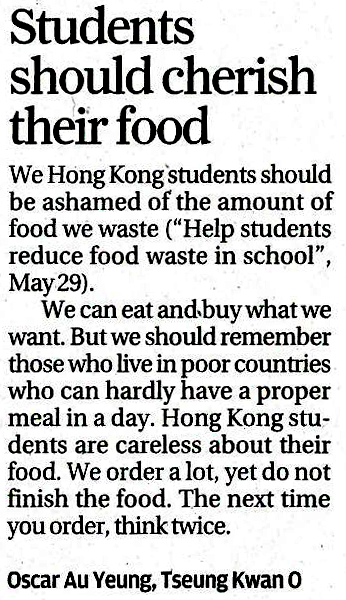
Hebe Ng Yik-huen 4E

Young Post Jun 27, 2016
Lai-Man-ting 1D

SCMP Jun 27, 2016
Samuel Cheng Ka-ho 1D

SCMP Jun 25, 2016
Heidi Leung 3B
Taxpayers will foot the bill for third runway
I refer to the report (“Hong Kong air passengers to pay fee from August to fund third runway as Cathay Pacific welcomes first of Airbus A350s”, May 31).
From the article, I understand that outbound and transit passengers will need to pay HK$180 from August to fund the construction of the airport’s third runway.
However, it is said the third runway would only be used for landings, not for take-offs.
Although the chief executive officer of the Airport Authority said that 70 per cent of the users of the Hong Kong International Airport are not Hong Kong citizens, the costs of the construction apart from the runway may still require funding to be voted on at Legco.
In other words, the construction of the third runway may end up being funded by Hong Kong taxpayers.
Heidi Leung, Tseung Kwan O |
SCMP Jun 23, 2016
Ng Wai-nam 1D

SCMP Jun 22, 2016
Mary Ko 4E
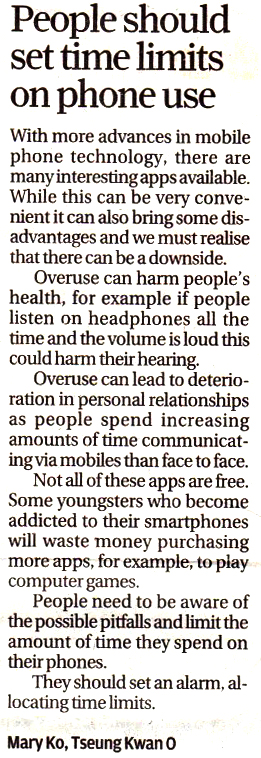
Harry Ng 5A

Young Post Jun 20, 2016
Kameko Kam 1D
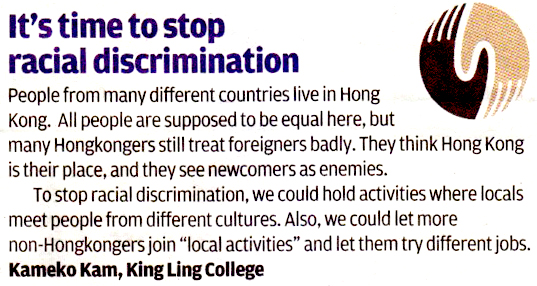
SCMP Jun 18, 2016
Christy Lam 1D
If we overfish the oceans, we will not survive
Overfishing is when the catch exceeds the growth of fish stocks. Fish do not have sufficient numbers to reproduce. Then, the natural resource will gradually be exhausted. Why is there overfishing?
The world’s population increased rapidly from 1950 to 2011. Advancements in fishing technologies and large fleets led to higher efficiency in fishing. Large numbers of fish were caught and the stocks were not allowed to recover.
We must do something to stop overfishing and save our beautiful oceans.
Governments must ban unsustainable fishing practices. Bottom trawling should be outlawed. This would allow fish stocks to recover.
We should set up fishing quotas. We can achieve a balance between environmental conservation and the livelihood of fishermen. Set a total weight of fish allowed to be caught and pass laws to limit fishing times and the number of fishing boats.
Also, governments can set up more marine reserves and marine parks. This would help to sustain biodiversity and coral habitats.
Furthermore, the public should consume only sustainably harvested seafood. We should refuse to consume endangered species.
Besides global warming, the world is facing many problems. One way or another, every living thing on earth needs the oceans. Instead of poisoning and destroying nature, we should be protecting it.
Christy Lam, Sai Kung |
Bobo Man 4A
We should all register as organ donors
The number of patients waiting for organ transplants is rising, but the number of donors is inadequate, especially for kidneys and corneas.
In fact, many people are willing to be organ donors. In my class, more than half the students said they would be willing to donate. It shows that many people are not averse to donating their organs, so education and promotion could really help increase donor numbers.
The government should distribute promotional materials about organ donation. Leaflets could include details of organ donation, including where to get registration forms, what the requirements are to be a donor, why we need more organ donors, and how organ donation can help people in need. These leaflets could be distributed through schools and workplaces.
At school, teachers could devote one or more lessons to educating students about organ donation. This would help to change traditional Chinese thinking. Students can bring this idea home to their parents.
Besides, schools could give out organ donation forms. Of course, schools must remind students that they need to discuss it with their families and get their permission.
You can register to be an organ donor and encourage the people around you to do the same. Donating your organs can help save lives.
Bobo Man, Tseung Kwan O |
SCMP Jun 17, 2016
Suki Lee 3D
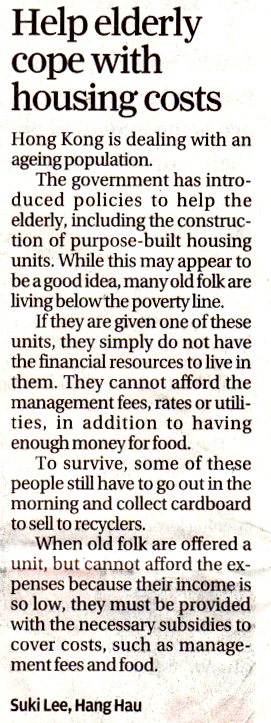
SCMP Jun 15, 2016
Circle Yuen 3D
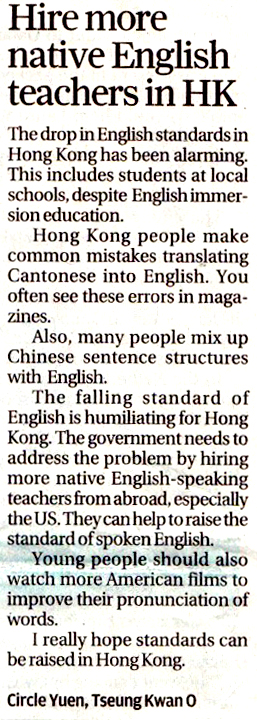
Hebe Ng Yik-huen 4E

SCMP Jun 14, 2016
Jason Luk
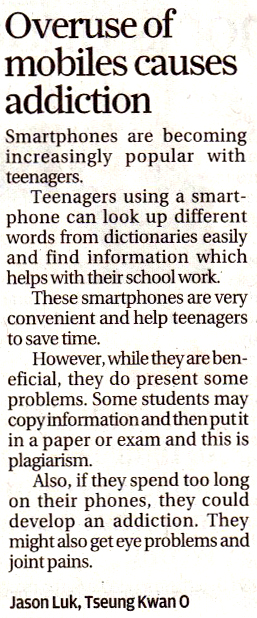
Walter Chong 3B
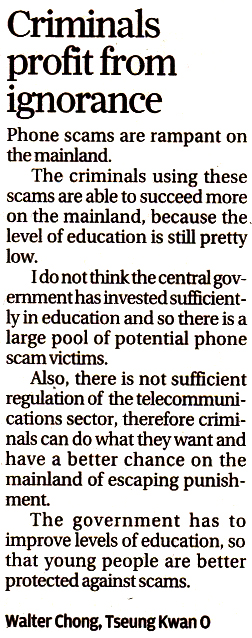
Sabrina Li Wan-hei 5A

Young Post Jun 13, 2016
Lam Ki-wing 1D
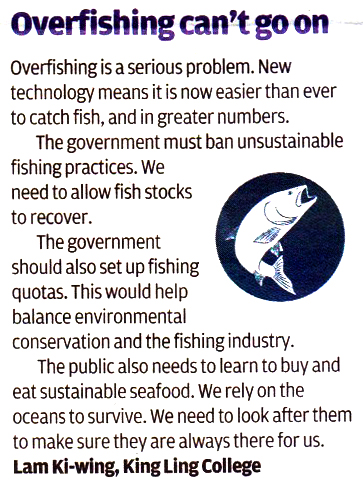
SCMP Jun 11, 2016
Danial Hui 3C
Government must help combat obesity
The number of teenagers who suffer from obesity has been increasing in recent years.
It is a very serious problem which the government should immediately address.
Firstly, obesity causes a lot of health problems. People with weight problems can suffer from various ailments, including heart disease. We can all play our part to try and help those who are very overweight.
Students who are eating propertly, can tell friends who have a weight problem not to eat junk food and oily food which contain a lot of fat. They can ask their friends to join them in some exercise.
Teachers also need to address this problem in the classroom and explain to their students the harm that can be caused by obesity.
Teachers have a responsibility to help students avoid overweight problems and inform them of the ways they can stay healthy. Schools could also hold talks and special lessons for all students to attend to raise awareness of the health hazards associated with obesity.
Moreover, having a longer recess and lunch time is also a great idea to give students a chance to do some exercise. Too long sitting in class compounds the problem.
The government should run some TV, poster or advertising campaigns to lift public awareness of the obesity problem and encourage citizens do more exercise.
A balanced diet avoiding food high in fat is also a basic step we can all take.
Daniel Hui, Hang Hau |
Shirley Lee 4A
Traditional beliefs hamper donor efforts
Stories about organ donations and people waiting for one seldom make the front pages.
However, the shortage of available donors remains a serious problem in many countries. For example, in Hong Kong, the number of donors is far less than the number of patients who are waiting for organs such as livers, kidneys and corneas.
The Hong Kong government is trying to raise interest and encourage citizens to register as organ donors. For instance, people can now register online instead of going in to sign up and celebrities are used in TV commercials to encourage people to join up.
It may be that cultural traditions of keeping a body whole after death have impeded potential donors but if more people realise lives can be saved, then the shortage of organs will be less of a problem.
If parents change their traditional way of thinking, and suggest organ donation is a good thing, the next generation will contribute to saving more lives by giving their organs.
The government wants to have a new policy of organ donation in which all Hongkongers are potential donors unless they explicitly opt out. This new system would increase the number of donors and that would be a great thing.
Shirley Lee, Tseung Kwan O |
SCMP Jun 10, 2016
Carol Mo Ka-wai 4E

Kassandra Wong Hiu-tung 4E
We should not forget sacrifice students made
As a student, I appreciate the spirit shown by the students during the events that were brought to a head on June 4, 1989. They risked arrest and even death, but continued to bravely express their discontent towards the Chinese government. They were persistent in their fight for democracy.
Their actions show us the need to keep criticising the central government over what happened on June 4. But, it is not satisfactory if all we do is criticise. Rather than wasting time just criticising, we need to try to change our world and ensure history does not repeat itself.
Hongkongers need to pay attention to what is happening in our society. Students here should keep fighting to protect the freedoms we enjoy. And we need to reflect on the city’s future.
Looking back on what happened in 1989, I hope that history will not repeat itself.
Kassandra Wong Hiu-tung, Tseung Kwan O |
Bobo Man Siu-ying 4A
Have fun, but also study hard at university
Now that the Diploma of Secondary Education exam is over, many students who worked hard will be looking forward to university.
They and their parents probably have very high expectations of learning a lot, getting a good degree and then starting a promising career.
However, as some correspondents have pointed out, some youngsters have to endure such a gruelling schedule with long hours during their school years that their love of learning has been killed off.
They have worked so hard to get an undergraduate place that now they want to have fun. It is as if they have already achieved their goals, when instead, they should be drawing up a new set of goals as they begin their degree programme.
I remember one of my teachers telling me she saw university as the real starting point in her life. The rote learning at school had ended and now she could learn subjects that really interested her in her own way. It inspired me to want to get to university and study hard.
I urge youngsters about to start their degrees to enjoy themselves and have some fun. But, you should also put a lot of effort into your studies and you will find it a rewarding experience.
Bobo Man Siu-ying, Tseung Kwan O |
SCMP Jun 8, 2016
Amy Hung 3C
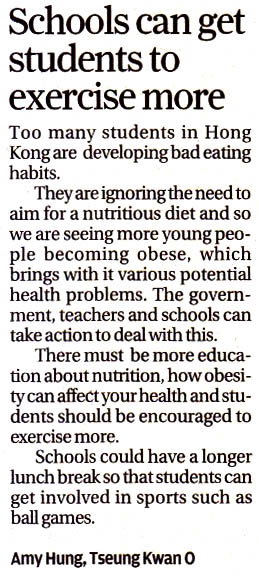
SCMP Jun 7, 2016
Edward Wong 4C

Peter Tam 3B

Hebe Ng Yik-huen 4E

Mary Ko Ching-nga 4E

Yonng Post Jun 6, 2016
Lai Man-ting 1D
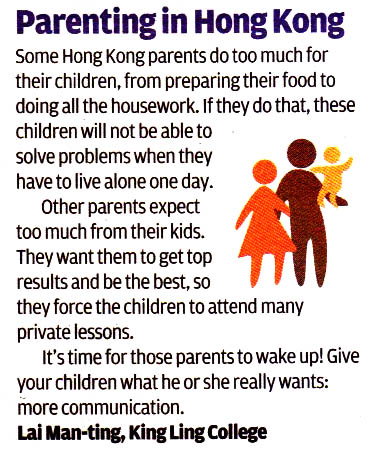
SCMP Jun 6, 2016
Theodore Tam 3B

SCMP Jun 4, 2016
Eddie Wong 4D
Youth athletes struggle to get financial help
I refer to the letter by I. Poon (”Teens are put under a lot of pressure”, May 18).
Many youngsters have dreams for the future which are undermined by Hong Kong’s spoon-fed education system, or they are encouraged to aim for a place at a university.
However, university is not the only path to having a successful career. Youngsters may want to get into fields such as sport and acting which do not require a university degree.
If you have watched matches in different sports between teenagers, performances by them, or have seen examples of their art work, it is obvious that these youngsters are as talented as their counterparts abroad.
I’m sure all readers recall Chief Executive Leung Chung-ying’s comment [which he later clarified] that sport did not contribute to the economy. I am disappointed by the government’s attitude towards sport. Students can get loans or scholarships to study at university, but it is more difficult for a talented young athlete, artist or other kind of performer to get financial help.
Family pressure does not help in Hong Kong, with some parents effectively putting up barriers unless the child wants to study for a degree.
The government should not just focus on academic studies. And parents need to change their attitude and recognise that university is not the only option. I urge youngsters who have dreams that do not include studying for a degree to stick with them.
Eddie Wong, Tseung Kwan O
|
Oscar Au Yeung 3B
Strike balance with your smartphones
Many Hongkongers, but especially teenagers, appear to be inseparable from their smartphones.
They communicate via mobiles and play computer games on them. Some adults say this has a negative effect on the development of children, but I am not convinced this is always the case.
These devices do have advantages for teenagers. They are able to find any information that they need quickly.
The negative aspect comes when teens spend too long playing online games or on social networks like Facebook and Instagram. This wastes their time. They need to learn self-discipline and strike a balance between using smartphones to relax and for their studies.
Oscar Au Yeung, Tseung Kwan O |
Marco Fung Pak-hin 3C
Roof collapse should not happen again
Most Hong Kong citizens know about the roof collapse accident at City University and many would realise it’s not just university students who would be worried – anyone working under a rooftop garden might be concerned.
It is very fortunate that only three students were injured in that accident. Imagine the potential tragedy if 1,000 students had been in the sports centre at the time.
There are not only rooftop gardens at City University but also in some secondary and primary schools. Maybe others won’t be so lucky if another roof collapses, so what should we and the government do to avoid potential disaster?
There is a responsibility for schools to check a structure’s condition at least once a year. But the government appears to do nothing to prevent or solve the problem.
It seems different officials shirk their responsibility and shift the blame on others. This is not the way to protect lives. Officials need to step up with concrete solutions.
Marco Fung Pak-hin, Tseung Kwan O
|
SCMP Jun 3, 2016
Billy Sit 4A

Hillary Chan 4A
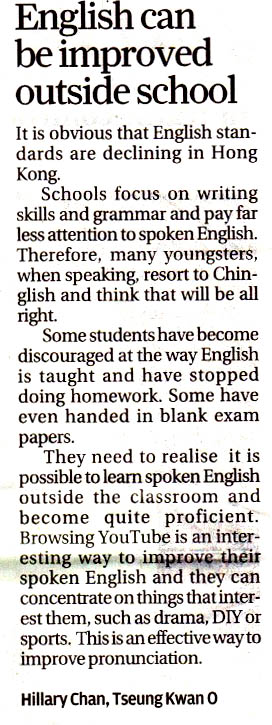
Heidi Cheng 1A
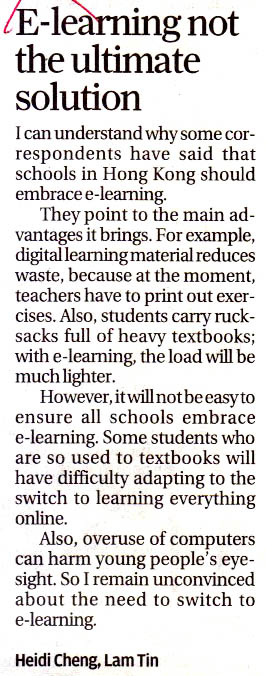
SCMP Jun 2, 2016
Kassandra Wong Hiu-tung 4E

SCMP Jun 1, 2016
Edward Wong 4C
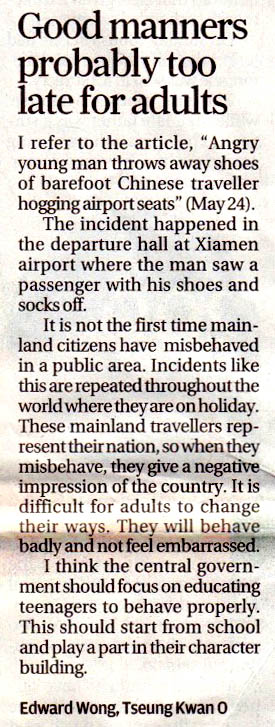
SCMP May 31, 2016
Wong Ho-ming 4C

Anson Lam 1B
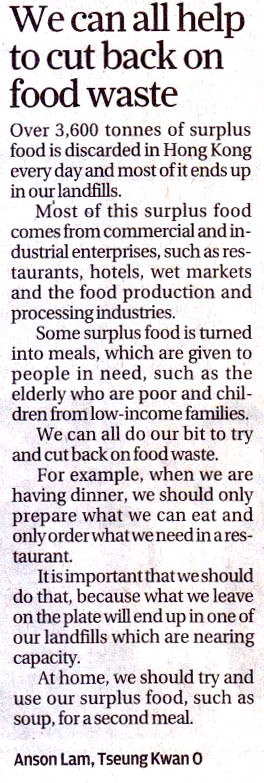
Young Post May 30, 2016
Raymond Lok 5E
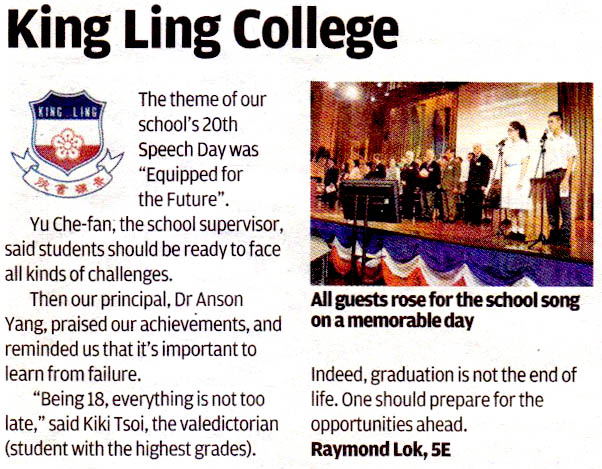
SCMP May 30, 2016
Henry Kim 1D
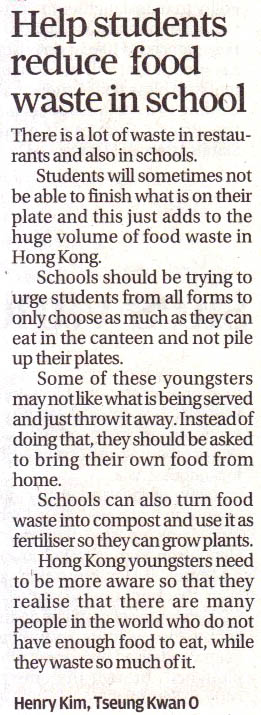
Young Post May 30, 2016
Lau Yee-wing 1D
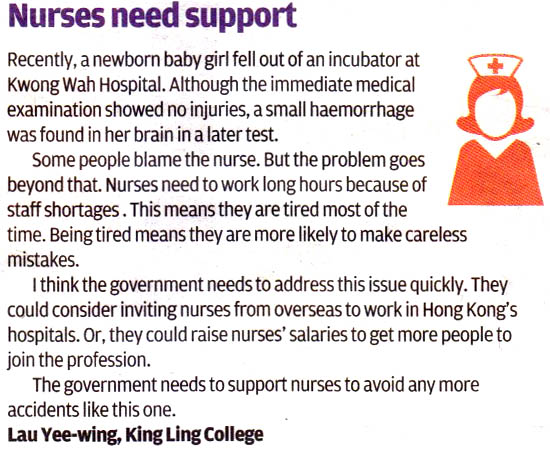
SCMP May 28, 2016
Jocelly Tse 3C
Students need gym time to avoid obesity
I refer to the report (“Younger obesity sufferers seek help”, May 23).
The report mentioned that around 40 per cent of people aged below 30 are obese and weigh as much as 200kg.
Nowadays, students or teenagers don’t do enough exercise, not even little warm-up exercises. They commonly go to school around at around 8am and get back home around 4pm. For around seven hours they are stuck to a classroom chair and will not walk anywhere.
Schools and the government can play a key role in preventing obesity.
They should provide healthy food and build well-equipped gym rooms so that students can avoid the health issues that accompany obesity.
I hope the problem of overweight youths will improve within a few years.
Jocelly Tse, Tseung Kwan O
|
Dickens Mok 4C
Bar set too high to join food truck scheme
I am writing to express my view on the government’s food truck pilot scheme.
Its requirements for applicants are too tough and deny individuals with fewer financial resources from applying to operate a food truck. The government wants food trucks to have a diesel generator, a water tank with a capacity of at least 120 litres and a container to hold at least 180 litres of waste water – regardless of the type of food served. All that would come at an estimated HK$700,000 investment as a start-up cost.
In my opinion, such a requirement sets the threshold too high and harms the interests of people with average means who would want to try to set up a food truck business .
In Hong Kong, food is an integral part of our way of life and is mainly sold by hawkers or small shops which have a long history.
We all know that a HK$700,000 investment is a heavy financial burden for most people and discourages the average citizen from being able to consider participating in the food truck pilot scheme.
Dickens Mok, Tseung Kwan O
|
Angela Chan 4C
Children must be shielded from harmful e-cigarettes
Recently, some children in Sham Shui Po were found smoking electronic cigarettes. According to one of them, there are already hundreds of other children smoking e-cigarettes because they believe that they are harmless and have no nicotine and tar as claimed.
The reason this form of smoking is so popular among children is believed to be the different flavours on offer.
As a result, some children see them as a toy and have their first try of cigarettes.
However, according to the president of the Society of Hospital Pharmacists of Hong Kong, e-cigarettes do contain nicotine and might also have other harmful chemicals.
The nicotine might not only get children addicted to smoking but can also harm their intellectual development. People who smoke e-cigarettes are likely turn to tobacco cigarettes later. The impact of smoking e-cigarettes can be even worse than the tobacco version.
To prevent students from taking up smoking in the first place, the government and parents should adopt a zero-tolerance approach and take firm action to keep all children away from these potentially deadly cigarettes.
The government must regulate the sale of electronic cigarettes. E-cigarettes certainly should not be sold to people below the age of 18.
The import of e-cigarettes also should be controlled so that children cannot buy them through the many online shops that are available.
Discussions and campaigns to educate the public, especially students, should be conducted to inform them about the harmful effects of e-smoking. It doesn’t matter how old a person is, all cigarettes should always be avoided.
Angela Chan, Tseung Kwan O
|
SCMP May 27, 2016
Billy Sit 4A
Angered by disruptive lawmakers
Thanks to filibustering tactics in the Legislative Council chamber, legislation is held up and taxpayers’ money is wasted.
We have lawmakers preventing a quorum at a committee meeting by not turning up. What they are doing is a job like any other and yet they sometimes choose not to do that job.
Then you have even worse behaviour from some legislators throwing objects at senior officials and the chief executive in the chamber. So, if you’re not happy with the chief executive, you throw something at him. If you don’t want a bill passed, you carry out a filibuster.
The pan-democrats who employ these tactics are abusing their power. The voters chose them to represent their views, not to act like clowns.
By their actions, they are undermining the reputation of Hong Kong.
Billy Sit, Tseung Kwan O
|
Katrina Lo 3C
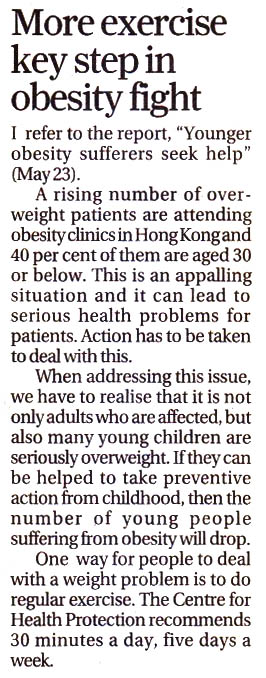
SCMP May 26, 2016
Eric Chan 4D
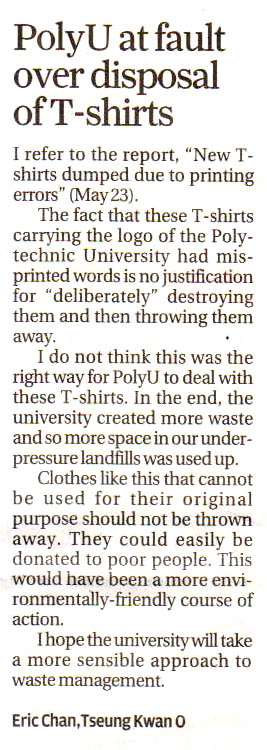
Tutti Sung 3C
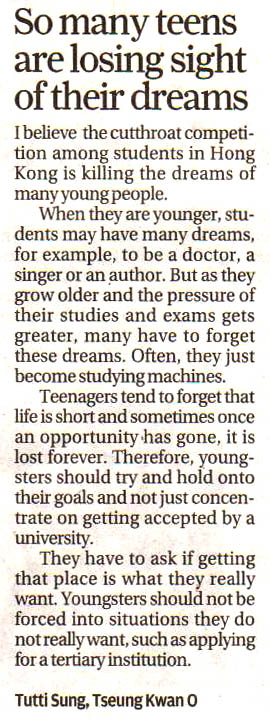
SCMP May 25, 2016
Wong Ho-ming 3C

Liz Chan Wing 3C
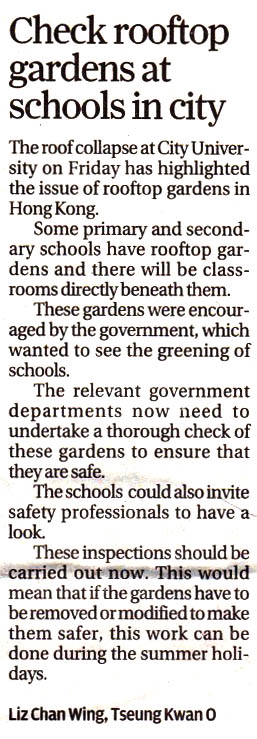
SCMP May 24, 2016
Wong Ho-ming 4C

Jenny Kwok 4C
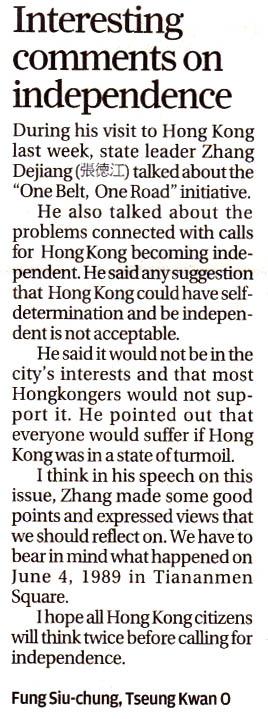
Fung Siu-chung 4A

SCMP May 23, 2016
Mivheal Chow 4A

SCMP May 20, 2016
Phoebe Ko 4C

Yung Chau-yin 3A
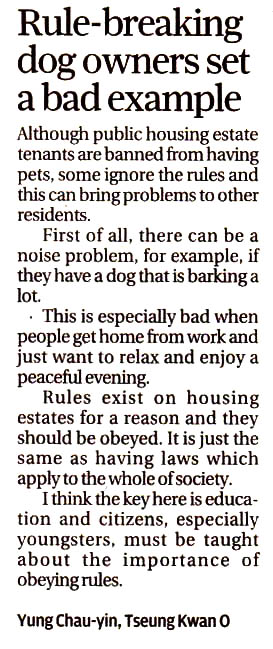
Nicole Wong Yuen-shan 5A
Food waste in landfills harms environment
Hongkongers love their food, but unfortunately it is also a city that is prone to waste a lot of it.
Over 3,200 tonnes of food waste is generated in Hong Kong every day.
The amount produced by the hospitality industry alone has doubled in the last five years. The vast majority of this waste ends up in landfills, and this is leading to the rapid depletion of our already limited landfill space and this has implications for the local environment.
In large cities like Hong Kong, emissions from decomposing food have a serious negative impact on air quality. In addition to producing waste water, as food rots in landfills, it releases methane and carbon dioxide – greenhouse gases that capture and retain heat in the atmosphere.
By reducing the amount of food waste being sent to landfills, we can extend their lifespan and reduce the severe burden on Hong Kong’s environment.
There is a long way to go but plans to extend organic waste treatment facilities and encourage businesses and consumers to participate in food waste reduction and waste separation at source are encouraging signs.
Nicole Wong Yuen-shan, Tseung Kwan O
|
SCMP May 19, 2016
Chantel Cheung 5A

SCMP May 18, 2016
Donald Wong 3A

Young Post May 16, 2016
Lau Yee-wing 1D
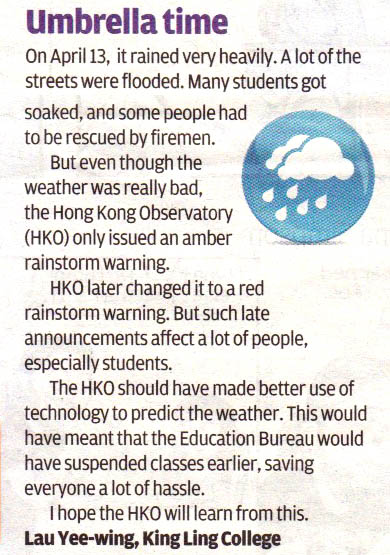
SCMP May 14, 2016
Jasmine Chan 5D
Breastfeeding brings out worst in some
I refer to the picture caption (“Hungry for change”, May 8) showing protesting mothers calling for an end to the discrimination they face when breastfeeding in public. This issue has proved to be controversial in this so called equitable society.
People, especially the government, always promote the idea of being healthy. Then how come there is no law to protect those mighty mothers, who are not afraid to breastfeed in the public? They have to put up with discriminatory gazes.
With the intention of feeding babies in healthy way, these mothers contribute a lot.
They have to wake up during the night, sometimes stop eating their favourite food. According to the World Health Organisation (WHO), the nutrition value of mother’s milk is high, and is more natural, healthy and reliable than formula.
It is ridiculous that when some Hongkongers see mothers breastfeeding in public, they ask them to move to the nearest toilet. Is this really fair? Would these people be willing to eat a meal in a toilet?
Breastfeeding is a normal practice abroad, such as in Europe. Hong Kong as an international financial hub should be protecting these mothers. This is the morally right thing to do.
It is to be hoped that the government legislates to give mothers the right to breastfeed in public in an attempt to raise awareness of the importance of breastfeeding.
Jasmine Chan, Tseung Kwan O
|
Jacky Hui 4E
A long-term plan key to end child abuse
I refer to the letter by Tom Mulvey (“Department has no long-term planning to help at-risk child”, May 8).
Your correspondent mentioned that child abuse was not the main reason why most children are in care.
Those children we need to be in care were not generally abused by their parents, as most people think, but actually the Social Welfare Department “abused” them with derisory and inadequate support. Short-term solutions for ad hoc cases don’t help and only a long-term strategy can alleviate the problem of children in Hong Kong receiving inadequate care.
Hopefully, citizens will become more aware of the problem, whether they are parents or not. It is time to change our thinking for the sake of future generations .
By simply researching online all of us can see that the problem of family violence and the lack of care to children is much more widespread than we expected.
As an example, with a reference to one survey, 31 per cent of primary students have experienced physical or psychological maltreatment which is an astonish percentage and hardly seems possible.
There are many factors affecting the existence and severity of family violence and the neglect of children.
First, many surveys done by different social welfare organisations have proved the parenting that parents received in their childhood and their education level have the most profound effect on whether problems exist. The finding has mapped out a cycle of child care problems in the domain of abuse.
If we want to prevent the problem, we need to change the traditional mindset of “punishment makes children better and more obedient”.
Parents in future must adopt a different approach and be aware of the best methods of parenting to raise mentally and physically healthy children.
The government can ask the Education Bureau to provide some discussions for students and parents and explain the disadvantages of the lack of care to a child. This can help improve the parenting style for the next generation as children are the parents of the future.
Jacky Hui, Tseung Kwan O |
Alexander Leung 1D
Adopting a dog needs careful consideration
I refer to the letter by Bernard Lo (“Adopt a dog instead of buying one”, May 9).
I totally agree with this suggestion and I hope more Hongkongers will come to think this way.
Many people act on impulse when buying a pet which is why so many abandoned dogs and cats have to be put down every month.
Although adopting a pet can save the life of one of these abandoned animals, people need to think carefully before making that decision and ask if they really can take care of them over the long term. They also have to ask if there is enough room in their flat for a dog.
The government should take measures to encourage people to adopt abandoned dogs in Hong Kong.
Dogs are living creatures deserving of our respect.
Alexander Leung, Tseung Kwan O |
SCMP May 13, 2016
Enoch Yeung 1D
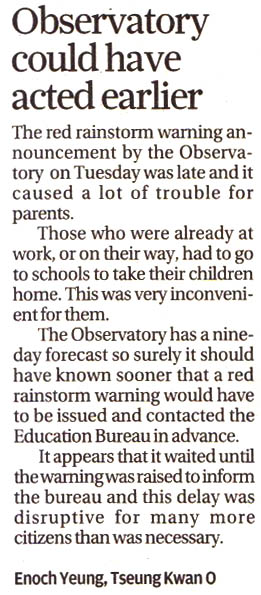
Mary Ko 4E

Shirley Lee 4A
Breastfeeding facilities are inadequate
On Mother’s Day on Sunday, I was thinking about the issue of breastfeeding in Hong Kong.
Sometimes I think we fail to appreciate the effort our mothers make and the difficulties they sometimes face.
This was highlighted by a protest by local mothers at Tai Wai MTR station calling for legislation to end the discrimination they face when breastfeeding in public areas. They are willing to take this stand because they love their children and I do not know why the government does not pass a law.
The lack of breastfeeding facilities is a serious problem in Hong Kong. Often women have no choice but to use a toilet cubicle, which is not suitable. Would an adult want to eat a meal in a toilet? Obviously not, so why should a mother and child be forced to do this?
They have the same rights as anyone else.
The government must ensure that more breastfeeding facilities exist throughout Hong Kong.
Shirley Lee, Tseung Kwan O |
SCMP May 12, 2016
Chloe Hg Sin-yee 1D

Sandy Chan Lap-kiu 4E
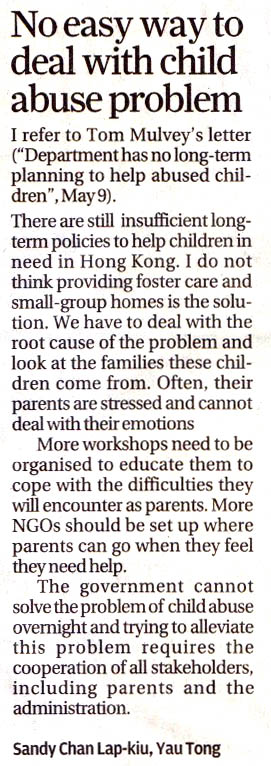
SCMP May 11, 2016
Jojo Wong 1D
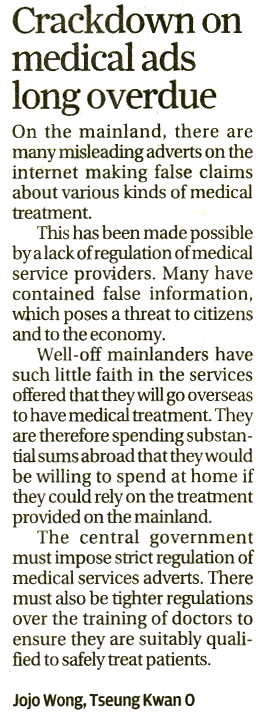
SCMP May 10, 2016
Jacky Leung Kai-kit 3D
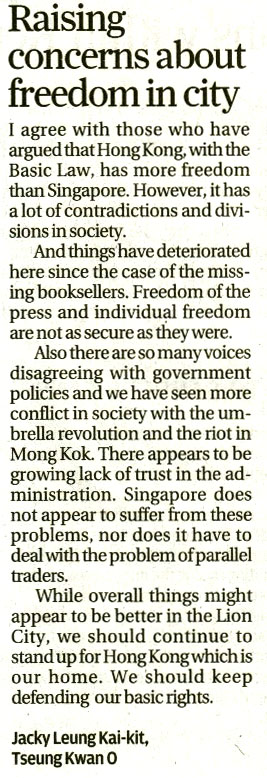
Young Post May 09, 2016
Angela Li 5A

SCMP May 06, 2016
Dennis Fan Ho-kwan 3B
Red rainstorm warning is still necessary
I refer the letter by Lee Kwok-lun, of the Hong Kong Observatory, about heavy rainfall on April 13 (“Red rainstorm warning was not necessary”, April 25). I think the red rainstorm warning was still needed.
Primary students still had to go to school when the amber rainstorm warning was raised. If there was no red level, and the rain was heavy, but not heavy enough to merit the black signal, they still had to go to school.
With the red rainstorm warning, they could have stayed at home.
Young children are vulnerable when they have to be out in a downpour. They could easily fall and hurt themselves.
I think the Observatory needs to consider fine-tuning the system and have a new range of rainstorm warning levels. This is especially important with predictions that with climate change, Hong Kong will experience more rainfall.
Dennis Fan Ho-kwan, Tseung Kwan O |
Cathy Lo 4B

SCMP May 05, 2016
Cathy Yuen Tsz-wai 3D
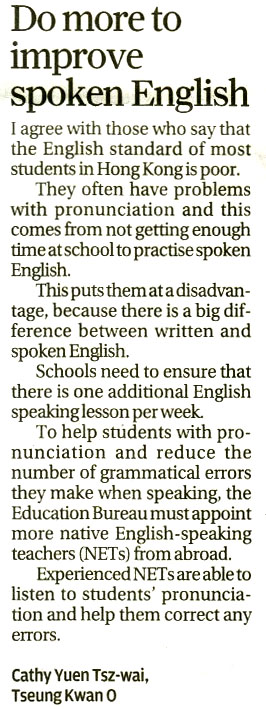
Felix Leung 4E

SCMP May 04, 2016
Bobo Man 4A

SCMP May 01, 2016
Harry Ng 5A
EU was right to point out HK missteps
I strongly agree with the European Union’s assessment of Hong Kong’s situation (“EU issues scathing annual report attacking Beijing on Hong Kong missing booksellers case and stalling of electoral reform”, April 25).
What happened to the five booksellers sent Hong Kong citizens into a panic. We were outraged that mainland law enforcement officers appeared to have crossed the line and undermined the “one country, two systems” principle.
This was not the only incident to stir public anger, either. The spreading use of simplified Chinese characters has also caused many to question Beijing’s intentions. It is enshrined in the Basic Law that Hong Kong will have a high degree of autonomy and adopt a different political and economic system than the mainland. But these recent incidents have hurt Hong Kong people’s relations with the mainland, and their trust in both the Hong Kong and central governments.
If, by promoting the use of simplified Chinese, the central government had expected a surge in national recognition and a decline in support for the localists’ cause, it would be disappointed.
Hong Kong citizens should open their eyes to what the government is doing and how it is determining our future after 2047. If we remain politically apathetic, our future will be bleak.
Harry Ng, Tseung Kwan O |
Roslin Law 4E
Loss of time and money isn’t justified
In the wake of unhappiness about the Observatory’s failure to issue a red rainstorm signal on a morning of heavy rain, I wonder: is it really necessary to issue red rainstorm signals? Such a signal makes many workers and students happy as this gives us a free day. However, we should not ignore the resultant economic losses or negative impact.
Sometimes, if the situation isn’t really serious, such a signal could cause unnecessary panic.
In the past, the Observatory had issued several such signals. However, in some cases, the rainstorm lasted only a few hours, and the rest of the day was fine. As a student, I was happy to skip class. But I wonder if it was really necessary, when weighed against the time and money lost.
Roslin Law, Tseung Kwan O |
Mary Ko 4E
Our officials need their own weather vane
I refer to the letter by Lee Kwok-lun (“Red rainstorm warning was not necessary”, April 24), regarding the heavy rain on the morning of April 13.
After the rainstorm, many people complained that the Observatory should have issued a red warning signal. Many said the heavy rain caused them to be late for school or work, and some even got sick.
To be fair, the Observatory is only in charge of providing meteorological and geophysical services to different parties. It has no say in suspending work or school. The Education Bureau, by contrast, has the power to decide if there is a need to suspend classes, regardless of the Observatory warning signals.
In the beginning of this year, for example, the bureau took the initiative to suspend classes for kindergartens, primary schools and special needs schools on a day of extreme cold.
The bureau should further improve its responsiveness to weather events. To start with, it should have different arrangements for different districts, since rainfall is unevenly distributed. Some places like the New Territories often have higher rainfall when compared with other districts.
The Education Bureau should use its own judgment instead of just relying on warning signals issued by the Observatory. If bureau officers tried to see from the perspectives of the people, they would be able to respond better to their needs. This will help reduce complaints and conflicts between the people and the government.
Mary Ko, Tseung Kwan O |
SCMP April 30, 2016
Alice Ma 3C
Little to show for our focus on homework
I watched a programme on ViuTV in early April which showed what happened when Primary Four students from Hong Kong, Finland and Shanghai exchanged their maths homework and tried to complete it.
We found that the Hong Kong student knew how to do the maths homework from Finland, but did not know how to do the homework from Shanghai. Meanwhile, the Shanghai student said he was not sure how to answer the questions found in the exercise. The Finnish student took just 10 minutes to complete the homework.
The programme found that in Finland, students do not have homework and just do their exercises during lessons. They spend more time playing rather than doing revision or focusing on academic work, yet they have the best results in Europe.
Despite Hong Kong students’ focus on academic exercises, they are not the best in Asia. Maybe we should follow Finland’s example.
Alice Ma, Tseung Kwan O |
SCMP April 29, 2016
Christine Chow 5A
Past events key to a healthier political future
The article, “Hong Kong theatre group dedicated to Tiananmen crackdown concerned by dwindling interest from schools” (April 17), raises fears that we in Hong Kong are downplaying the importance of history and political education.
Already, terms like “June 4”, “Tiananmen” and “tankman” are blocked by the internet censors in mainland China. For a long time now, the Chinese government has tried to limit mainland residents’ political knowledge. Its control seems to be extending to Hong Kong.
The theatre group Stage64, which is dedicated to the retelling of the June 4 crackdown, said it has received many cancellations this year. They are worried schools are under pressure to ignore this historical event.
Yet, a knowledge of history is invaluable for the growth of the community. To learn from the past, we must analyse the mistakes made and avoid them. Blocking information may enable society to maintain harmony in the short term, but the community as a whole will never improve.
A strong grounding in political education will foster diversity and critical thinking.
Christine Chow, Tseung Kwan O |
Chloe Chow 4E
Don’t blame Observatory on rain alert
I agree with Lee Kwok-lun that the Observatory was right in not issuing a red rainstorm warning on the morning of April 13 (“Red rainstorm warning was not necessary”, April 24)
The Observatory is not the one to decide whether school should be suspended; that is up to the Education Bureau. The Observatory can only be responsible for its observations of our environment. On April 13, since it recorded less than 50mm of rainfall in an hour, there was no grounds to raise the amber alert to red. This was the right decision based on facts.
Of course, with so many weather reports, the Observatory may sometimes make mistakes, but it still tries its best to make the most accurate weather predictions.
The heavy rain that day made travelling to school difficult for many students. By the time they got to school, many children – and teachers – already looked exhausted. So why didn’t the Education Bureau suspend classes that day?
Chloe Chow, Tseung Kwan O |
SCMP April 28, 2016
Rainie Yuen 5A
Back up the green talk with some action
Reading about the overuse of air conditioners in Hong Kong makes me wonder how many people really care about the environment.
Although it seems that more and more people participate in global environmental activities, I find many people only “talk” about being environmentally friendly without actually taking action. For example, whenever Earth Hour looms, many people encourage others to join. However, how many of those people actually switch off the lights in their daily life?
Rainie Yuen, Tseung Kwan O |
Susanna Leung Tsz Shan 4D
Show some respect to all workers
One day, when passing by a construction site, I overheard a mother tell her daughter: “If you want to have a better life when you grow up, you must work hard and enter university. If not, you will be just like the people who work in the construction site.”
In our world, jobs are placed at different levels. All parents seemingly want their children to be either a doctor or a lawyer. By contrast, bus drivers, construction workers and other manual labourers are looked down upon. I do not think it’s right. People who do such jobs deserve respect because they are the foundation of our society. Without them, we cannot take buses and we do not have houses to live in. We should respect and thank these silent heroes.
Susanna Leung Tsz Shan, Tseung Kwan O |
Chris Chan 5E
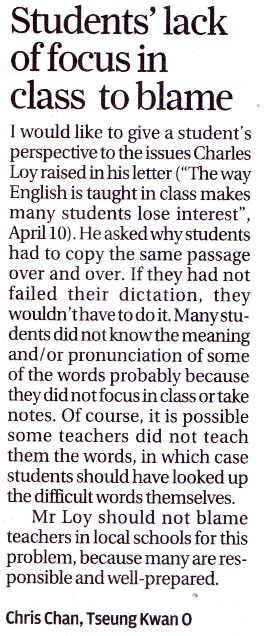
SCMP April 22, 2016
Chan Hei-yin 3C

Alex Lam 4E

SCMP April 19, 2016
Kelda Ng 5E

Raymond Lok 5E

Philip Leung 5E
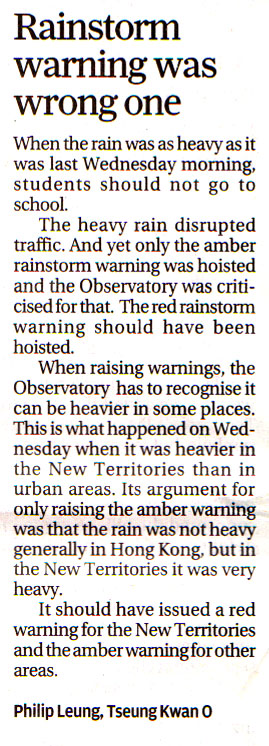
SCMP April 18, 2016
Anson Lam 1B

SCMP April 17, 2016
Carol Mo Ka-wai 4E
National Party needs basic reality check
I refer to the report (“Hong Kong National Party is born: will push for independence, will not recognise the Basic Law”, March 28).
I do not think it will be an appropriate practice for the newly founded group, Hong Kong National Party, to not recognise the Basic Law.
The Basic Law is generally regarded as the mini constitution of Hong Kong and it protects many of the core values of the society. The administration was established and developed based on the law.
If there are citizens who no longer recognise it, the law could lose its authority in protecting citizens’ rights and regulating their behaviour.
I agree with some politicians that the new group may not be able to sustain and achieve its ultimate goals. It can undoubtedly gain support from citizens calling for independence of Hong Kong, yet there may be more people who wish for a steady life.
In reality, I am afraid that Hong Kong does not have the ability to be fully independent.
There should be other priorities than fighting for independence.
Carol Mo Ka-wai, Tseung Kwan O |
Cathy Yuen Tsz-wai 3D
Respect the role of women at home
I think undervaluing domestic work is a kind of gender discrimination.
It cannot be doubted that for most men, going out to work is hard but for women staying at home, doing housework is definitely a job which should not be underestimated.
Many women, in fact, are more than capable of doing many jobs other than being a domestic worker but they give up those career opportunities just to look after their children. It is not about whether women have the ability to do jobs outside or not, but whether they choose to stay at home.
Another controversial topic is whether running a household should be viewed as “non-work”.
I totally disagree with this description since women have to do a series of tasks, like cleaning, cooking and even repairing. While the man of the house is away in an office, driving a truck, or on a job site, it is often left to the woman to repair, maintain and keep things working at home
In my point of view, everyone should respect all jobs in Hong Kong, including being a housewife, since for all of us meeting our daily responsibilities is not easy.
Many netizens believe that men are always the most capable in the family and women should only stay at home. There can be no doubt women make invaluable contributions to home life and the economy.
Cathy Yuen Tsz-wai, Tseung Kwan O |
SCMP April 15, 2016
Rex Lee Tsz-chung 4D
Reading books far better than drilling in class
I refer to the letter by after-school tutor Charles Loy (“The way English is taught in class makes students lose interest”, April 11).
Local schools in Hong Kong are not teaching students English language, but English exam skills.
Schools become oriented towards public exams so that students can get good grades. So they start drilling with a lot of worksheets and past exam papers. It has to be asked if this is the right way to learn a foreign language.
In Hong Kong, many youngsters are keen to learn Korean, because they like Korean dramas and K-pop.
Because they are interested in the language, they are motivated to learn it and really make an effort.
If there are students studying English who do not relish learning the language, I do not think drilling will be effective.
Teachers need to cultivate the interest of students and, as a first step, encourage them to read a book in English.
Their purpose should be to try and nurture an enjoyment of reading. The more they read, the more they will learn and they can do so without any drilling.
Students in local schools have squandered enough time on these drilling exercises.
Rex Lee Tsz-chung, Tsueng Kwan O |
Walter Chong 3B

Joey Chan Yuen-yi 4D

Young Post April 15, 2016
Timophy Pit Hok-yan 5D
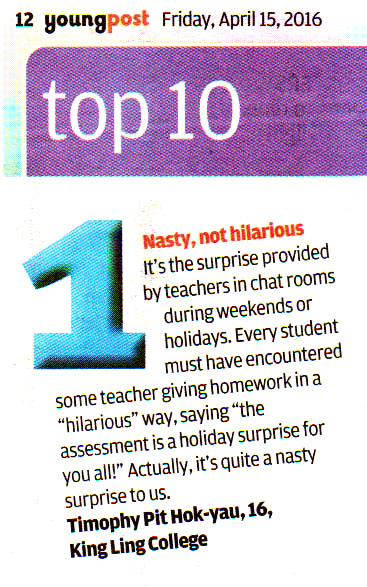
SCMP April 14, 2016
Vanessa Tang 4A

Kenny Tong 3D
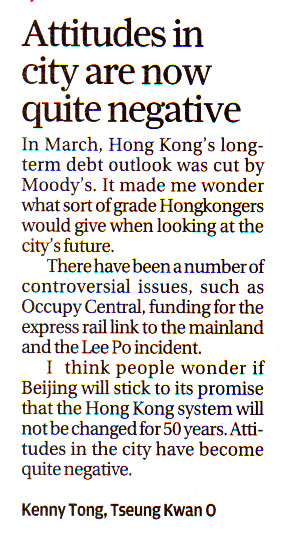
SCMP April 13, 2016
Louis Fung Lam-lap 3B

Billy Sit 4A

SCMP April 12, 2016
Jackson Lau 3A

Vanessa Tang 4A

Young Post April 11, 2016
Amy Ng Cheuk-ka 1B

SCMP April 11, 2016
Samuel Cheng Ka-ho 3B

SCMP April 8, 2016
Chole Chan 5D

SCMP April 6, 2016
Anson Sin 4E

SCMP April 5, 2016
Katrina Lo 3C

Ronnie Tse 4C

SCMP April 3, 2016
Roslin Law 4E
Blanket ban of e-cigarettes not a good idea
I refer to the report (“E-cigarette body tells Hong Kong officials to regulate industry, not ban its products”, March 30).
I agree with the Asian Vape Association that the government should not ban e-cigarettes and that a total ban would not help to protect public health. I have no doubt that e-cigarettes contain a variety of harmful substances, but also am sure they are less dangerous than conventional cigarettes.
Therefore, if you are going to ban e-cigarettes on health grounds and conventional cigarettes pose an even greater health risk then surely you would have to ban them as well.
A blanket ban on e-cigarettes would be totally unreasonable. It would simply lead to the growth of a profitable black market to meet the demand and it will be relatively easy to smuggle them.
I agree that teenagers should not take these e-cigarettes, because of the potential harm they could do. I think the best policy is for the government to regulate the e-cigarette sector.
Many shops sell them already from sources which have not been checked. A regulatory system could be introduced to monitor products that are imported.
E-cigarettes can do some good. A study has shown that they can help people give up conventional cigarettes and so that is another good reason for not banning them.
Roslin Law, Tseung Kwan O |
Natalli Lo 4A
Traditional stores in city are dying out
It saddens me that traditional stores in Hong Kong appear to be dying out, replaced by large chain stores.
These small shops have been hit in recent by skyrocketing rents, but when they go something precious is lost and I believe some way should be found to protect them.
They are part of our collective memory from our childhood. We can remember going to these shops to buy snacks and sweets unique to Hong Kong. They have all but disappeared.
Surely there is something that can be done to make sure they survive.
Natalli Lo, Tseung Kwan O |
SCMP April 2, 2016
Chan Hei-yin 3C
Athletes in city get very little assistance
I would like to see more initiatives which encourage greater development of sport in Hong Kong.
Young people who show talent as athletes face an uphill struggle in the city. They have a tough time getting sponsorship and subsidies and may not be able to earn a decent salary if they go professional, even if they show a great deal of potential.
They will often have to do other jobs to supplement their incomes and this can eat into the time they need to train. Some give up and that is why Hong Kong does not have a very good record when it comes to winning medals in international sporting events, including the Olympics.
However, it is not just about young athletes. Many citizens do not appreciate the health benefits of getting involved in sporting activities. Too often they consider their priority is to make money and so they say they have no time to exercise.
The government should put more resources into developing sport and getting more citizens involved.
Chan Hei-yin, Tseung Kwan O |
Joey Chan Yuen-yi 4D
Housing needs imaginative strategy
I am writing to express my deep concern over the shortage of land in Hong Kong.
These days, the chief executive and government officials seem only to focus on the propaganda of political reform and attacks on opposition parties. The high property prices, long waiting list for public housing, a third runway, all seem to be pushed aside into a too-hard basket.
The most pressing social problem is housing, which is a ticking time bomb.
Hong Kong is densely populated and building public housing is not a long-term measure to alleviate the housing shortage, since the government has already done it for a long time. Every year, the problem gets worse.
Without a shadow of doubt, developing an underground city is an excellent idea. Not only can it increase the capacity of Hong Kong, but can also increase efficiency of land use.
The lifestyles of citizens are changing at a fast pace The requirement for a decent quality of life is also much higher than in the past. Therefore, it is necessary for the government to study how to improve our city in order to meet the needs of the community and achieve a more liveable environment.
Joey Chan Yuen-yi, Tseung Kwan O |
SCMP April 1, 2016
Chloe Chan 5D

SCMP March 31, 2016
Louis Fung Lam-lap 3B
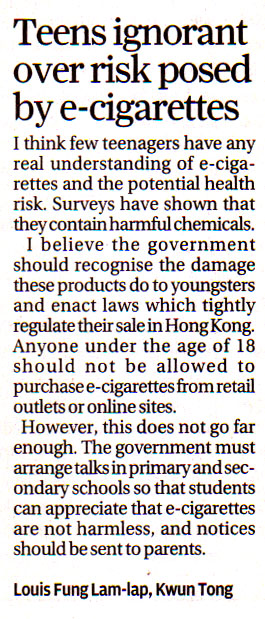
SCMP March 29, 2016
Wong Hiu-yan 3C
More must be done to relieve congestion
Earlier this month Harrow International School said it would try to reduce traffic outside the school which is causing congestion in Tuen Mun.
As an international school most children come from families on fairly high incomes and so they are often taken there and picked up in private cars. However, even before the school opened the roads in this part of Hong Kong had always been busy and some of them are in a poor condition.
After the school opened there was a lot of extra traffic at certain times of the day which has meant congestion is now a big problem.
I can appreciate that it is more convenient for students to come by car rather than public transport, especially if they are carrying a lot of textbooks, sporting equipment or maybe a musical instrument.
However, they should try wherever possible to use public transport and so reduce congestion.
Students living near the school should walk as the exercise will do them good.
The school should also look at how it can make modifications to its bus service so that more pupils use it.
Wong Hiu-yan, Tseung Kwan O |
SCMP March 27, 2016
James Wong 3C
Apply law safeguards to e-cigarettes
I refer to the letter by Borromeo Li Ka-kit (“Stringent rules on sale of e-cigarettes needed to protect youngsters”, March 7).
I agree that laws should be established quickly to stop adolescents from using e-cigarettes before it becomes a trend in Hong Kong.
I have no doubt that e-cigarettes are damaging to people’s health, with numerous research papers supporting this point of view.
Many users still insist that e-cigarettes are “safer” than tobacco, but it doesn’t change the fact that e-cigarettes are harmful to their health.
Worse is that there aren’t any age limits when buying e-cigarettes; in other words, it is technically not illegal for those under 18 to buy e-cigarettes.
All anti-smoking legislation in Hong Kong should also apply to e-cigarettes.
James Wong, Tseung Kwan O |
Andy Yeung 3C
Having more universities is not the answer
I refer to the letter by Walter Chong (“Not enough places at local universities”, March 7).
Your correspondent said that many youngsters who failed to get a place at a local university chose to study for associate degrees and ended up with certificates which were “fairly useless”.
I understand the argument in favour of having more universities, and therefore offering additional undergraduate places, but every coin has two sides.
With many more graduates, a degree would be devalued, for example, in the eyes of prospective employers, because they would think it is now much easier to get into a university.
A university degree would end up having the value of today’s associate degrees.
Not all youngsters can get to a university. We need a balanced workforce, so that some people can do the jobs that do not require a degree.
Universities should be aiming only to recruit the elite academically, that is, those who did well in the Diploma of Secondary Education (DSE) exam.
Building more universities would be a waste of money. Those youngsters who are now calling for more universities should instead be concentrating on doing well in the DSE exam so they can get one of the coveted places at a local university.
Andy Yeung, Tiu Keng Leng |
SCMP March 24, 2016
Priscilla Ko Ka-ying 4B
Less pressure, not cash, will help students
I refer to the report, “What’s the value of Hongkongers’ lives? Education chief gets earful over HK$5,000 payout per school to fight student suicides” (March 21). Officials seem to believe that giving money to government subsidised schools can help to deal with the spate of student suicides.
I believe those young people who took their own lives did so because they felt incredible pressure caused by their academic studies. It seems that this pressure is getting more intense for primary and secondary students. Many are forced to do homework until late at night for tests like the Territory-wide System Assessment.
Given that pressure, one has to ask if HK$5,000 for every school can actually make a difference and get to the root of the problem. It will not lead to a reduced workload or fewer exams and tests. Nor will it result in students enjoying more much-needed leisure time.
And it will not lead Hong Kong’s “monster parents” to lower their high expectations of their children. Therefore, I consider this injection of cash to be meaningless.
The aim of the money is for schools to “organise activities and talks that instil positive messages”. However, students are already encouraged to believe things like “Life is priceless” and “Nothing is unachievable” on a daily basis. If these upbeat messages could make a difference, we would not already have such a high suicide rate.
This sum is not even enough for a school to hire another social worker to help students deal with their psychological problems.
The Education Bureau needs to try to come up with more effective schemes to deal with this tragic situation.
Priscilla Ko Ka-ying, Tseung Kwan O |
Hebe Ng Yik-huen 4E
Unity is vital in the fight against terror
The bombings in Brussels which left 31 people dead were the latest terrorist attacks, which are happening all over the world.
If we go back as far as the attacks on the World Trade Centre on September 11, 2011, we can see that these attacks have one thing in common – and that is the heavy toll in terms of deaths and serious injuries.
However, not only are precious lives lost, but these attacks can hurt the economy of the country or city that is targeted. And then there is the psychological trauma suffered by those who survived, and have to try to rebuild their lives.
This is a beautiful global village, and yet so many people are victims of terrorism. However, we must remind ourselves that as it is a global village, we should stay united against these intolerable acts.
People should show their solidarity and determination against terrorism on social networking sites. This will encourage more people to express their support for the global fight against these terrorists.
Governments around the world must step up their fight against such attacks. They need to be more effective in preventing them.
A country on its own cannot curb these people, but we can prevail if we stay united.
Immediately after an atrocity, there are outpourings of grief and sympathy and then people begin to forget. However, we must keep reminding ourselves that there is no room for complacency.
Hebe Ng Yik-huen, Tseung Kwan O |
Wong Ka-lam 4D
Illegal dump site needs urgent action
I refer to the report, “Heap of trouble: residents protest at lack of action over illegal and ‘unstable’ earth mound in Hong Kong’s Tin Shui Wai” (March 15).
The fate of the massive mound in Tin Shui Wai remains unresolved. At least eight activists and a lawmaker were arrested over a dramatic protest on Sunday when they entered the site of the illegal waste hill and tried to shovel earth into bags to take to government offices.
This was the second protest by this group, the Land Justice League, over the weekend. On Saturday, they entered the construction site of the controversial high-speed rail link in Austin to call for work to be halted.
Their anger about what has happened in Tin Shui Wai is shared by local residents. They are frustrated by the sluggish reaction of the government, which is failing to tackle this act of illegal dumping that has created a four-storey-high mound covering an area the size of two football pitches.
What has happened in Tin Shui Wai is not an isolated incident. Across Hong Kong, many cases of illegal dumping are unresolved. If the government keeps ignoring this, residents will lose their patience. They will not continue to allow their environment to be destroyed. The government has a responsibility to protect our environment.
If it fails to do this, citizens will lose their trust in the administration and we will see more protests. Also, I fear that some of these demonstrations could turn violent.
Wong Ka-lam, Kwun Tong |
SCMP March 23, 2016
Jason Luk 3B
Leave precious natural havens untouched
I am against proposals to build homes in country parks.
They are important places for Hongkongers to relieve stress, a precious natural resource where people can go for activities such as hiking. Also, the country parks are mostly in hilly areas of Hong Kong and it would be logistically difficult to build apartment blocks.
We need to solve the housing shortage, but a better solution would be to dismantle older buildings in the city and replace them with new high-rises.
Jason Luk, Tseung Kwan O |
Angela Wong 4C
More frontline public hospital nurses needed
I refer to the report “Overworked nurses appeal for more help in flu fight” (March 17).
The government has to introduce emergency measures to deal with this problem at public hospitals as soon as possible.
It must ensure the pressure is relieved for these nurses and that the hospitals are able to provide a quality service. It should arrange for regular counselling to be made available to nurses who need it.
It makes no sense for the Hospital Authority to add more beds but not more manpower. Nurses are so disappointed with what has happened and this will create a viscous circle.
It is also important for Hong Kong citizens to act responsibly. It is wrong for people to abuse the ambulance service and we should not call for an ambulance unless it is absolutely necessary. For non-urgent cases patients should go to their nearest clinic to see a doctor.
I do not think paying nurses overtime is the solution. Instead the government should be trying to recruit more frontline nurses to deal with the flu crisis. Public hospital nurses would rather have more helping hands than overtime pay.
I hope that with the cooperatin of citizens and the government, there will be some relief for our overworked nurses.
Angela Wong, Lam Tin |
SCMP March 22, 2016
Fok Pui-yi 4E
No-suicide pledge is not the answer
I refer to the letter by Christy Lee (“Overprotective approach bad for students”, March 21).
I agree that the exam system in Hong Kong places a lot of pressure on students and their parents.
Parents want their sons and daughters to do well in exams so that they can have lucrative careers, but the pressure to succeed can be difficult to cope with, especially if the parents’ expectations are too high.
Changes are required and the government needs to make parents realise that it is important to find the right balance for students, so that they can have realistic goals.
There is also a tendency in some families in Hong Kong for children to be spoiled.
Taking an overprotective approach is not good or youngsters can become too dependent on their parents. It is better to give them the right kind of encouragement and if they do not do well in exams, there is no point in making them feel they are failures.
With the recent spate of student suicides, the government has introduced new measures to help youngsters. I think one of them, a no-suicide pledge, will not help to reduce the problem.
Officials should be trying to get to the root of the problem, rather than asking students to sign a pledge. They need to look into how the education system can be improved and what areas are in need of reform.
I would also like to see another university being built, so there are more undergraduate places available.
There has to be better counselling for students and their families where they can feel free to express their concerns.
The present education system is flawed and tries to force students to become machines. They must be taught life skills so they can deal with any emotional problems they have.
I fear for Hong Kong’s future unless this problem is addressed.
Fok Pui-yi, Tseung Kwan O |
SCMP March 19, 2016
Felix Leung 4E
City’s bright lights a curse for many
I (“Science sheds light on sleep disturbances”, March 7).
Studies show that the city’s urban night sky is around 1,000 times brighter than international norms.
Other rural areas in Hong Kong are also badly affected.
The problem of severe light pollution in Hong Kong can be broken down into two main causes: private and public.
The former may include using lights for increased safety and security or switching on your smartphone before getting into bed. The most obvious public cause is large, glaring advertising signs.
The adverse effect of the thousands of bright neon signs in our streets is undeniable. With no escape from the strong light all around, nearby residents are more likely to report fatigue than those with low light exposure.
With impaired functioning from lack of sleep, they are more likely to wake up confused during the night than people with low light exposure.
Unbalanced living habits may develop and the nightly disturbances may result in lower productivity and job performance the next day.
They are simply not able to maintain a healthy lifestyle and as a consequence can fall ill.
The government should take action to curb light pollution.
There should be tighter regulations regarding lighting on advertising billboards in the city, or the problem will just get worse and the health of Hongkongers will suffer.
Felix Leung, Tseung Kwan O |
Amy Hung 3C
School bus can help fix traffic chaos
I refer to the report (“Harrow bids to cut school traffic”, March 7) about Harrow International School in Tuen Mun.
The traffic jam issue in Tuen Mun has become serious and not only the government but also the schools there need to step in to solve it before it gets even worse.
I agree that the schools in Tuen Mun should limit the number of car permits and students should take school buses each day.
Taking the bus is a way for students to become more independent and it would free their parents from driving them every morning.
Apart from this, brisk walking to school can strengthen the heart-lung function of students. And besides, those who go to school by bus will become more sociable because they can chat with each other .
Amy Hung, Tseung Kwan O |
SCMP March 18, 2016
Mario Man Yuk-kin 4A
Officials must make changes in schools
I refer to the report , “Students at breaking point: Hong Kong announces emergency measures after 22 suicides since the start of the academic year” (March 12).
The government must address this issue as students are under a great deal of pressure to do well academically. Teachers and parents be more alert and look for signs of abnormal behaviour showing that youngsters are in need of help.
The Education Bureau also must look at how it can scale back its exam schedule. Doing well in exams is so important to students. They face a lot of tests and exams, and, for some, the pressure can become unbearable. The bureau should see what modifications can be made to try and reduce the levels of stress.
I agree with Professor Paul Yip Siu-fai, who heads the University of Hong Kong’s centre of suicide research and prevention, that many students “live in a virtual world, and in the real world they have nobody to talk to as parents are often busy”.
As parents often go to work early and do not get back home until the evening, they sometimes do not have time to chat with teenage sons and daughters. Youngsters end up spending inordinate amounts of time on their mobile phones.
This is a problem that cannot be ignored. One of the young people who died was only 11. If the bureau fails to take the necessary remedial measures, I am afraid we will see more suicides.
Mario Man Yuk-kin, Tseung Kwan O |
SCMP March 16, 2016
Hebe Ng Yik-huen 4E
We can curb light pollution after midnight
I refer to the article (“Science sheds light on sleep disturbances”, March 7).
In densely populated Hong Kong, there is a wide variety of lighting, including lamp posts, neon signs and advertising billboards, especially in urban areas. When it is very bright it can have an adverse effect on humans and some animals.
As your report pointed out, studies have shown that areas where there are intense lights can disrupt some residents’ sleep patterns.
As a student with a heavy workload, I am aware how you feel the next day if you have not been able to get enough sleep. Getting a good night’s sleep enhances learning and problem-solving skills and makes it easier for you to pay attention to the tasks you have to perform.
Also, nocturnally migrating birds can be disoriented by bright lights at night.
In addition to the health issues, light pollution is a waste of energy.
Action needs to be taken to alleviate this problem.
Late at night there are only a few people on our streets.
Companies could easily turn off their neon signs and advertising hoardings after midnight. And at home we should be trying to save energy by switching off lights when we do not need them.
Hebe Ng Yik-huen, Tseung Kwan O |
SCMP March 15, 2016
Samuel Cheng Ka-ho 3B

SCMP March 14, 2016
Eric Chan 3C

Coco Chow 3C

SCMP March 12, 2016
Kassandra Wong Hiu-tung 4E
Mainlander tourists must be lured back
I refer to the article by Ken Chu (“Warmer welcome”, February 29).
There is no doubt a growing number of mainland tourists are visiting other places such as Bangkok, Seoul and Tokyo instead of Hong Kong.
Occupy Central and the riot in Mong Kok last month have affected mainland tourists’ view towards Hong Kong. Besides, the antagonism of some Hongkongers’ towards the mainland is also a major reason other destinations are being favoured.
Compared to other places, Hong Kong is certainly worth a visit. Hong Kong Disneyland and Ocean Park are suitable for families.
With so many large shopping malls, mainlanders can buy their souvenirs easily. Besides visiting a modern city, mainland tourists can travel to the New Territories for the greenery of country parks or relax on a beach.
Tourism is an important contributor to the economy and is one of Hong Kong’s economic pillars. Any significant drop in tourist numbers will have a major impact on our economy.
Falling numbers means shops lose valuable income so it’s important to increase tourist traffic into Hong Kong.
In the short term, Hong Kong should develop some new destinations which can provide a convenient and exciting experience to tourists.
Not only would these attractions lure new tourists but would persuade those who have been here before to return.
Kassandra Wong Hiu-tung, Tseung Kwan O |
Myron Eng Man-him 4D
Cram schools not the way to go for all
More students are attending cram schools in Hong Kong, because of the pressure imposed by our education system.
As a student who will face the Diploma of Secondary Education (DSE), I attend extension classes to ensure my results will get me into a university.
However, some students participate in excessive extra courses. They usually can’t benefit much because they are too tired from the heavy workloads from their own school and the cram school. It’s a waste of money and serves no purpose.
Cram schools are popular because most parents regard studying as the most important priority for their children and are anxious to send them to extra classes. Another reason is insufficient resources from their own school. In cram schools, there are mock exams, as well as oral practice with strangers.
This helps candidates of the DSE prepare well for the exam but university does not have to be the ultimate goal. There’s an old saying, “You can distinguish yourself in any trade.”
Myron Eng Man-him, Sau Mau Ping |
Yuki Wong 5C
Tolerance and respect is a basic right
I agree with the letter by Sabrina Li Wan-hei(“We should respect sexual minorities”, February 26) that we should show tolerance and respect for the lesbian, gay, bisexual, transgender (LGBT) community.
Due to traditional moral values and mindsets, people from the LGBT community still cannot be generally accepted by the public.
Lack of understanding and negative preconceptions make the public discriminate against LGBT people, intentionally or unintentionally. Facing this prejudice , LGBT people are forced to hide their true selves in a bid to be what the general public call “normal”.
Educating the young generation to be more tolerant towards sexual minorities is important and same-sex marriage should be legalised in Hong Kong.
LGBT people should be respected and accepted by the public.
There is a fallacy that if same-sex marriage is legalised, there would be more homosexuality in society and this would lead to an even lower birth rate than we have now. How could that be true?
In fact, the proportion of the population that is homosexual in society is almost static and would not easily be increased due to social tolerance.
There are still some misconceptions and misunderstandings of the LGBT community. They cannot enjoy the freedom of love and marriage, which should be the right of all of us.
Yuki Wong, Tseung Kwan O |
Trisha Tobar 2A
Light pollution should be priority issue
I refer to the report (“Science sheds light on sleep disturbances”, March 7).
A study in the US has shown that night-time light affects sleep duration. It was seen to be significantly associated with sleep disturbances because study participants in areas where there was very strong exterior lighting were more dissatisfied with sleep quality.
Light pollution is a rising problem in the modern world and needs to be addressed.
Not only does it cause sleep disturbances but also causes other health problems since it has also been shown that both bright days and dark nights are necessary to maintain healthy hormone production, cell function, and brain activities.
I hope the government will continue to back campaigns aimed at reducing this kind of pollution.
Trisha Tobar, Tseung Kwan O |
SCMP March 11, 2016
Chloe Chow 4E

SCMP March 9, 2016
Fei Hui 2D

SCMP March 8, 2016
Donald Chan 4E

Cathy Yuen 3D
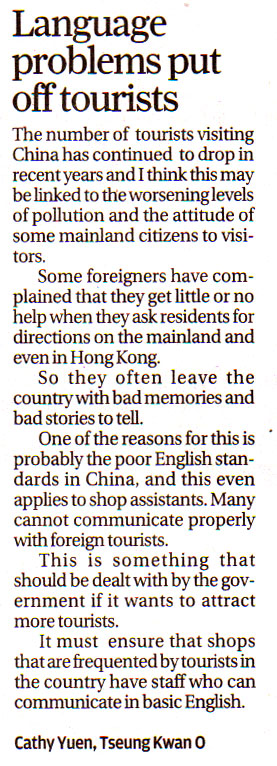
Young Post March 7, 2016
Chloe Ng 1D
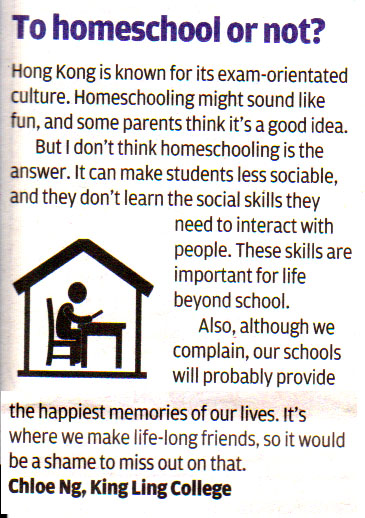
SCMP March 7, 2016
Joey Chan Yuen-yi 4D

Walter Chong 3B
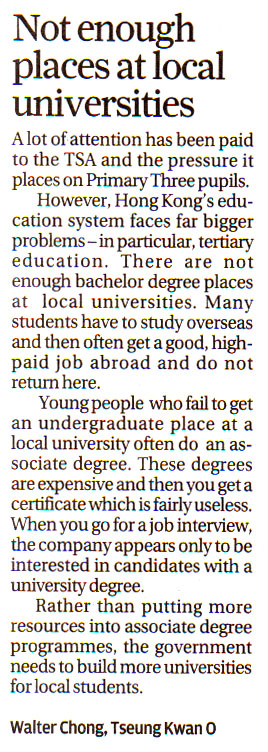
SCMP March 5, 2016
Hebe Ng Yik-huen 4E
Homework overload not beneficial
As a saying goes, “Learning is more important than scoring” but for most Hong Kong students, parents and teachers scoring is more important than learning. Unfortunately, students in this city use most of their time dealing with homework and exams.
They have numerous homework assignments every day because the teachers think it is important for them to practise as often as possible.
Many students in Hong Kong cannot have eight-to-10-hours’ sleep at night and they pay a heavy price. Sleep is food for the brain and skipping sleep can be harmful to our body, especially for teenagers. Lack of sleep will limit the students’ ability to learn, listen and concentrate in class.
Besides, it is important for students to learn about the things they cannot learn during the lessons at school like real-life experiences, which is very important for our future.
However, students have little chance to dip into society because they are mainly studying or doing homework at home.
If students think learning is more important than scoring, they should try to get closer to nature or participate in more events in order to broaden their education instead of spending all their time and effort focusing only on examinations.
In my opinion, learning cannot be forced but needs to be encouraged by building the interest of students.
If students are interested in the subject they are studying, they will make more effort to study and they can grasp the concepts more easily.
Hebe Ng Yik-huen, Po Lam |
Eddie Wong Ting-yiu 4D
Lantau road decision damaging
Last month the Transport Department decided to allow additional permits for private cars and coaches to use South Lantau Road. This measure makes no sense.
There are number of reasons to be opposed to roads being overloaded on south Lantau, including the threat to wildlife.
With more private vehicles approved, some sensitive beauty spots could be ruined by tourists who misbehave. Visitors should be encouraged to visit Lantau but asked to explore it the natural way, on foot.
I am also concerned that more cars will disrupt the lives people who live in communities on the island such as the popular village of Tai O.
There is a growing distrust in the decisions being made by the government that affect this island.
Eddie Wong Ting-yiu, Tseung Kwan O |
SCMP March 4, 2016
Ivan Tsoi 2A

Harry Ng 5A
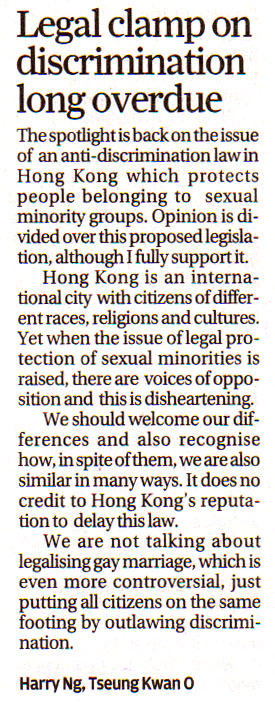
SCMP March 2, 2016
Christy Ma 5C

Jacky Chow Tsz-kiu 5C
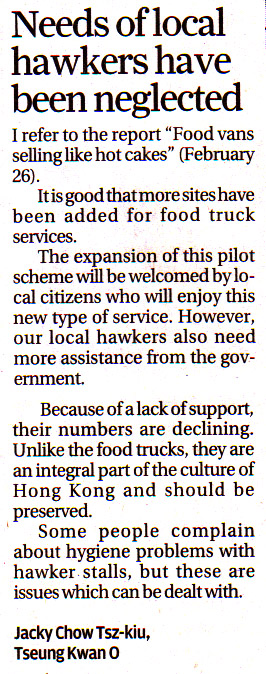
SCMP February 29, 2016
Anson Sin 4E

Fok Pui-yi 4E
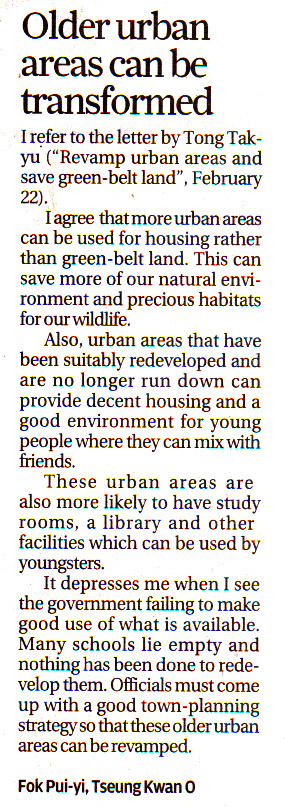
Young Post February 29, 2016
Joey Chan Yuen-ui 4D
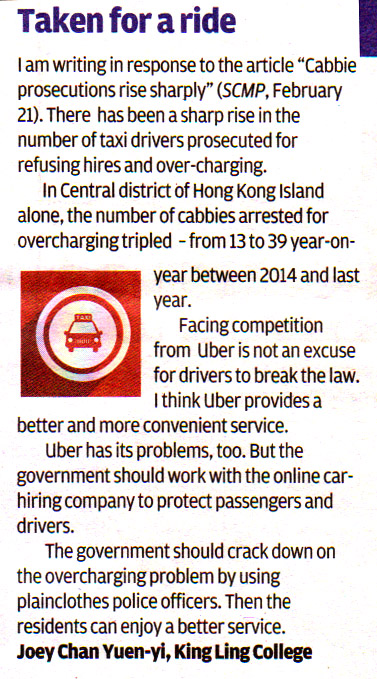
SCMP February 27, 2016
Roslin Law 4E
Urban plan best option for more housing
I refer to the letter by Tong Tak-yu (“Revamp urban areas and save green-belt land”, February 22), and I agree with the writer that the government should strike a balance between the needs of society and the environment.
Although the topic of whether to use green-belt land or redevelop urban areas has been controversial, it indicates that solving the housing problem is making headway. There’s an urgency to handling the issue. If the problem cannot be dealt with properly, it may cause more negative social effects for Hong Kong.
I support redeveloping the urban areas rather than extensive use of green-belt land which would damage our environment.
Redevelopment of urban areas can directly solve two problems – not just the amount of housing but also the poor living conditions people now have to tolerate.
The poor conditions of buildings in urban areas like Mong Kok and Kwun Tong are also another big issue in Hong Kong which cannot be overlooked. If redevelopment of the urban areas can solve these two problems at the same time, it is well worth doing.
If the government insists on using green-belt land there should be strict limitations to help avoid harming the environment and to ensure people have places to relax.
At the same time, the urban redevelopment should also be implemented on a small scale first to see whether it pushes up prices and will affect the factories and people nearby.
Roslin Law, Tseung Kwan O |
Nicole Wong Yuen-shan 5A
Supermarkets can help cut food waste
I am writing about requiring supermarkets to reduce food waste.
First, Hong Kong’s supermarket chains should understand that it is important to pay special attention to environmental issues, charity work and historic preservation, because it is our way of supporting the community.
Besides, in France a law was passed to require large supermarkets to donate edible unsold food to charities for immediate distribution to people in need. Hong Kong should follow the overseas example.
At present supermarket chains in Hong Kong are being encouraged to launch food recycling programmes. Food waste can be collected daily and turned into compost or animal feed, reducing the organic waste produced every day.
Nicole Wong Yuen-shan, Tseung Kwan O |
Li Chun-ip 4E
Homework load too much for students
I refer to the letter by Yoyo Sin Lok-yiu (“Teens can aim for better time management”, February 22). Your correspondent rightly points out that students are bombarded with too much homework.
As a student, I really understand the stiff competition youngsters face in local schools.
To force students to learn more and remember what was covered in class, teachers dish out an increasing number of worksheets. But the process is largely spoon-feeding which doesn’t help students in the long term when they join the workforce.
They will only be used to taking instructions, not using their own initiative. Besides, too much homework not only puts pressure on students but also causes physical harm. Burning the midnight oil can adversely affect their health. And, as your correspondent said, too much stress may damage students’ interpersonal relationships, and mental and physical health.
To my mind, students can help themselves with suitable management of time. They can draw up a timetable and stick to it. This can help clear the workload efficiently.
As long as the homework can be done on time, and at a high standard, students can then relax and enjoy some down time.
Everyone has different ways to relax but I highly recommend taking a break just after the work has been finished. It helps to clear the brain and eases the pressure of study.
Li Chun-ip, Lam Tin |
SCMP February 26, 2016
Hebe Ng Yik-huen 4E

Kassandra Wong Hiu-tung 4E

Sandy Chan Lap-kiu 4E

Sabrina Li Wan-hei 5A

SCMP February 23, 2016
Jason Luk 3B
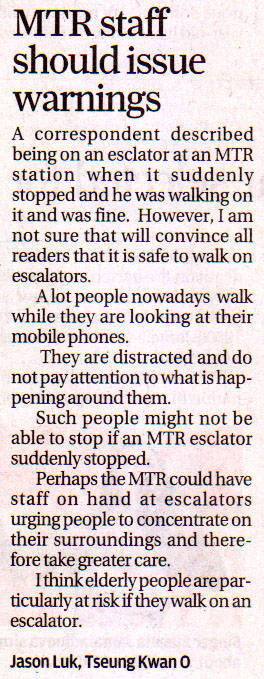
Young Post February 22, 2016
Wincy Lau 2C

SCMP February 20, 2016
Felix Leung 4E
TSA not true gauge of student skills
The issue of the Territory-wide System Assessment (TSA) has been a controversial topic for several months.
The test puts too much pressure on students, especially those in primary, school and is counter-productive to nurturing young minds. The endless process slashes their leisure time for enjoyment and their precious childhood is lost. And, does the TSA really offer insight into a student’s ability or is it simply a gauge of how much pressure schools put on them?
The knowledge students can acquire is greatly limited by the curriculum of the education system. It seems students are machines to be programmed.
I think the most important role of an education system is to encourage people to develop an interest for learning. And helping others with that knowledge in real life gives a sense of achievement.
Felix Leung, Tseung Kwan O |
SCMP February 17, 2016
Nicole Tse 2A
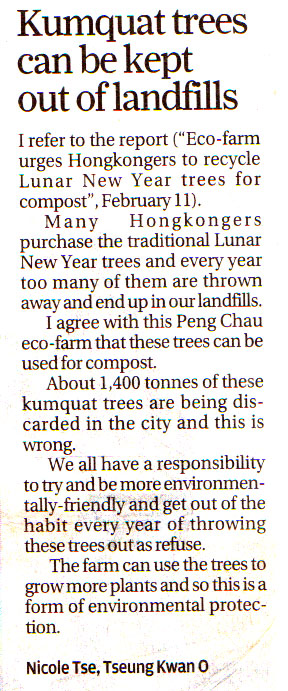
SCMP February 14, 2016
Vivian Tang 5A
Street food a unique part of city’s culture
Hong Kong’s culture seems to be taking backward steps. Take, for example, the local food culture which is represented by street food sold by hawkers. The events in Mong Kok on Monday night showed that a lot Hongkongers care deeply about preserving street food.
Some people complain about the lack of hygiene at some of these stalls. However, the best vendors make superb food and it is much cheaper than a normal restaurant. This is important for people with limited budgets like me.
Diners with concerns about cleanliness can simply avoid these stalls. But, I find that many of the vendors making food such as fishballs which they prepare themselves, ensure good hygiene and their products are safe to eat. It is up to the customer to take care and look at a stall before deciding to place an order.
Hong Kong street food has been with us for decades and it is part our traditional cuisine. If the government continues to crack down on it, something unique will soon disappear. Local culture is an integral part of the identity and spirit of a city and we should all be trying to protect it.
Vivian Tang, Tseung Kwan O |
Jordan Chan Wai-tsun 2B
Sensible use of smartphone by parents helps
Smartphones are playing a more important role in the lives of so many Hong Kong citizens.
A mobile phone is no longer simply a means of communication. Now you can take photos and play computer games.
To a large extent I think these are positive developments provided people ensure sensible use of these devices, but there can be negative aspects.
It is now recognised that some people can become addicted to their smartphones poring over the screens using the keyboard for up to 10 hours a day. They may overuse social network sites like Facebook or the popular mobile app WhatsApp. They get to the point where they cannot imagine being without their mobiles, even for short periods.
This obviously has an adverse effect on their lives, including damaging relationships with family members and friends. They will opt to communicate with people via the smartphone rather than face to face. It is good for all of us to sometimes sit down and just talk with friends.
Even some children have become addicted.
Their parents need to see the danger signs or prevent the problem developing by acting as role models.
If they restrict their use of their smartphones, this will have a positive influence on their sons and daughters.
Jordan Chan Wai-tsun, Tseung Kwan O |
Kassandra Wong Hiu-tung 4E
With so many tests, stress levels are high
There is no doubt about the negative impact of the Territory-wide System Assessment (TSA).
Not only do students face more homework, but they also have to do more exams and tests. They need to keep practising and drilling after school and also during lessons.
If teachers have to do so much practising for the TSA test they might not have sufficient time to cover all of the curriculum in class during the school term.
I can understand how this happens. Pressure is being put on teachers, because schools want good grades and therefore good TSA results.
In fact the whole education system in Hong Kong focuses a lot on exam and exam results. And this not only affects secondary schools. Pupils at primary level are also under pressure. Results are more important now as Hong Kong is becoming a knowledge-based economy.
However, because students are under greater pressure to do well they become more tired. I accept that exams do have an important role to play as they can encourage students to work harder.
However, a balance must be struck. If students are put under too much pressure they may lose interest in their studies and their motivation to excel.
The Education Bureau should recognise that problems exist and try to relieve some of the stress that so many students feel.
Kassandra Wong Hiu-tung, Tseung Kwan O |
SCMP February 13, 2016
Wong Chun-hei 6B
More exercise and better food choices vital
Hong Kong citizens don’t seem to care about their health . There are two aspects of their daily lives that represent bad habits that damage health.
To start with, their liking for food that has too much oil, sugar and salt. Street snacks and lunches at cha chaan teng are not the best for health. Then many like to have a mid-afternoon tea break when tarts, red bean ice drinks, steamed egg custard buns and other high-calorie food are eaten. An egg tart has about 20 grams of sugar per 100 grams and sugar calories are the worst for health since sugar turns to fat in the liver which increases the risk of diabetes, heart and liver disease.
This is not only a concern for the elderly, but teenagers also need to care about it .
Likewise, exercise should be a higher priority for a healthy lifestyle. Hong Kong citizens are very lazy and claim they are too busy. They mostly spend any leisure time playing with their smartphones rather than exercising.
I think Hong Kong citizens should be eating more vegetables and not so much meat and must give up their high-calorie food habits. Moreover, without a balanced diet and some outdoor activities such as hiking to breathe some fresh air the health consequences can be severe.
Wong Chun-hei, Tseung Kwan O |
Sandy Chan Lap-kiu 4E
Fung sends a message to inspire us all
I am writing in response to the article entitled “Fung hopes victory will inspire others”, published on January 18 and I would like to express my admiration for Fung Ying-Ki.
Fung , a wheelchair athlete, won the Hong Kong Marathon 10 km race in 28 minutes and 51 seconds. It was not an easy victory on a tough course and against some Guangzhou-based athletes but Fung won the race through his own strong willpower.
I was also inspired by his ‘never say never’ philosophy and that no one should be sidelined by a disability.
Fung’s approach to life should not only inspire other disabled people but is a reminder to everyone that we should persevere in striving for our goals.
Sandy Chan Lap-kiu, Yau Tong |
Summer Cheng 3B
Students have too much exam pressure
I refer to Paul Yip’s article (“Exam fatigue”, February 1).
Pressure on Hong Kong students is widespread because there are many different tests and examinations. Students have no choice but to concentrate on exams to meet university entrance requirements. When we start our studies, our target is simply to get into university, not join the workforce.
It is a hot topic of debate whether the Territory-wide System Assessment is suitable for Primary Three students. They are young but have little time for fun and face a lot of stress.
To make study more interesting, students should be able to join extra-curricular classes they will enjoy, not those their parents force them into.
Summer Ting, Tseung Kwan O |
SCMP February 11, 2016
Kitty Lui Sze-ki 3B
Put spotlight on risks of high sugar intake
I refer to the article by Jeanette Wang (”The bitter truth”, January 18).
I agree that people have to be more aware of adding too much sugar to their diets because of the health risks involved, including diabetes and heart and liver disease.
However, the problem is that there is so much free sugar in products we consume every day, such as soft drinks and snacks. That makes it difficult for adults and children to stick to the daily intake of sugar as recommended by the World Health Organisation.
The WHO advises that adults and children should reduce their daily intake of free sugars to less than 10 per cent of their total energy intake, but I think few people are aware of this recommendation and would have trouble achieving this goal.
The Hong Kong government should do more to try and raise people’s level of awareness about the need to cut back on sugar through multi-media advertising.
It should also pass legislation to force manufacturers to reduce the sugar content in their products.
People need to have a greater awareness of health issues and have more regular check-ups. We should all think more about the amount of sugar in our diets and start reducing our intake.
Kitty Lui Sze-ki, Tseung Kwan O |
Janice Yuen 5E
Better urban planning key to land shortage
I refer to the letter by Kaylie Lai Tsz-ki (“Country parks necessary to help us relax”, January 22).
I agree with your correspondent that the government should not build homes in areas which lead to the destruction of parts of our country parks. As Ms Lai pointed out, these country parks offer Hongkongers a chance to get some release from stressful lives.
Most citizens work long hours compared to developed societies elsewhere in the world. The country parks help them to relax and enjoy outdoor activities with family and friends. Also, building homes in parks would result in many trees being felled and trees help to reduce levels of air pollution in Hong Kong.
Once a decision is made to build homes in areas of the parks, unique ecosystems are lost forever. Building more homes will not solve Hong Kong’s housing problems if high prices make them unaffordable for many citizens.
Better urban planning can help ease the shortage of land. The government can implement more renewal projects in urban districts such as Yau Tsim Mong and Sham Shui Po.
Janice Yuen, Sai Kung |
SCMP February 10, 2016
Dennis Fan 3B
Women must fight against discrimination
I refer to a report about a court case in the US (“Female chauffeurs win anti-discrimination suit”, February 1).
I think this case highlights the need to fight discrimination in the workplace.
There are still some companies where preference is given to male over female employees.
This manifests itself in different ways, but often it means that the male employee gets paid more for doing a similar job and working the same hours.
This is obviously unfair to the female employees.
There can also be problems with some parents not wanting their daughters to go into certain professions or sports such as professional soccer, because they do not think they are suitable for women.
It helps when you see role models showing that a woman is just as capable of doing a job as a man, especially a job that is usually associated with men, for example, South Korea’s president Park Geun-Hye.
It is very clear that discrimination in the workplace against women is no longer acceptable.
Dennis Fan, Tseung Kwan O |
Alex Law 4E
MTR is right to persevere with announcement
I refer to the letter by Colin Bosher (“Escalator walkers are in no danger”, February 1) which I think misleads readers.
Your correspondent writes about his own experience, saying he felt safe when walking on an escalator at an MTR station which suddenly stopped.
However, he might not be so fortunate if this happens again. For example, if you chose not to wear a seat belt in a vehicle, you might be all right on a few occasions, but if there was an accident the risk of sustaining an injury would increase without the belt.
Mr Bosher advises the MTR Corporation to stop exhorting passengers to remain stationary, arguing this will slow down the flow and result in conflicts between users.
However, the MTR Corp really needs to do this.
There will be more accidents if it does not make this announcement.
Hong Kong people are extremely busy and do not like to have their time wasted in any way.
However, there is nothing more important than safety.
Surely it is worth waiting a little bit longer on an escalator if it ensures that you do not sustain an injury.
Alex Law, Tseung Kwan O |
SCMP February 9, 2016
Desmond Chan chun-fai 3D
Students felt they had to launch boycott
I refer to the report (“University of Hong Kong staff fail to turn up for vote whether to back student class boycott”, January 31).
The class boycott by some HKU students was temporarily suspended. They are dissatisfied with the appointment of Arthur Li Kwok-cheung by Chief Executive Leung Chun-ying as chairman of the university’s governing council.
This appointment went through even though it was clear that large numbers of students were opposed to it and they felt their views were being ignored.
Since becoming chairman Li has shown scant regard for the views and rights of the students. He has not responded to requests to meet the activists.
It is clear that Li does not respect the views of the students and has been hostile towards some of them.
After some activists besieged a university council meeting venue attended by Li he suggested that they were acting like they were on drugs.
I do not understand how someone with this attitude could become chairman of the university council.
The primary concern of someone in that position should be the welfare of the students. And yet he has failed to show them even basic respect.
I can therefore understand why the students regard his appointment as intolerable.
The chief executive chose to ignore their objections when he appointed Li.
Given the problems at the university, I can understand why it was decided to implement a class boycott.
It was a way to let C. Y. Leung know that students have rights that should be respected by the chief executive.
Desmond Chan Chun-fai, Tseung Kwan O |
Jason Wong Kun-tong 3A
More flexible approach is long overdue
I refer to the letter by Paul Serfaty (“Encourage youth’s love of freedom”, January 18).
I agree that the public should welcome the love of freedom expressed by young people. However, while many young people do support freedom in society, it is not reflected in our education system where they are under so much pressure to study hard.
The mode of education in Hong Kong continues to be dominated by a culture of spoon-feeding.
Young people should be able to use their school years to explore society, but this is not happening.
Because of the pressure of academic work they get stuck in a rut and their lives revolve around home and school and little more.
One way in which the government could improve things would be to scrap the Territory-wide System Assessment test for students in Primary Three.
It should then issue guidelines to schools urging them to give pupils greater freedom and make studying a more enjoyable experience.
They should be able to go on more trips out of school so that they can explore the society around them.
If they are given more flexibility in their studies during their school years, then I think young people will have a keener sense of the meaning of freedom. They are a vital part of our society.
Jason Wong Kun-tong, Tseung Kwan O |
SCMP February 6, 2016
Cathy Yuen 3D
CY fails the elderly and students
I refer to the letter by Jason Lui (“Policy address failed city’s elderly and stressed-out students”, January 25).
Firstly, I agree that Chief Executive Leung Chun-ying’s policy address lacks sufficient support for the elderly and the government failed to act on universal retirement protection which many Hongkongers want and need. If the government implemented such a scheme, many elderly would benefit from a basic living allowance. It has ignored these concerns and instead just pays lip service to citizens.
Moreover, the policy address failed to tackle the problem in the education system which puts students under high pressure from homework and exams. High scores in school are the top priority and this leads to the existence of stressed-out students.
Recently, some parents complained about the Territory-wide System Assessment tests for Primary Three students. Since extra work is needed to prepare for tests, children are under severe stress, with a lot of after-school assignments daily. This is an indication that the education system in Hong Kong is not effective.
Lastly, the housing problem needed to be handled in the policy address. The government dawdles in dealing with this issue, and has kept many citizens waiting too long for public housing flats. The adminstration should immediately take action so that more citizens can have a comfortable place to live.
In conclusion, more government measures are needed now to make Hong Kong a more successful city.
Cathy Yuen, Tseung Kwan O |
Brenda Wong 4E
Action urgent on landfills and pollution
We face two major problems in Hong Kong – landfills nearing capacity and bad air pollution that affects our health and well-being
In recent years, the shortage of landfill space seems to be reaching a critical point. The three landfill sites in Hong Kong will be completely filled soon, according to some research, if the level of waste continues to grow at the same pace.
It is time for the government to act without delay.
Waste reduction and recycling must be promoted and thereby levels of waste can be reduced gradually.
Moreover, not only should new landfill sites be identified but some resources that are now mostly ignored should be targeted for recovery.
Another major problem is air pollution. Most of the polluting gases come from Guangdong and Hong Kong needs cooperation with the government there to limit the negative heath impact on citizens and on the city’s image.
It is the responsibility of all Hong Kong citizens, not just the government, to limit polluting practices.
Brenda Wong, Tseung Kwan O |
Kenneth Cheung Ho-yeung 3B
Good time to cut back on sugar and salt
I refer to the article (“The bitter truth”, January 18) which highlights the dangers of consuming too much sugar.
Soft drinks and desserts are popular in Hong Kong but a can of cola can contain 10.6g of sugar per 100 ml and a pineapple bun can have 13g per 100g. Excessive consumption can lead to diabetes, and heart disease and Chinese New Year is a timely reminder of the dangers of high sugar intake.
It’s not just fortune cookies, crispy honeycomb, peanut puffs and Nian Gao fritters we should be wary of – too much sodium is another serious problem .
At this time of year we may be tempted to have more pork, peanut cookies , and salty kumquat but less junk food and regular exercise will lead to many health benefits, including lower stress and cholesterol levels.
Kenneth Chueng Ho-yeung, Po Lam |
SCMP February 5, 2016
Rain Yeung 3D
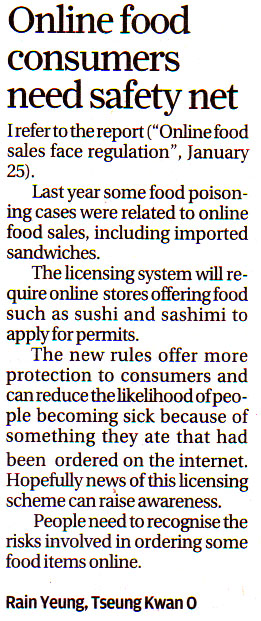
Donald Chan 4E

SCMP February 4, 2016
Iris Leung Tsz-ki 1B
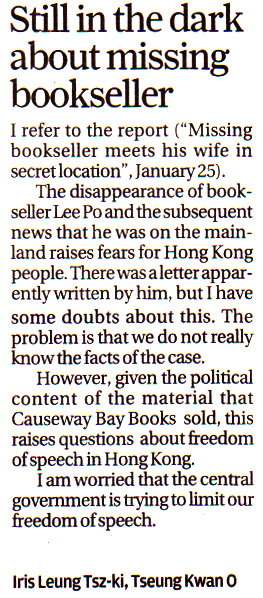
Samuel Cheng Ka-ho 3B
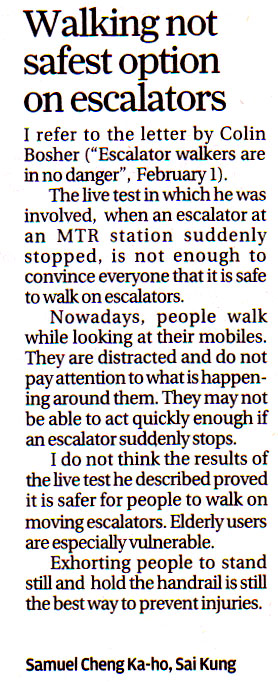
Jason Luk 3B
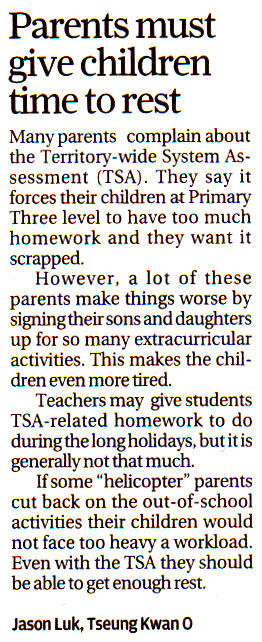
SCMP February 3, 2016
Anson Sin 4E

Cathy Lo 4B
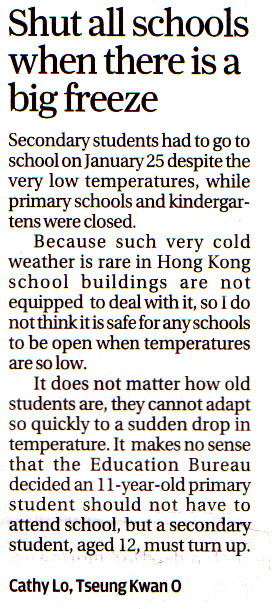
SCMP February 2, 2016
Debby Wong 5E
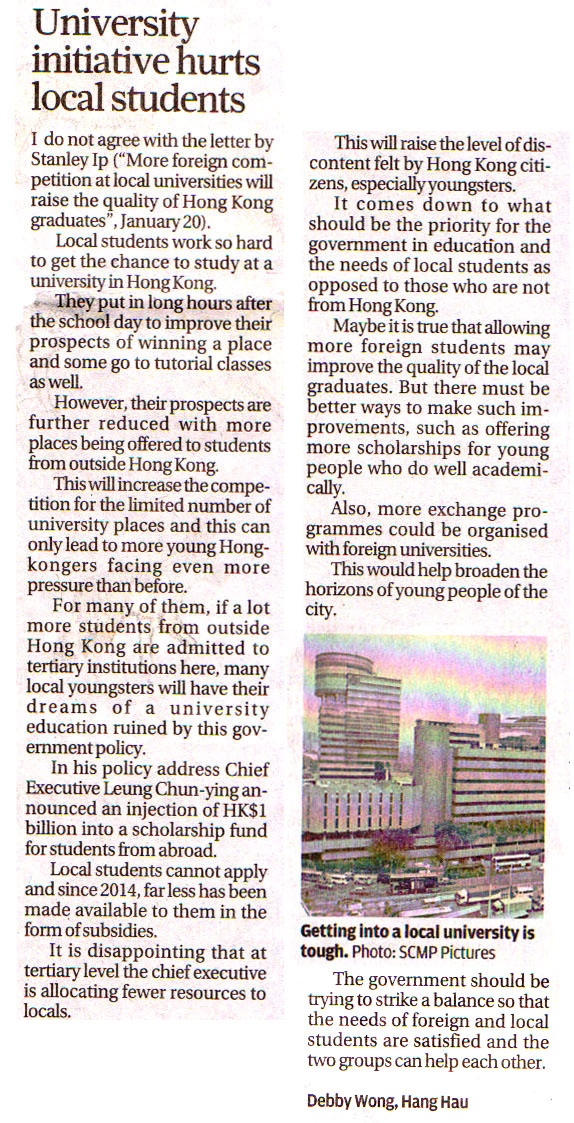
Kaka Lau 4B

Suki Lee 3D
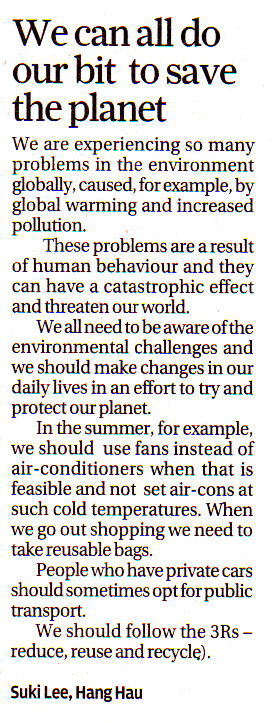
SCMP February 1, 2016
Jack Li 4B
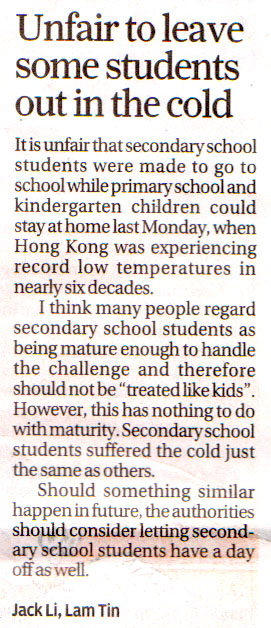
Spencer Lee Hiu Ming 4B

Cathy Lo 4B
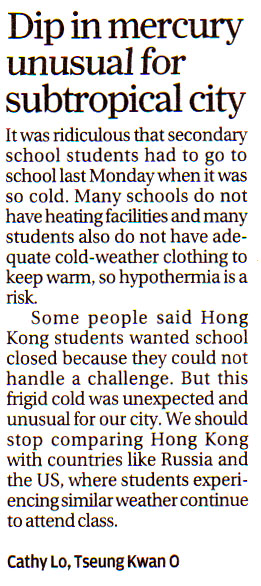
Young Post February 1, 2016
Kelly Zheng 1C
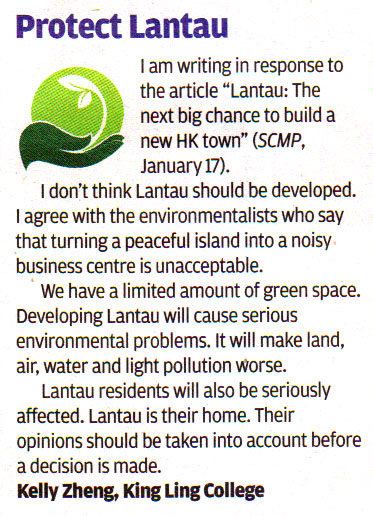
SCMP January 30, 2016
Coco So Kwan Yu 4B
Too cold to go to school – for all students
The Education Bureau cancelled classes for primary school students on Monday during the cold snap, yet secondary school students must still attend class. This is unfair.
Hong Kong experienced its coldest weather in nearly six decades last weekend. Students had to wear gloves and ear muffs to keep warm.
Primary school students could stay home to avoid hypothermia but secondary schools couldn’t. Many schools have no heaters, so it feels just as cold inside as outside, and students could not pay attention to the lessons and were just wasting time.
Secondary school students felt the cold too. Classes should have been cancelled for them as well.
Coco So Kwan Yu, Tseung Kwan O |
SCMP January 29, 2016
Seki Chan 3B
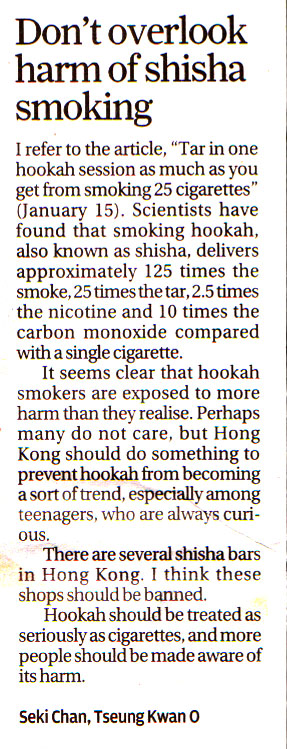
SCMP January 26, 2016
Brian Chan 5E
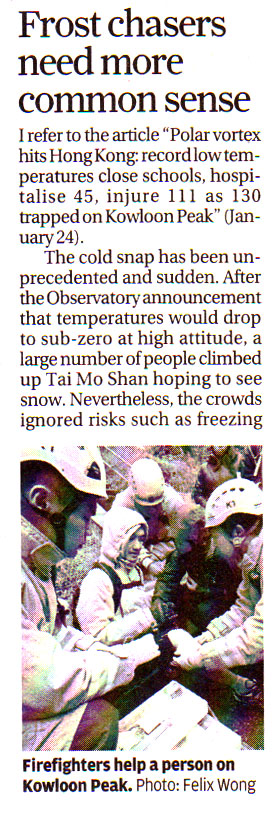
SCMP January 21, 2016
Melody Ho 3A
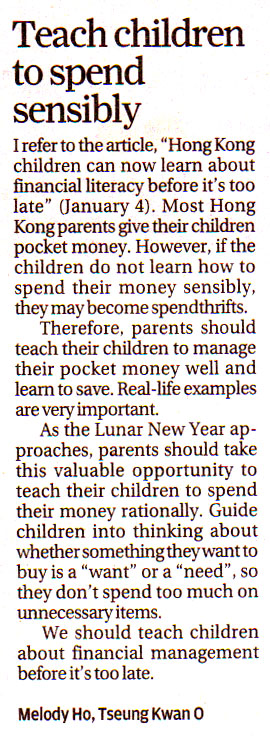
Christin Chan 5A

SCMP January 19, 2016
Karina Kwok 5A

SCMP January 16, 2016
Desmond Chan Chun Fai 3D
Internet will grow dull with new law
The government must substantially change or even take back the proposed amendment to the copyright law because implementing it will surely make the internet much less entertaining than it is now. Artists and other internet users who enjoy sharing works online will do less of it as they will be worried about unwittingly infringing the law.
More importantly, the proposed change will be a blow to our freedom of speech, which is a Hong Kong core value.
The internet should remain a free space, open to anyone who wishes to create and share their works.
The “Article 23 of the internet world” must be rejected.
Desmond Chan Chun Fai, Tseung Kwan O |
Lee Pui Yu 2B
Be wary of meeting ‘online friends’
We must be careful of the many pitfalls when using social media sites.
One is a possible breach of privacy. Some people have had their personal information stolen, so we should be careful with the personal information we share on social networking sites.
Further, we must be careful about the people we meet through such sites. Cyberbullying is a worry. Besides that, we must beware of cheats.
Many teenagers today buy and sell things through social media sites. Often, they would arrange to meet in person for the transaction. But it is dangerous to meet someone we have met only online. If we must meet, it is best to find some company, either an adult or several friends in a group.
We must be careful so we don’t become a victim of a cyber crime or online bullying.
Lee Pui Yu, Tseung Kwan O |
SCMP January 12, 2016
Mabel Wong 2C

Young Post January 11, 2016
Hui Ka-yan 3C
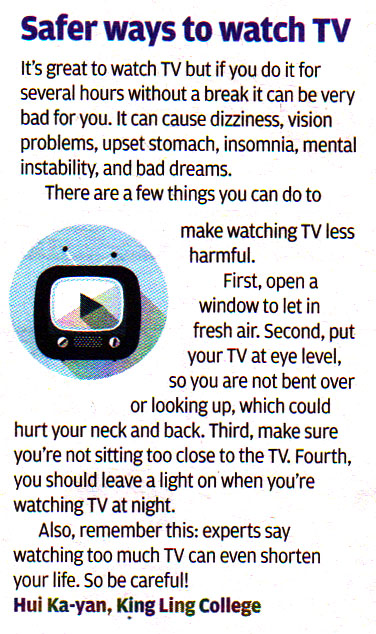
SCMP January 11, 2016
Katie Lo 4D

SCMP January 9, 2016
Nicole Tse 2A
Banning hoverboards the right move
I agree with the government’s rules to limit the use of hoverboards in Hong Kong, and am glad the airlines are also taking steps to ban them from planes (“Hoverboards banned from planes as airlines take a stand on security”, December 27).
Although travelling by hoverboard is convenient and interesting, there have been a spate of fires associated with these devices. In most of these cases, the problems have been traced to substandard parts, such as the charger or the battery, leading to overheating that can cause fires.
Thus, it is reassuring that dozens of airlines, including local carriers such as Cathay Pacific, Dragonair, Hong Kong Airlines and HK Express, have banned them from flights.
In Hong Kong, riding the self-balancing electric vehicles on streets and pavements is illegal.
Hoverboards may be fun but safety comes first.
Nicole Tse, Tsueng Kwan O |
Roslin Law 4E
Forward thinking can beat stress
I recently watched the Ted talk, “How to stay calm when you know you’ll be stressed”, by neuroscientist Daniel Levitin, suggesting a way to help us cope with pressure.
As a student, I am quite interested in this topic as exams are near, and we’re under great pressure to get good results. Some people think this kind of stress is uplifting and will help to reinforce character.
But it’s not true. According to Levitin, a brain under stress will release “cortisol that raises your heart rate, modulates adrenaline levels and clouds your thinking”.
So what can we do? Levitin suggests a “pre-mortem”, an idea he got from the Nobel laureate Daniel Kahneman. A pre-mortem is when we look ahead and think through all the things that could go wrong, then try and figure out what we can do in response. It means thinking through in advance all the ramifications, and deciding what action to take to prevent things from getting worse.
This way of thinking can help to clear up our minds when we are under stress.
It helps when we need to make a decision.
Levitin gave a very interesting example. If we needed to make a medical decision, for example, there are many things to think through. Say we’re deciding whether or not to take a drug. There’s a statistic we should know yet mostly don’t. That’s known as the “number needed to treat”, that is, the number of people who need to take a drug before one person is helped by it. For many drugs, the number is high.
Levitin cited the “number needed to treat” for the most commonly prescribed statin (used to treat high cholesterol): 300. That means 300 people must take the drug before one person is helped by it.
Despite this statistic, many people are taking this drug. This is one example of us seeing only the positive side but not seeing the negative side. If we don’t see the whole picture, we may be making decisions that only harm ourselves.
I believe thinking through our problems in this way will help us when we’re under stress.
Roslin Law, Tseung Kwan O
|
Emily Leung 2A
Give children room to grow up properly
When I read about the plight of the 40,000 Hong Kong children living in cramped conditions (“Revealed: heartbreaking plight of 40,000 Hong Kong children stunted by life in tiny flats ... and it’s getting worse”, December 31), I was reminded of a TV programme I watched about a single mother living in a subdivided flat with her two children.
The mother earns HK$8,000 a month. Rent takes away HK$3,000 and she has to pay for her children’s school meals and utilities fees with the rest of the money. What’s left over is used for food.
The family live from hand to mouth, and the mother has to keep working for survival. On top of it, their living environment is very bad.
The government should help these families. It could distribute a “wealth card” to people below the poverty line that allows them to buy groceries and other necessities at a discount from selected shops.
It can also set up a centre that serves free meals to card carriers, and also offer space where the children can do their homework. The report on children living in subdivided flats found that many had nowhere to do their homework.
These poor families must be helped to get out of the poverty trap.
Emily Leung, Tseung Kwan O |
SCMP January 6, 2016
Carol Mo Ka Wai 4E
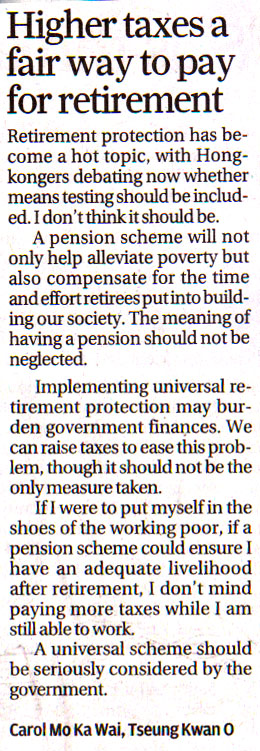
Young Post January 4, 2016
Trisha Tobar 2A
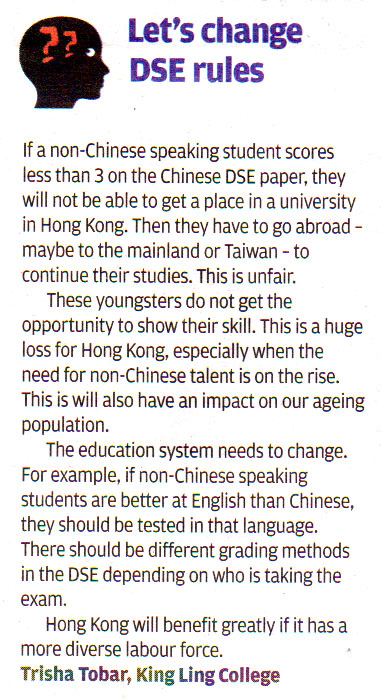
SCMP January 4, 2016
John Hung 2D
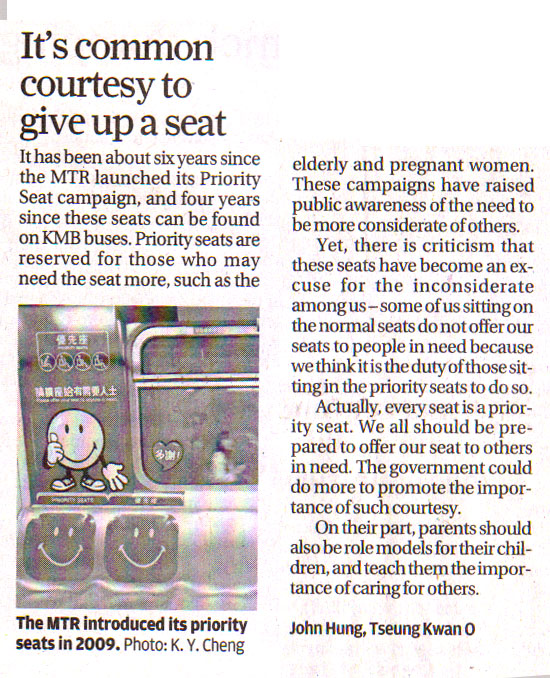
SCMP January 1, 2015
Mary Ko 4E
Celebrate, with a care for the environment
Whenever it is Christmas or Lunar New Year, citizens are willing to spend money to dine out or shop. However, here comes the problem. Food that cannot be finished is thrown away, and decorations that were bought for the festive season are used for a while then disposed of.
We surely can think of ways to reuse them. I recently joined an activity which used drink cans to make a Christmas tree, and the “tree” was displayed in Tsim Sha Tsui. It was a meaningful and unforgettable experience. If we are creative enough, everything will be possible, not only making a Christmas tree!
Amid the festivities, citizens can think of ways to protect the environment and celebrate at the same time. To begin with, we should pack what is not eaten at restaurants and take it home. We don’t need to be embarrassed to do so.
We can also reuse decorations for the next year. If we really do not want them, we can still give them to organisations like the Hong Kong Federation of Youth Groups for recycling.
Last but not least, citizens can think of creative ideas to make unwanted things into interesting things, such as accessories.
Festivals make us happy. But while we enjoy ourselves, we also have to consider how we can help the environment.
Mary Ko, Tseung Kwan O |
Zoe Chung Ka Man 3D
Toilets don’t top priority list for women
No doubt discrimination against women has eased a lot over the years. The Hong Kong government is now planning to amend legislation that would ensure there are more toilets for women in public buildings in the city (“Toilet relief on the way for women”, December 7). Its intention is commendable, but there are many other things it could do first.
The government could do more to support mothers who want to breastfeed, for example. Many conservative Hongkongers regard breastfeeding in public as improper behaviour. And how about increasing the number of nurseries in our shopping malls? It has often been suggested that the government should do more to help our mothers and mothers-to-be.
Many women continue to suffer domestic violence. They need our attention, too.
Given these and other issues, building more toilets for women is not the best way to protect their interests.
Zoe Chung Ka Man, Tseung Kwan O |
SCMP December 31, 2015
Kassandra Wong 4E
Good move to replace polluting buses
I refer to the report, “Hong Kong’s first green bus hits the road in government scheme to improve air quality” (December 27).
I think it is important that buses running on fossil fuels are eventually replaced by electric vehicles. Switching to this greener option will improve the quality of air in Hong Kong. This is necessary if we are to improve our quality of life. In fact, all public transport should be going in the same direction, including minibuses and taxis.
Also, the government should do more to encourage citizens to buy electric cars. As they are generally more expensive than their diesel counterparts, the government should offer financial incentives.
Kassandra Wong, Tseung Kwan O |
SCMP December 29, 2015
Jane Cai 2B
Too many of us fail to take care when online
We keep seeing rapid advances in internet technology.
Most of use the net frequently, to communicate, to search for information and to relax.
The net is very convenient, but too many people ignore the obvious risks.
We should not be careless about our privacy, but should ensure that it is always protected. A lot of people still post details such as phone numbers, home addresses and photos of themselves online, including on social network sites such as Facebook.
This information can be exploited by criminals. And if they do not ensure a good firewall they are vulnerable to hackers.
The government should try to raise people’s awareness of the importance of cybersecurity.
Jane Cai, Tseung Kwan O |
SCMP December 28, 2015
Christy Lam 3D
There is a good case for axing TSA in schools
Over the last few months, parents have been up in arms about the Territory-wide System Assessment (TSA) for Primary Three pupils. They want drilling for the test to stop in schools, arguing that children already have too much homework every day.
However, these parents are exaggerating the problem a bit. The material in the TSA is taught in class and the students should know it. Also, parents should not place all the blame on local schools, as they often sign their children up for a lot extracurricular activities, which gives the children little time to rest and do homework, for example, to prepare for the TSA.
Having said that, I think the parents do have a point and I am not convinced the TSA is necessary. The government could cancel it. If it wants to see how a school is performing, it can look at schools’ overall exam results.
Instead of being obsessed with good exam and test results, schools should be focusing on ensuring their students enjoy a good learning environment and that they are happy with their studies.
Christy Lam, Tseung Kwan O |
SCMP December 24, 2015
Eva Chow 3D
Welcoming revised toilet law for women
I refer to the report, “Toilet relief on the way for women” (December 7).
I agree that there are not enough toilets for women in Hong Kong. In existing buildings, the toilet ratio is the same for men as it is for women, but women have to wait longer in line and often have to take care of children at the same time.
There should be at least one toilet for mothers, which is something that shopping malls do not have. The amendment stipulates that there must be 1.6 female toilets for every one male toilet in public places. The ratio should be 1.3.
Also, more must be done to ensure toilets are clean. This is especially important for breastfeeding mothers.
Eva Chow, Tseung Kwan O |
SCMPDecember 23, 2015
Phoebe Fok 4E
Landslide puts spotlight back on safety issues
I have felt a mixture of sadness and anger when reading the news reports about the landslide on the outskirts of Shenzhen which has led to so many fatalities.
Some reports have suggested that the level of devastation was so bad because of the huge volume of dumped earth and construction waste.
Once again, it raises questions about safety issues with regard to construction projects on the mainland and the role played by the authorities.
There was a time when Hong Kong experienced problems with landslides and appropriate measures were taken to reduce the risks, such as planting more trees, and strengthening piling and retaining walls to make the structures safer.
The central government must ensure there is a full investigation into what happened in Shenzhen and work out what measures are needed to prevent a repeat of this tragedy.
It must ensure measures are in place to reduce the risk of landslides, especially when there has been heavy rainfall. Preventive measures must be put in place. Overall, there has to be a greater awareness of the risks posed by landslides.
There must be better planning of construction projects, when new towns and extended urban areas are being planned, to ensure the safety of residents.
Phoebe Fok, Tseung Kwan O |
SCMP December 21, 2015
Lynette Tang Wing -yan 3D
Hoping to see antibiotic-free meat on menu
I refer to the report, “HK watchdog steps up war on meat hazard” (December 7).
The Consumer Council has alerted restaurant chains to the risk posed by animals fattened on antibiotics and urged them to stop serving meat from such animals.
If we eat a lot of meat containing antibiotics, it could harm our health. Having this meat sold in the city is bad for Hongkongers as antibiotic-resistant bacteria pose a serious hazard. In the long term, common infections could become resistant to even the strongest antibiotics. The results globally could be catastrophic.
The government has to follow the lead of a number of countries and get food producers and farmers to gradually reduce the use of antibiotics. We should be aiming to have restaurants offering antbiotic-free meat on their menus.
This an important food safety issue that the administration has to deal with.
Lynette Tang Wing -yan, Tseung Kwan O |
SCMP December 20, 2015
Suki Lee 3D
Careful eating and exercise key to health
Nowadays, there are many public health problems concerning food and we should do more to protect ourselves.
Firstly, when we go to the supermarket we should check the nutrition label carefully to know which ingredients it’s best to avoid.
W e should not only remember to buy foods that have less sugar and salt but also to do more exercise and play more sport.
We should aim for around 15 to 30 minutes each day or do sport twice a week with friends so that it’s fun while we make our bodies stronger.
The government can also play its part and should remind citizens to be more careful in their daily lives and develop healthy habits.
Following some simple rules can help us reduce the risk of public health problems.
Suki Lee, Hang Hau |
SCMP December 18, 2015
Wong Nok-lam 3D

Michelle Mai 3D

SCMP December 17, 2015
Chrissie Leung 5A

Katrina Lo 3C

Vincent Lau Chun-sing 2B

SCMP December 15, 2015
Sandy Chan Lap Kiu 4E
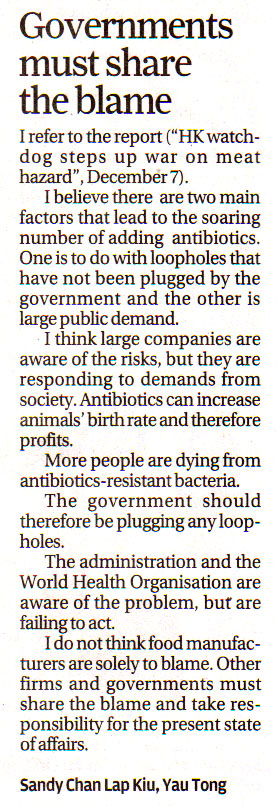
SCMP December 14, 2015
Cindy Lo 5E

SCMP December 13, 2015
Harry Ng 5A
Music scene can boost cultural status
In Hong Kong, we are known for our diversity of cultures. Yet our local culture appears to be withering.
Take the music awards as an example. The recent Mnet Asian Music Awards was held in Hong Kong for the fourth time. The Korean music awards had many of us discussing it for weeks. However, few today care about how the Hong Kong music awards went.
This lack of interest can be attributed to several reasons. Most importantly, we seemed to have stopped supporting the local music industry. Money and attention are on the decline.
It would be nice to see Hong Kong’s music prosper like back in the 1980s when we dominated the Asian market. It is time for the government and citizens to take action to give the industry a boost and build up our local identity again.
Harry Ng, Tseung Kwan O
|
SCMP December 11, 2015
Chloe Chow 4E
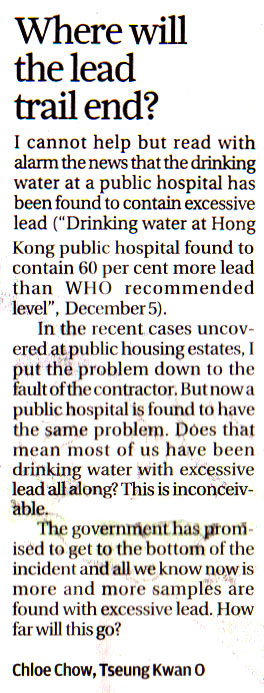
Debby Wong 5E
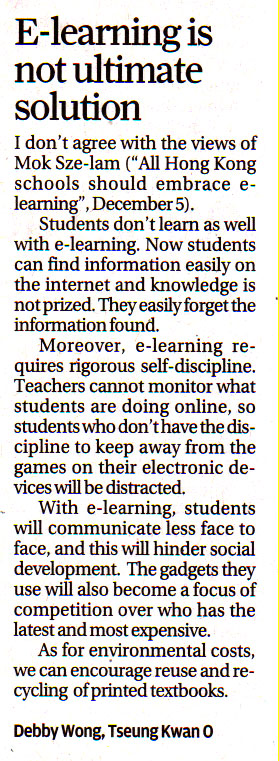
SCMP December 10, 2015
Stephen Yip Chak Sang 6B
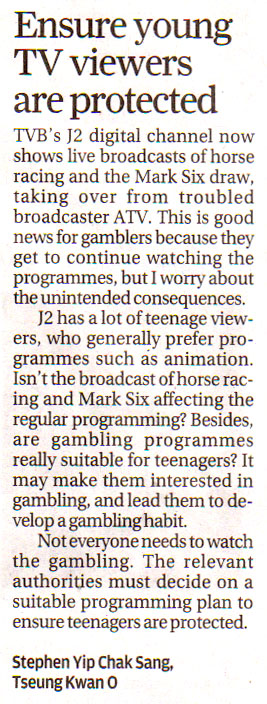
SCMP December 7, 2015
Natalie Fong Wing-yin 6B

SCMP December 4, 2015
Kelly Leung 4C
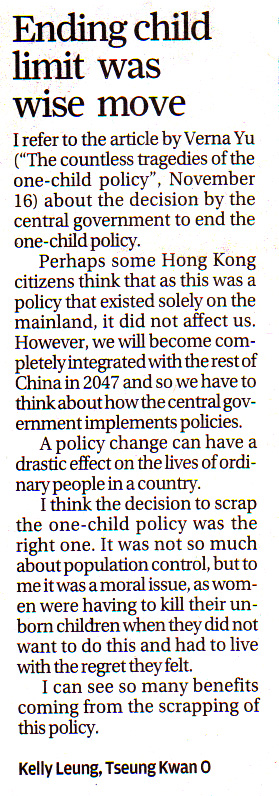
Young Post December 2, 2015
Timophy Pit 5D

SCMP December 2, 2015
Cathy Yuen 3D
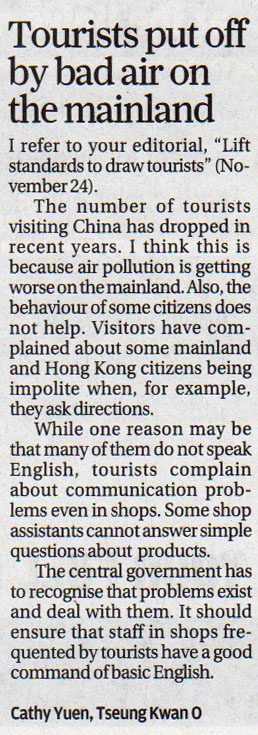
Young Post November 30, 2015
Hillary Chan 4A
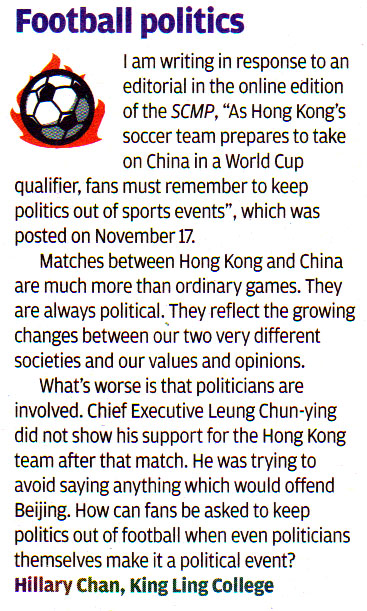
SCMP November 26, 2015
Sammi Lo Wing-sum 4D

SCMP November 25, 2015
Desmond Chan Chun-fai 3D

SCMP November 23, 2015
Cathy Yuen 3D
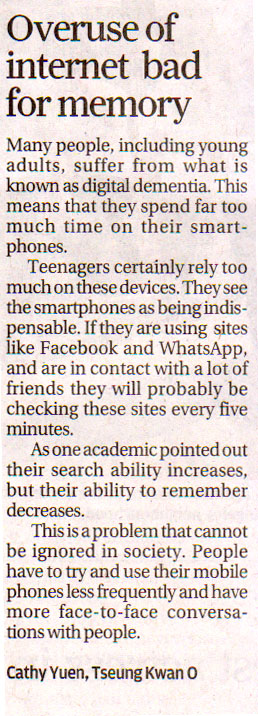
Zoe Chung Kam-man 3D

Young Post November 23, 2015
Rainbow Or 2A
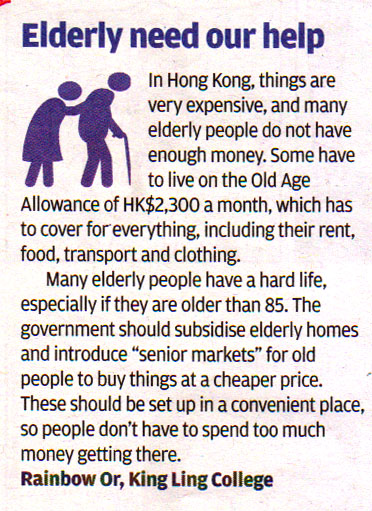
SCMP November 23, 2015
Kelly Cheung 5B
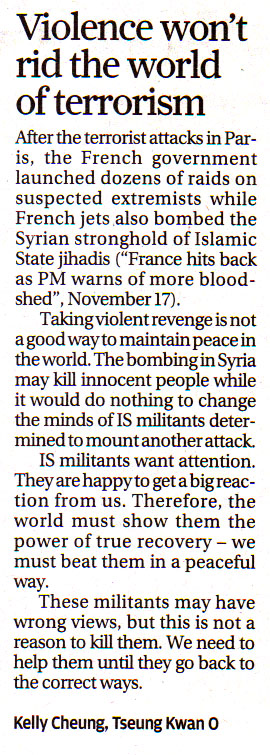
SCMP November 19, 2015
Raymond Lok 5E

SCMP November 11, 2015
Edwin Tong 6E
Jobs may be lost with hours legislation
I refer to the letter by Tam Kit-ching ("In need of a flexible work culture", November 10).
A standard working hours law is an issue that concerns the government and local companies.
Unquestionably, the scheme would be a double-edged sword that brings benefits as well as harm to stakeholders involved, particularly employees.
A reasonable working day helps reduce the risk of accidents arising from fatigue due to long working hours.
Also, people who had to work overtime would be paid overtime under such legislation. At present, many employees get a fixed salary even if they work overtime.
This would be especially beneficial to workers from the grass roots who wanted to do some overtime and so increase their wages.
However, on the downside, some companies which do not want to incur extra expenses might resort to laying off surplus labour or reducing their working hours, so they will end up earning less.
Further, in the face of the increasing operational expenses, such as inflation and the rise in hourly wages, companies might consider substituting the positions of low-skilled workers with machinery. It has to be accepted that unemployment is inevitable.
The government must consider the views of all stakeholders and make thorough deliberations before deciding to enact such a law in the workplace to ensure the well-being of employees and rights of local companies can be safeguarded.
Edwin Tong, Sai Kung |
SCMP November 10, 2015
Chan Hei-yin 3C
Children must have good environment
China is ending its one-child policy because it fears it won't have enough workers as its population ages, but that's only half the story ("Two-child policy too little, too late: demographers", October 30).
First of all, the government should help families who want to have two children, for instance with transport and milk powder.
But if the government really wants its people to have a second child, it should tackle the problems of air and water pollution first, as these problems are quite serious on the mainland. The central government could create tougher laws to ban dirty discharges into the sea, for example, and enforce them strictly.
If the government solves these problems, the two-children policy will become more attractive to people. This will help alleviate the problems of a greying population.
Marco Chan Hei-yin Tseung Kwan O |
SCMP November 8, 2015
Willis Wan Chun-yu 6E
Officials not doing enough on tunnel toll
I refer to your editorial, "Seize chance to review tunnel toll" (November 4).
I, too, disagree with the government's view that cutting the Eastern Harbour Tunnel toll might not help divert traffic from the congested Cross-Harbour Tunnel. Drivers will appreciate being given the choice of which route to take.
I also doubt if the Eastern Harbour Tunnel has reached its full capacity. Seldom do we hear of a traffic congestion near the eastern tunnel. Yet traffic congestion is commonplace at the Cross-Harbour Tunnel.
I believe officials have not done all they can on this issue. If they continue to turn a blind eye, sooner or later, it will become an international laughing stock, just like the closure of the Tsing Ma Bridge a few weeks ago.
Willis Wan Chun-yu, Clear Water Bay |
SCMP November 6, 2015
Christy Wong 6A

Young Post November 2, 2015
Fung Siu-chung 1D
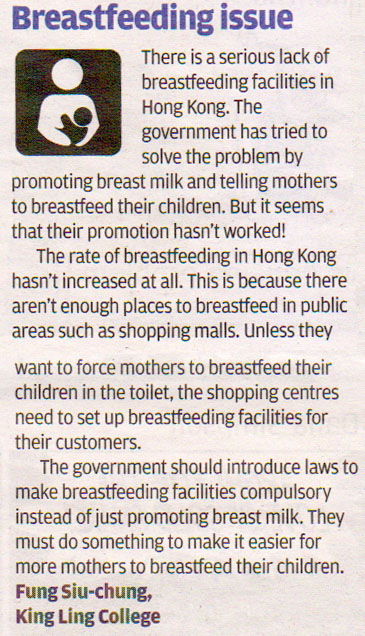
SCMP November 1, 2015
Elvis Yam Kam-hang 6A
Protesters and police need cool heads
Recent protests in Hong Kong have seen police and protesters clash, and we should try to defuse the stand-off.
Protesters should clearly inform the police of their plan in advance, such as the destination and scale of the rally, and how long it will run. They should pledge not to overstep the boundaries set, and in turn receive a pledge from the police that they would not interfere in the protest activity if all goes according to plan.
The government and the police should review the rules for enforcement and prosecution. The administration should ensure that police officers receive training for emotion control, and that the force is committed to the protection of protesters' rights.
The root cure, however, lies in addressing protesters' dissatisfaction. The government must listen and respond to citizens' demands.
Once government credibility is restored, clashes at protests will end.
Elvis Yam Kam-hang, Tiu Keng Leng |
SCMP October 30, 2015
Vivian Lo 4A

Myron Eng Man-him 4D

SCMP October 29, 2015
James Wong Chun-ho 3C

SCMP October 27, 2015
Rainie Chou 6A

Young Post October 26, 2015
Lam Ki-wing 1D
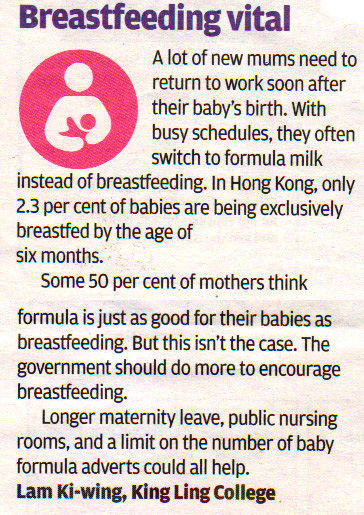
SCMP October 26, 2015
Lum Chi-lok 4C

SCMP October 25, 2015
Mary Ko 4E
Our Chinese language skills are important
It seems that school students in Hong Kong seem to be focusing now on improving their standard of English.
There are many activities related to practising the language, to help them improve their speaking, writing and reading skills. But, they do not appear to be paying as much attention to the subject of Chinese language, even though it is their mother tongue.
Perhaps because of that they may think they do not need to focus on it as much as English.
However, I do not think they should neglect the language. They should recognise the importance of English and Chinese. When they learn more about the language it deepens their knowledge of Chinese culture.
Mary Ko, Tseung Kwan O |
Louis Fung Lam-lap 3B
Let musicians use first and last carriages
I refer to the report ("Sour notes on a sliding scale", October 12) about some musical instruments not being allowed on MTR trains.
Until I read the news reports I did not know MTR staff were taking this action against people trying to board with large musical instruments.
I realise the MTR wants to avoid any accidents. I think the problem can be solved by allowing the musicians to use the first and last carriages of a train.
I hope the MTR Corp will consider this suggestion as I think it will solve the problems the MTR has described. It has to appreciate that not all musicians can afford to travel with their instruments by taxi.
Louis Fung Lam-lap, Sau Mau Ping |
SCMP October 24, 2015
Rainbow Leung Wai-yu 4D
We cannot ignore nursing shortage
There have been a number of medical blunders in public hospitals and I wonder if some have been related to staff shortages.
The shortage of nurses is a problem in hospitals worldwide, even in Singapore.
One nurse has to care for quite a lot of patients and they often have to work long hours, beyond their designated shift.
If nurses are exhausted, then there must surely be a greater risk that there will be a blunder. Sometimes the consequences are not that bad, but sometimes they are serious.
The government cannot turn a blind eye to this shortage. If the workload increases and nurses are exhausted and stressed out, then more of them will leave the public sector. We could see more blunders happening more frequently.
The government has to provide more incentives to tempt people to choose nursing as a career. Youngsters need to be assured that they will have a number of career options within the nursing profession.
Nurses' working conditions must be improved, with caps on the amount of overtime they have to do.
Rainbow Leung Wai-yu, Tseung Kwan O |
SCMP October 22, 2015
Dennis Fan 3B
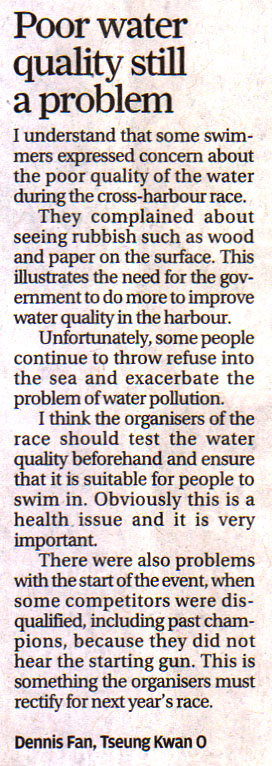
Roy Cheung 6D

SCMP October 21, 2015
Wing Yau 4A
Whole family signed up as organ donors
Chinese traditions have led to a lack of organ donors in Hong Kong, with some people believing that the body should remain intact when they die.
However, in my family, my parents encouraged me to register as an organ donor.
They explained to me the advantages of doing so, and that there was a real need with patients waiting for organs.
In fact my whole family decided to register on the same day.
I am glad that when I die, my organs will be harvested and they can hopefully be used to help patients who are seriously ill.
I wish more Hongkongers could appreciate how important it is to register as an organ donor and realise what a difference it can make in our society.
Wing Yau, Hang Hau |
Daisy Tong 6D
Bosses look at more than exam results
I refer to the article about students who got top marks in their public examinations at school ("Where are they now? 4 former straight-A Hong Kong students reflect on their lives", October, 15).
The article revealed that these four students had followed different paths in the last decade.
They pointed out that when you get extraordinary results in your exams, people have high expectations. But although they have different occupations, they all agree that having the right attitude and passion are keys to success.
Hong Kong is such an exam-oriented society that people believe that results are everything.
It is a very competitive environment, with students trying to outshine their peers in the Hong Kong Diploma of Secondary Education (HKDSE) in order to get one of the coveted places at a local university.
They work hard at their core and elective subjects. Parents share their concerns and teachers organise extra lessons. Everyone involved in the process is under immense pressure.
I think many young people forget a crucial point that the HKDSE examination is only a part of our lifelong journey. Of course, how you do in it will determine which college you get into.
However, exam marks are not the only consideration when a company is considering hiring someone. It will look atthe education level, but also at other abilities and skills that the candidates have.
There is actually a mismatch between the things students learn at school and the skills required in society.
Students need to see the public exams as simply a stage. What will be far more important will be their life experiences and their attitude.
They should not just focus on exam results but recognise the importance of becoming a well-rounded person.
Daisy Tong, Tseung Kwan O |
SCMP October 20, 2015
Chow Lok-yin 6D
Think twice before buying latest model
The new Apple iPhones, the 6s and 6S Plus went on sale in Hong Kong in September and sold out quickly when launched. Whenever a new iPhone goes up for sale, it records high sales in Hong Kong. It is good to see people trying to embrace new technology, but there can be a downside to smartphones.
People from the grass roots and middle class, may struggle financially if they want to purchase the latest Apple device. The 6S sells from just under HK$5,600. Many of them are already struggling to have enough money to pay for the daily necessities.
I am also concerned that some people become too attached to their smartphones. They are involved in less face-to-face communication.
While there is nothing wrong with wanting to own the latest smartphone, people have to recognise the possible pitfalls and use new technology responsibly.
Chow Lok-yin, Sai Kung |
Kathy Ho 4E
Government must curb the criminals
I refer to the report ("Dirty money cases soar as syndicates recruit non-locals", October 12). The number of serious fraud cases involving money laundering in Hong Kong has soared in the first half of this year with HK$456 million laundered through banks. This is more than all of last year.
Hong Kong is recognised around the world as a major international financial centre.
If there are more of these cases here involving criminals and their syndicates, this could hurt Hong Kong's reputation and therefore its economy.
If this happens then more Hong Kong citizens might decide to migrate, taking their expertise and their money with them.
The Hong Kong government needs to recognise there is a problem and it has to act to deal with it.
It must try harder to crack down on these syndicates, break them up and arrest those who are responsible.
If need be it must allocate more resources so that those involved in money laundering scams are brought to justice and are punished for their crimes.
Kathy Ho, Tseung Kwan O |
SCMP October 19, 2015
Louisa Sin 6A
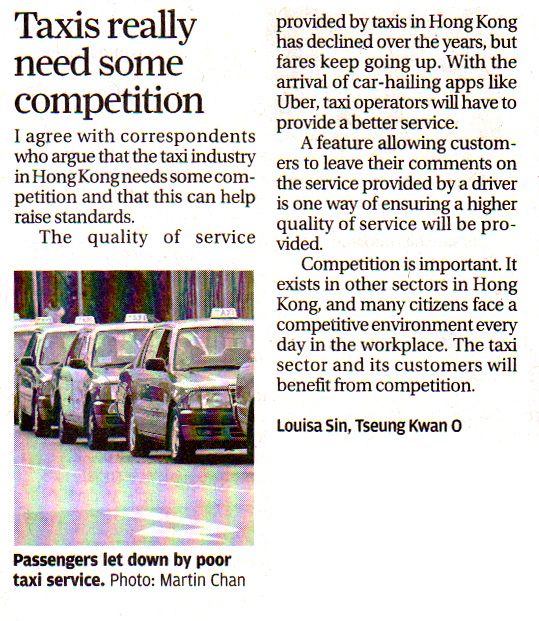
SCMP October 17, 2015
Phoebe Ko 4C
Rote learning not right for preschoolers
I refer to the report "Hong Kong's new breed of kindergartens: no classroom, no uniform, just kids outside playing and having fun in the dirt" (October 13).
The Hong Kong Forest Kindergarten is a nature-based nursery which operates without classrooms and uniforms.
It promotes outdoor playing and exploring nature. This is very different from other kindergartens in Hong Kong.
I totally agree with this kind of preschool education. At a young age, children should not be focusing on memorising knowledge, but should be developing their brains by outdoor activities. This helps them to develop their communication skills.
How can children learn how to communicate if everything they learn is from books? The spoon-feeding educational system is not appropriate for kindergartens.
The government should really be encouraging the kind of education offered by the Forest Kindergarten in Hong Kong if it wants to improve the quality of education that is provided in local schools.
Phoebe Ko, Tseung Kwan O |
Christine Chan 5A
English is still an important language
I refer to Michael Chugani's column ("Time to end our obsession with English" October 6).
I agree with what Chugani said that not many Hong Kong people, even government officials, can speak fluent English.
Also, the English standard is on steady decline in Hong Kong. Compare that with Singapore, where English is widely spoken. In Hong Kong, local people seldom communicate with each other in English.
However, despite falling standards we should not throw in the towel as English is the most widely spoken language in the world.
As a Hong Kong student, I appreciate how important it is to learn English. I use it with my peers at school.
I see the language as giving me the opportunity to integrate with the global community. It is my link with the rest of the world and can help me to broaden my horizons.
More Hongkongers may be learning Putonghua instead.
That is understandable given that our economy depends on the people who come from the mainland and buy products here. But, we should not ignore the importance of English. Surely citizens want to know what is happening in the world.
Young people in Hong Kong have to keep learning English.
Christine Chan, Tseung Kwan O |
Young Post October 16, 2015
Jacky Fung 1B
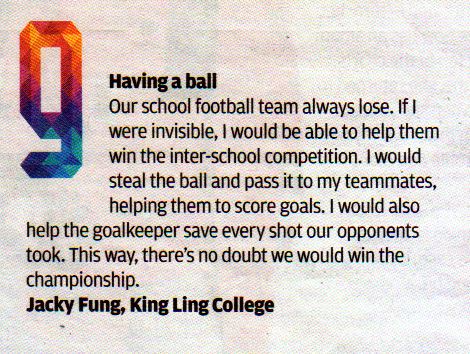
SCMP October 16, 2015
Lee Hiu-ching 6E

Ronnie Tse 4C

SCMP October 15, 2015
Mario Man 4A

SCMP October 14, 2015
May Chong 4A
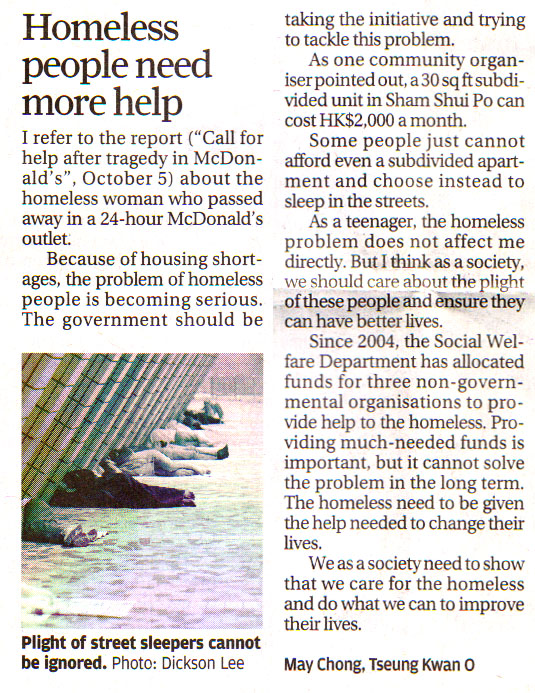
SCMP October 13, 2015
Elvis Yam 6A

Michael Chow 4A
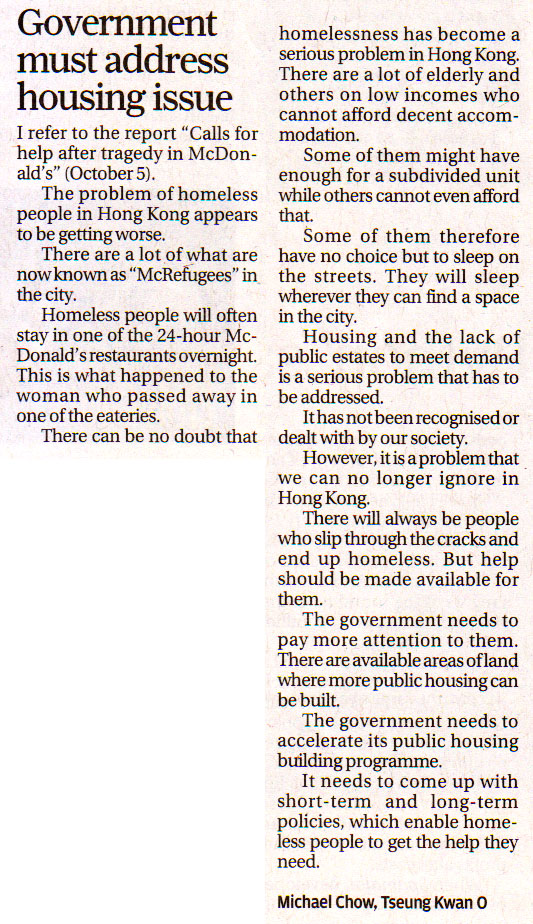
Young Post October 12, 2015
Chloe Ng Sing-yee 1D
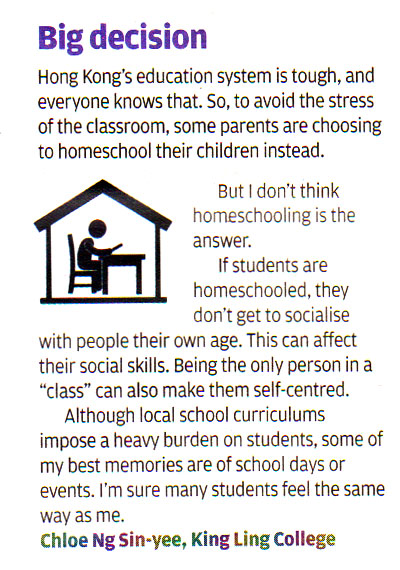
SCMP October 11, 2015
Trisha Tobar 2A
High housing prices expose the poor
I refer to the report ("Calls for help after tragedy in McDonald's", October 5), about the homeless woman who died unnoticed in one of the fast-food chain's 24-hour outlets.
It prompted calls from concerned groups, including NGOs, who urged immediate government steps to help the homeless.
The tragedy highlights the problem of sky-high housing prices in Hong Kong.
Some working homeless earned so little they choose to spend their money on food rather than rent.
It is clear that the government has to act.
As well as providing more emergency shelters for the homeless, it needs to accelerate its public housing building programme.
Trisha Tobar, Sai Kung |
SCMP October 10, 2015
Carly Fung 3D
Adherence to old ways is costing lives
While Hong Kong is a modern, international city many citizens still hold to aspects of traditional Chinese culture and will not register as organ donors.
Only a few patients are lucky enough to get the organ transplant they need here. It is a shame that so many citizens are not willing to accept new ideas.
There must be more publicity through the media to try and raise the awareness of citizens.
They need to realise the human cost of a lack of donors, so that they know about those patients who passed away because the hospital could not find a donor.
Carly Fung, Tseung Kwan O |
SCMP October 9, 2015
Cheung Chun-sing 6D
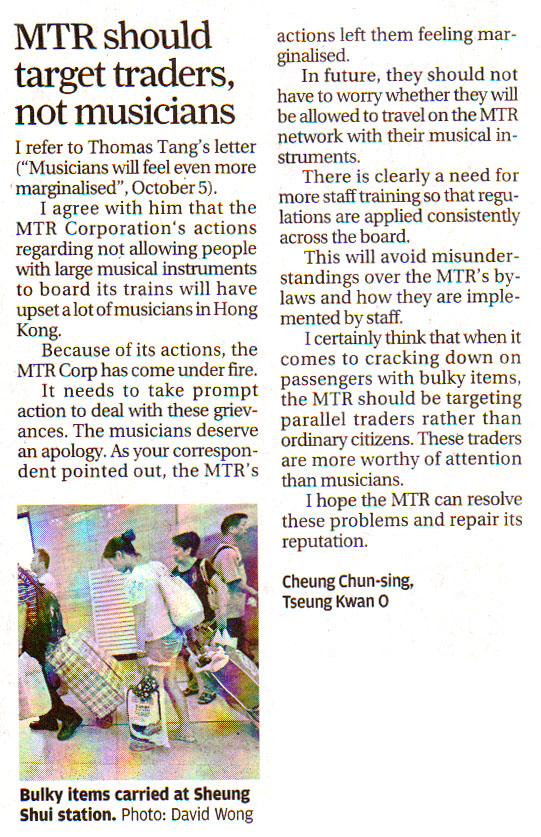
Rainbow Leung Wai-yu 4D

SCMP October 8, 2015
Yuki Wong 5C
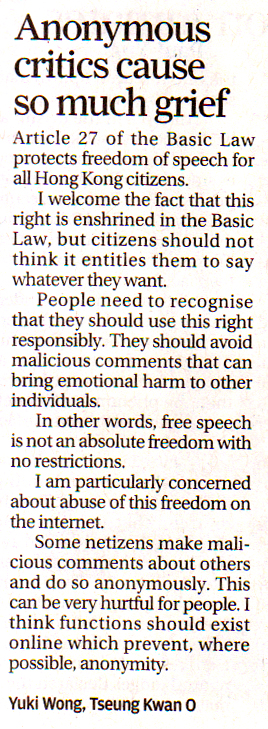
SCMP October 6, 2015
Liz Chan Wing 3C

Young Post October 5, 2015
Lee Wing-yi 4A
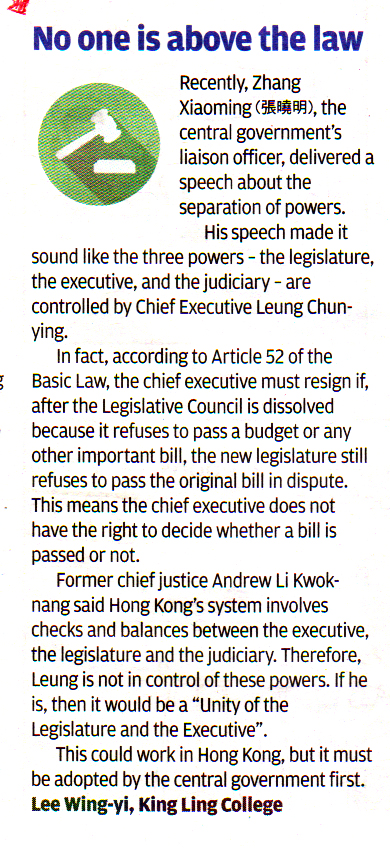
SCMP October 5, 2015
Michael Chow 4A

SCMP October 3, 2015
Kylie Kwan 6A
Taxis and Uber can cooperate
I agree with correspondents who say that taxi drivers need to have more competition.
With more competition, they can begin to examine the problems the public has with the services they offer and hopefully try to make the necessary improvements.
For example, they could do a whole lot better when it comes to attitude and communication skills. If they raise their game, they will get more passengers and more income.
I think car-hailing app Uber and taxis can coexist in Hong Kong and cooperate with each other. They can meet different needs.
Also, Uber will never be as extensive as the taxi services, which have a network covering the whole of Hong Kong.
That is why I see them as a perfect match that will offer greater variety for visitors.
Kylie Kwan, Tseung Kwan O |
Melody Ho 3A
Change law to encourage more donors
I refer to the letter by Fong Chung-yin ("Donation of organs should be promoted", September 19).
Many Chinese in Hong Kong believe that it shows a lack of respect for the dead if their organs are harvested for organ transplants. Therefore they are reluctant to sign up on the organ donor register.
I think we could see an increase in the number of donors through legislation.
The government could introduce a law which says that opting out and declining to be on the donor register would reduce your chances of getting a transplant if you needed. Those who were registered would have higher priority in receiving a deceased donor organ if they needed a transplant.
This is what Singapore did when it brought in the Human Organ Transplant Act in 1987.
It has seen an increase in the number of donors since it introduced this priority system.
I think if Hong Kong introduced legislation which included this priority system, we would see an increase in the number of donors.
This is a very important issue that the government must deal with.
Melody Ho, Tseung Kwan O |
SCMP October 1, 2015
Oscar Lo 3C
Teens need smartphone timetable
With advances in new technology, smartphones have become increasingly important to the daily lives of many citizens.
You see teenagers using their smartphone virtually all the time wherever they may be. A lot of teens spend an entire journey on the MTR looking at these smartphones. I think with such overuse, they are developing bad habits.
There is a risk that some of them will become addicted to their smartphones. They stare at the screens and do not care about what is happening around them.
These young people need to think about the health implications. Spending too long looking at the screens is bad for their eyes.
They need to learn to manage the time they spend on these phones, with a timetable that they stick to.
While they should be allowed to bring the phone to school, because they may need to get in touch with their parents, if they play with it in class, the teacher should confiscate it.
Oscar Lo, Tseung Kwan O |
SCMP September 30, 2015
Edwin Chung Yiu-king 4D
Fight goes on for universal suffrage
I refer to the report "Keep torch of democracy alive, Occupy leaders tell Hongkongers" (September 28).
Last year's Umbrella Movement, which lasted for 79 days, was a meaningful event for Hongkongers as they sought to ensure a democratic future for the city.
However, it did not achieve its goals. One year on and Hongkongers are still fighting for universal suffrage. It is a topic that the government of Hong Kong and Beijing now seem to want to avoid.
This is the wrong approach to take. Both the local and central governments should listen to Hong Kong citizens. If they do not, then there will be more political protests like the Umbrella Movement and we will face a future of disunity as we approach 2047.
There are issues which need to be resolved if Hong Kong is to have a bright future.
Edwin Chung Yiu-king, Yau Tong |
Wing Kwok 4A
People enjoyed much greener festival
Mooncakes are an integral part the Mid-Autumn Festival.
However, I am glad that more consumers are now being environmentally friendly. In the past, they always bought mooncakes in tins which then ended up in landfills.
However, many people now buy them in paper or cardboard boxes which can be recycled, or other material that is biodegradable.
Mooncake firms have also cooperated, with one company this year offering a chocolate mooncake to customers who bought the eco-friendly containers.
This will lead to a reduction in the quantities of tin containers that are discarded.
Mooncakes are delicious. However, I also noted that people are becoming more health conscious and are eating fewer of them during the festival because they do contain a lot of fat.
Wing Kwok, Tseung Kwan O |
SCMP September 30, 2015
Edwin Chung Yiu-king 4D
Fight goes on for universal suffrage
I refer to the report "Keep torch of democracy alive, Occupy leaders tell Hongkongers" (September 28).
Last year's Umbrella Movement, which lasted for 79 days, was a meaningful event for Hongkongers as they sought to ensure a democratic future for the city.
However, it did not achieve its goals. One year on and Hongkongers are still fighting for universal suffrage. It is a topic that the government of Hong Kong and Beijing now seem to want to avoid.
This is the wrong approach to take. Both the local and central governments should listen to Hong Kong citizens. If they do not, then there will be more political protests like the Umbrella Movement and we will face a future of disunity as we approach 2047.
There are issues which need to be resolved if Hong Kong is to have a bright future.
Edwin Chung Yiu-king, Yau Tong |
SCMP September 28, 2015
Tutti Sung 4D
Too many workers eat junk food
Many Hongkongers work long hours and they often have to eat out. This can lead to them having an unhealthy diet.
Also, after a long day in the office, few of them have time for any sports activities. And even if they do have spare time, they will probably spend it with friends and families.
I appreciate they are probably under a lot of stress.
However, the government has to try and encourage more citizens to lead healthier lives. It should create an advertising campaign and put up posters encouraging promoting the importance of sport.
Being overweight is a problem with many teenagers.
Parents must try to ensure their children are getting a balanced diet and some exercise.
Tutti Sung, Tseung Kwan O |
SCMP September 27, 2015
Ko Kwan-ho 4D
Border traders a sore point getting worse
I refer to the report ("Parallel traders back in Hong Kong after 'useless' four-day crackdown by mainland Chinese authorities", September 19).
In my opinion, the problem of cross-border trade is becoming more serious.
Small shops in affected areas near the border have changed to pharmacies and electronics stores to meet the demands of mainland visitors.
Although those kinds of shops can improve the economy of Hong Kong, it will definitely affect the retail sector.
Besides, in recent years there have been increasing numbers of parallel traders coming into Hong Kong. Many purchase milk powder, which can be resold for profit across the border. However, it causes the problem of lack of stock and some local parents complain they can't buy for their children.
The initiative by the authorities in Shenzhen to limit cross-border trips for its permanent residents was a good move. Its recent brief crackdown on parallel traders must also be welcomed but it doesn't go far enough. The authorities on both sides of the border must work together and come up with appropriate measures to solve this problem of parallel traders, otherwise it will affect local parents and local shops.
Ko Kwan-ho, Tseung Kwan O |
SCMP September 25, 2015
Eddie Wong Ting-yiu 4D
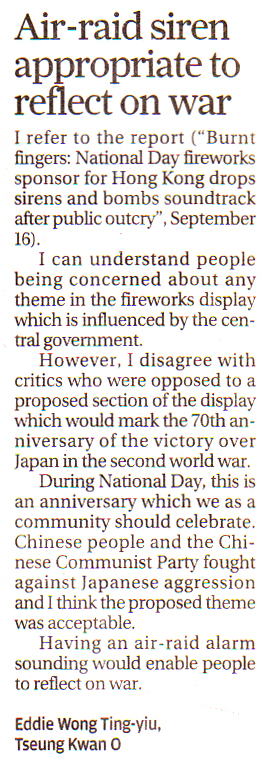
Melody Ho 3A

SCMP September 24, 2015
Katrina Lo 3C
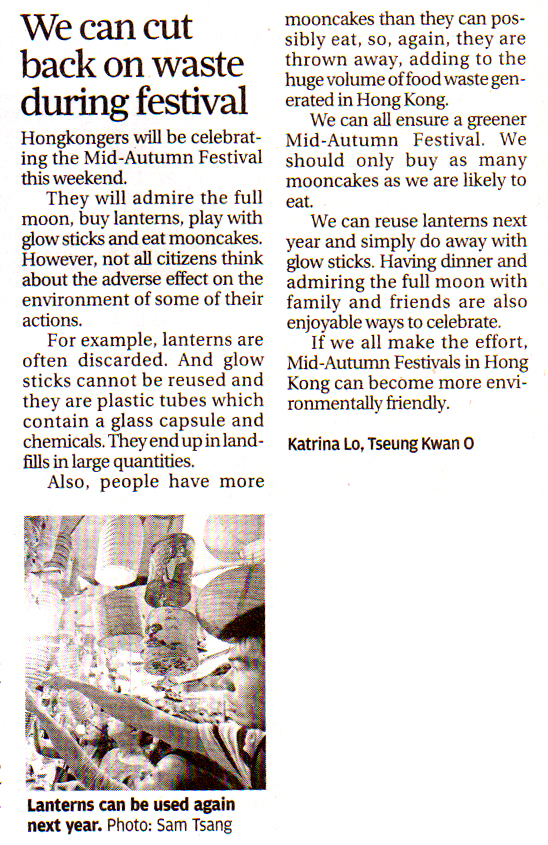
SCMP September 23, 2015
Esther chan 4D
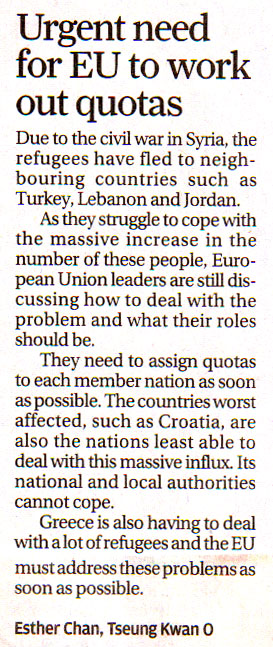
SCMP September 22, 2015
Sammi Lo Wing-sum 4D

Myron Eng Man-him 4D

Kiki Tsoi 6D
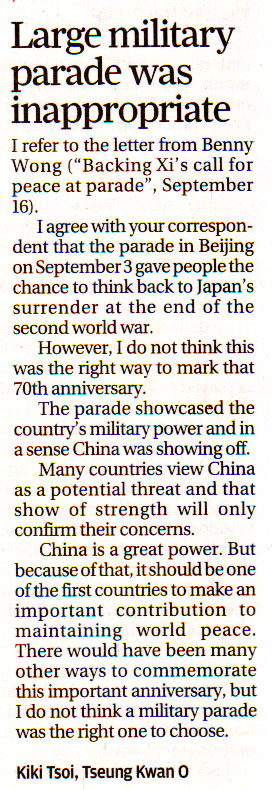
Young Post September 21, 2015
Jenny Sit 4A

SCMP September 21, 2015
Ng Tsz-hin 3B
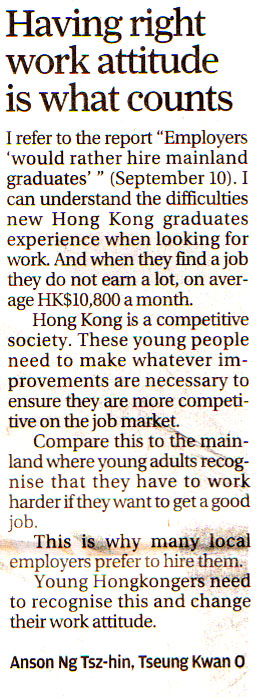
SCMP September 20, 2015
Stephen Tang 4E
More electric buses will clean up air
I entirely agree with the decision made by New World First Bus and Citybus to have five more electric buses on our roads by the end of the year.
Electric buses can reduce pollution significantly because there are no emissions, and Hong Kong already has enough air pollution from exhaust fumes. So not only can these buses transport people, but they are also environmentally friendly.
However, every coin has two sides. There are disadvantages, one of which is that Hong Kong lacks charging facilities for electric vehicles. The government wants to promote electric buses, but it is not providing enough charging stations to help encourage that expansion.
Stephen Tang, Tseung Kwan O |
Mario Man Yuk-kin 4A
Horizons open when English skills improve
I refer to the report ("Officials urged to do more to promote English", September 11).
Many teachers want students to understand English and be able to speak it fluently. Shortcomings in English may have a negative impact on their future careers, because a company may not hire people who do not have good English skills.
It's important that students learn proper English. Teenagers may write in English when they send messages to their friends using their mobile phones, but if they get stuck, they'll use Chinese slang. What good does that do when, they make so many grammatical mistakes on an English composition that a teacher requires them to rewrite it?
I agree with legislative councillor Michael Tien Puk-sun's statement that "The future for Hong Kong is technology, and for [that] to thrive, we need good English". As English is an international language, Hongkongers should learn it so that when foreigners ask them questions, they can reply with confidence.
The Education Bureau can impress the importance of using English through advertisements through radio, and television.
Moreover, it would be a good idea if teachers required students to use English as often as possible. If they are practising it frequently, not only can they get good grades in speaking assessments, but they can communicate effectively.
Young people should realise that having a good command of English will open doors for them. It will increase their chances of getting a good job. That should be enough incentive right there.
Mario Man Yuk-kin, Tseung Kwan O |
Cheung Nok-wai 6E
Positive side of assisted suicide
The California state legislature has passed a bill allowing terminally ill patients to end their lives with a doctor's assistance. To some, that may sound too pessimistic, but to say that terminating one's life is a negative thing is subjective.
A patient in the last stage of lymphatic cancer may feel it liberates their family from the pressure of having to make a difficult decision, and takes away the pain of seeing a loved one suffer.
Until a cure can be found, helping them to end the pain may be the only thing society can do for them now.
Nobody should have to live with pain longer than necessary. Assisted suicide, done properly with a doctor at hand, is an option people should have.
Cheung Nok-wai, Tseung Kwan O |
SCMP September 19, 2015
Lee Wing-yi 4A
Basic Law conflict must be resolved
I refer to the speech by Zhang Xiaoming , chief of the central government's liaison office in Hong Kong, about the separation of powers in Hong Kong ("Authority of the chief executive is above all: Beijing", September 13).
I do not accept his argument that the chief executive is "above the executive, legislative and judicial institutions".
There is no law which specifically states the three institutions are separate.
However, Article 52 of the Basic Law states that the chief executive must resign if the Legislative Council is dissolved after the leader refuses to sign a bill it has passed and the new Legco again passes it. In other words, only Legco will decide whether to pass a piece of legislation, not the chief executive.
I agree with former chief justice Andrew Li Kwok-nang, who, when referring to the Hong Kong system, talked of "checks and balances between the executive, the legislature and the judiciary" branches ("Beijing official's view contradicts city's top judges", September 13).
This matter must be resolved by the Hong Kong government as soon as possible.
Lee Wing-yi, Tseung Kwan O |
Roy Cheung 6D
Soccer team deserving of our support
The Hong Kong soccer team has been in the news recently because of qualifying matches for the Fifa World Cup in Russia in 2018.
The team attracted a lot of public attention when it drew with China. And although it narrowly lost its match against Qatar, Hong Kong citizens are still proud of the team and will continue to support it in its upcoming qualifiers.
However, the team does not get as much support as I would like to see.
Many Hongkongers think the quality of local soccer is poor and prefer to watch the more popular leagues from abroad.
However, all citizens need to recognise that they live here in Hong Kong.
If they do not turn up to the stadium to support the Hong Kong team, then who will?
I accept that the standard of soccer played here may not be as high as elsewhere, but that is no reason not to show our support. After all, Hong Kong is our home.
I think parents should go along with their children. Families should be out in force to back the Hong Kong team.
I hope that over time, standards will improve and the team will become a more potent force in future qualifiers.
In the meantime, let's go to the stadium for the next World Cup qualifier and back our team. They could really do with our support.
Roy Cheung, Lam Tin |
Suki Lee 3D
Spending big on education no guarantee
I refer to the report ("Six private schools push fees up more than 20pc", September 10).
I think fees in private schools in Hong Kong are too high, and I am sure they have become unaffordable for some parents. Pushing fees up does not necessarily mean the quality of teaching will improve.
However, many parents send their children to these schools or abroad, rather than have them taught in the local education system.
Some of these parents seem to think that the more money they spend, the better the chances of their sons and daughters achieving good academic results. But you cannot always buy academic excellence.
Parents do not always understand this, and the more they spend, the greater the pressure they impose on their children. They are aware of how much is being spent to educate them and try even harder, even if expectations exceed what they can realistically achieve.
Private schools should be honest during the enrolment process and explain that no matter how much is spent on such things as fees, textbooks and extracurricular activities, this is no guarantee of success.
Students should simply be encouraged to try their best without having unrealistic targets set for them.
The government also needs to review its overall education policy, especially with competition for university places being so fierce.
Suki Lee, Hang Hau |
Lam Pak-ning 4A
Syrian asylum seekers' cases more urgent
I am concerned that the Immigration Department will treat future applications for asylum by Syrians the same way as any other applicant ("Syrian in HK seeks asylum status", September 9).
This could mean that some Syrians, if they come and their application fails, could end up being repatriated. Applications from Syrian refugees should be seen as urgent cases.
They have fled their country to avoid the civil war there and are seeking help in places they know nothing about. These are cases which deserve a humanitarian response.
Hong Kong has experience in dealing with a lot of refugees. Thousands of Vietnamese boat people sought asylum here in the 1980s. Many of them were eventually relocated in the West, and some still live here. There are around 10,000 people here (from different countries) seeking refugee status, this is a much smaller number than the Vietnamese.
If more Syrians come here and seek shelter, the Hong Kong government has sufficient resources to help them, and we should do so.
This international city has a responsibility to help people who have fled conflicts such as the Syrian civil war.
Lam Pak-ning, Tseung Kwan O |
SCMP September 18, 2015
Chan Yik-tat 6D

Michelle Mai 3D

SCMP September 17, 2015
Ivy Ho 6D

Tsoi Wing-ki 6D

Carol Mo Ka-wai 4E

SCMP September 16, 2015
Benny Wong 6D

Summer Cheng 3B
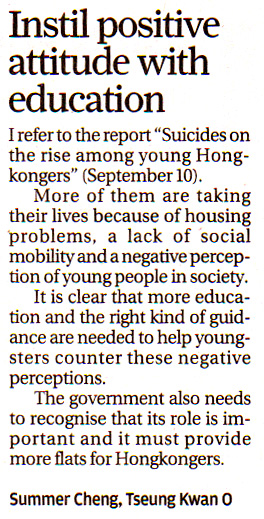
SCMP September 15, 2015
Chan Yuen-yi 4D
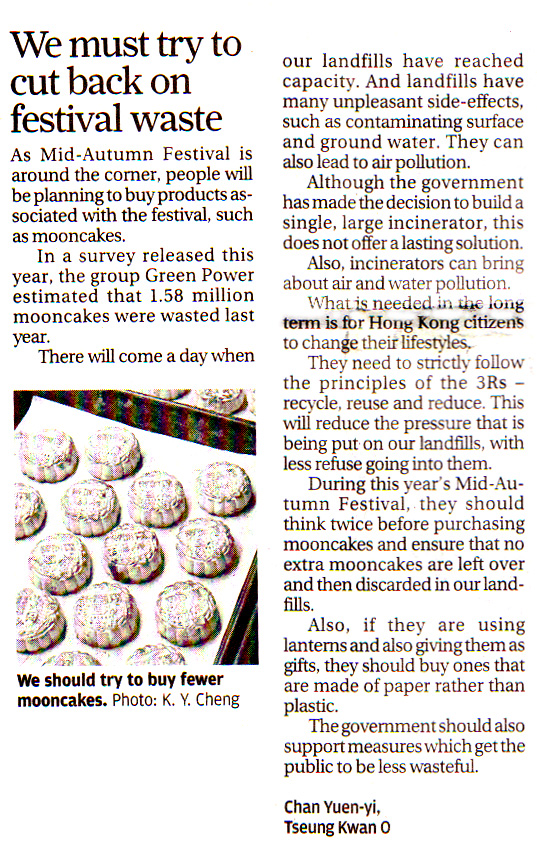
Kristie Ko 4A

Edwin Tong 6E

Wing Kwok 4A
 =
=
SCMP September 14, 2015
Katie Lo 4D

Justin Lu Chun-wa 5E

SCMP September 13, 2015
Macy Leung Tan-ting 6B
Use internet to get more shoppers
I am concerned about the problem of light pollution in Hong Kong. It is particularly bad in certain urban areas, such as Central and Mong Kok.
Many shopkeepers have brightly illuminated signs to attract customers and I am sure complaints from nearby residents are increasing. These retailers and the government should try to find an acceptable solution.
A normal sign that is not brightly lit might stand out. Bright colours applied creatively and better designs, could make a sign more attractive to potential customers than an unattractive neon sign.
Also, shopkeepers should look at other ways to attract customers such as promoting their business on the internet. More people are now using social network sites like Facebook.
The government must now consider legislation to curb this problem. A law is needed which has controls to curb light pollution and which can lead to retailers being penalised if signs are too brightly lit.
Macy Leung Tan-ting, Tseung Kwan O |
Nicole Wong Yuen-shan 5A
Education can help curb animal abuse
I am concerned about the scale of mistreatment of animals in Hong Kong and the problem seems to be getting worse.
It is astonishing that some people still seem to treat their pets as a kind of toy, failing to realise that this a lifetime commitment.
They do not understand that no matter how tired or busy they are, their pet still needs looking after. It still requires food, water, exercise and companionship.
I think there needs to be better education about care of animals and this should start with teenagers. Then they can learn about how to care properly for animals before they become pet owners.
Nicole Wong Yuen-shan, Tseung Kwan O |
SCMP September 12, 2015
Chloe Chan 5D
Time to get rid of trams in Central
The trams have been in Hong Kong since 1904 and started operating to cope with increased demand.
With an upsurge in population from the early 1880s, horse-driven carriages and rickshaws could not cope with the needs of residents on Hong Kong Island. So the Legislative Council cleared the way for trams to be allowed on the roads.
Over the decades traffic patterns change and mature. Consequently the number of passengers using the trams has dropped.
A retired government planner has called on the tram system to be axed between Central and Admiralty to relieve congestion problems in Central.
He points to the opening of the MTR's West Island Line in December which means there is no need for the trams on that route.
I agree that the trams on this part of the route should be cancelled, because I think it will improve traffic conditions.
There are enough public transport options available to people, including the MTR, buses and minibuses. They go to the same locations as the trams.
With the trams removed, more efficient use can be made of the available land and, as I said, I believe we would see an improvement in the difficult traffic conditions in Central.
Chloe Chan, Tseung Kwan O
|
SCMP September 11, 2015
Lee Tsz-chung 4D

Carol Mo Ka-wai 4E

SCMP September 10, 2015
Cindy Yuen Wing-sze 6B

Agnes Tsoi 6B

Yumi Wong Sheung-yi 6B

Jerry Yu 5B

SCMP September 9, 2015
Lee Hiu-ching 6E

SCMP September 8, 2015
Brian Lau 4E

Katie Sze 2D

SCMP September 7, 2015
Tiffany Chow 4D
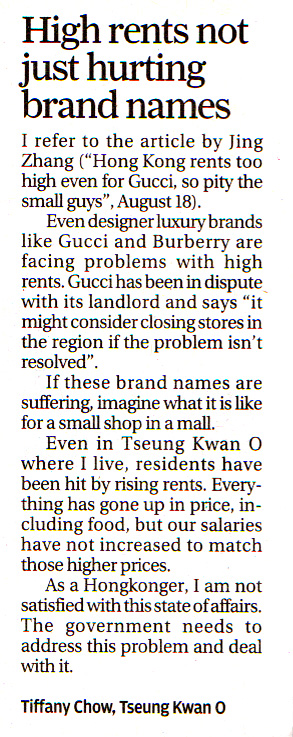
Wu Hiu-tek 2B
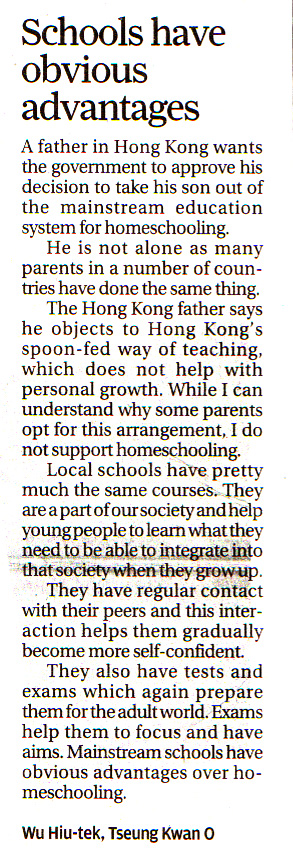
SCMP September 6, 2015
Dickens Mok 4C
Extended Avenue of Stars: Why?
In 2011, CNN named the Avenue of Stars as one of the world's 12 worst tourist traps and described it as "underwhelming". As a Hongkonger, I don't think the Avenue of Stars is worth visiting because it only has handprints of famous movie stars, statues and some shops. I oppose its extension. The process of extending it will surely generate more pollution in Tsim Sha Tsui, and not only noise and air pollution, but it also will create a more crowded environment and traffic congestion. Since the extended Avenue of Stars will reach to the Tsim Sha Tsui Promenade, it is going to affect access to it. Bus stops could change, too. I hope the government can plan the project well before the construction process begins.
Dickens Mok, Tseung Kwan O |
Benson Wong Tat-hin 3A
Teens missing out using their mobile devices
I agree with correspondents your commentators who have referred to the problem of people who use their smartphones incessantly and have become addicted to them.
Most teenagers and adults have their own electronic devices and chat with others or surf or play games. Many of them seem only to focus on their phones and are unaware of what is going on around them.
I was one of the "looking-down" generation last year, but came to regret the time lost to do other more important things such as study.
I also noticed that my speaking skills were slipping and decided that enough was enough. I decided to no longer be a member of the looking-down generation. Some teens are so obsessed with looking at their devices that they are glued to the screens and sometimes collide with people while walking in the street.
We should not focus on our smartphones, but instead focus on what we need to do in our daily lives. We must have full control over them rather than letting them control us.
Benson Wong Tat-hin, Tseung Kwan O
|
SCMP September 5, 2015
Christy Lam 3D
Children not learning how to interact
Years ago, and before the widespread use of smartphones, you would see children having fun with their parents and friends, for example, in playgrounds, theme parks, or when learning to ride a bicycle.
However, now so many adults seem to spend a lot of time focused on their mobiles. And the children are playing games on their mobiles or watching videos on YouTube.
This is really a fundamental change in society. It may obstruct the healthy development of some children, so that they could face difficulties later in their lives.
As they spend so much time on different electronic devices, they will talk less with peers and family members.
This could mean they grow up with poor communication skills.
They will not have learned properly how to interact with other people. And if they are staying indoors, on computers most of the time, they will not get enough exercise.
Children who spend a lot of time on their smartphones may be influenced by parents who are doing the same thing. After all, they are very impressionable.
My smartphone is less important than playing volleyball with my friends, shopping with my parents or cooking.
Of course, I use the phone to find important information, but updating Facebook or Instagram is a waste of time.
Life is short. We should treasure the time we can spend with the people we love.
To parents, I would say you must make the effort to pay more attention to your children and less to your mobiles. They are cuter than your phone.
Christy Lam, Tseung Kwan O |
SCMP September 4, 2015
Haley Yu 2D

Chris Lam 3D

SCMP September 3, 2015
Phoebe Ko 4C
Rote-learning system is not helpful
I refer to the report, "Is Hong Kong's education 'spoon-fed?' Parents to meet officials over bid to have son educated outside mainstream system" (August 27).
The spoon-feeding accusation is valid, with students memorising information but not really learning. That should not be the purpose of an education system.
Students' priority is to memorise enough to be able to pass all the tests and exams they are forced to sit. They follow their teachers' instructions rather than trying to show any initiative.
I would like to see youngsters in Hong Kong trying to be more independent in their studies.
They need to learn to do research by themselves and use their own initiative to acquire knowledge.
In an academic sense, they must be able to stand on their own two feet.
They have a better chance of doing this if the education system is reformed. Teachers should encourage them to learn on their own.
Phoebe Ko, Tseung Kwan O |
Michelle Mai 3D
Advantages of mainstream schooling
I am writing about the father in Hong Kong who has decided to take his 11-year-old son out of the mainstream education system in favour of homeschooling.
I recognise how vital it is to make the right choices, because we cannot underestimate the importance of education. However, I do not think this was the right choice.
The Education Bureau has two reasons for wanting children in Hong Kong to study in school.
First of all, their schooling will have a profound effect on their future. If their parents are allowed to elect homeschooling, these children will lose the opportunity to interact with peers in a school environment.
The chance to meet new friends and communicate on a regular basis with other children will have been lost.
This might have a detrimental effect on their mental health and undermine their character development.
Second, people learn at different rates. Some students will learn at a fast rate and others will be slower.
Teachers are able to help the slower youngsters in the classroom environment and ensure that all of them have the chance to learn all the material that is being taught.
Teachers can check this is being achieved by various methods such as territory-wide system assessment.
If students are being homeschooled, the bureau is unable to check the progress they are making.
Clearly, it is better for children to be in school.
Michelle Mai, Sau Mau Ping |
Wong Hiu-yan 3C
Standing still is safest option on escalator
There have been news reports in the last week about the correct etiquette when on an escalator.
In Japan, 51 railway operators and airport-related firms have joined forces to support a campaign to get people to stand still on escalators.
The MTR Corporation has launched a similar campaign.
Some people who want to finish their journey faster like to walk up or down escalators. Others prefer to stay still.
In order to maintain good order on escalators and make them as safe to use as possible, we should stay still.
Some might ask, if you are standing still, should you stand on the right or left side?
The new rules proposes for Japan are that you should stand still on the right and left sides.
In other words, you should stand where you like.
I think this is a good idea and it will reduce accident rates on escalators and help those who already prefer not to walk.
I can understand those who are opposed to this idea of all commuters remaining stationary.
They will argue that they always walk on escalators because standing still is a waste of time. As someone once said, "You have eternity to rest when you die."
I do appreciate that point of view, but my well-being, and even my life, are more important than saving some time. Standing still and "wasting" that valuable time could stop you getting hurt.
Hongkongers who are in a rush and always walk up and down escalators increase their risk of sustaining an injury.
Wong Hiu-yan, Tseung Kwan O |
SCMP September 2, 2015
Zoe Chung Ka-man 3D

Sandy Chan Lap-kiu 4E

Carman Cheung Cheuk-ping 5A
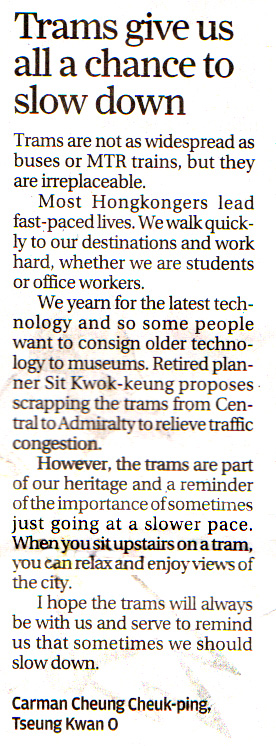
SCMP September 1, 2015
Venice Lam 4B
Abandoned babies a real tragedy
Because of the central government's one-child policy, mainland China grapples with the problem of abandoned children.
When a family has a second child, some parents will choose to abandon or even kill the baby.
Some parents might also abandon the child, even if it is the first one, if it has been born disabled. The number of abandoned children on the mainland is significant.
Last week, a newborn girl was rescued from a public bathroom in Beijing, where police found her wedged face down.
Babies and disabled children do not deserve to be treated in this way.
The central government has a duty to help them. I also think that people living outside the mainland have an important role to play.
When we can afford to, we should be willing to donate money to mainland orphanages so they can buy whatever equipment they need to help these children. More couples, again if they can afford to, should think about adopting a baby from one of the orphanages.
Parents have to recognise that what they are doing is terribly wrong when they abandon a child.
Venice Lam, Tseung Kwan O |
SCMP August 30, 2015
Jason Chuang 4A
Tianjin blasts expose lack of transparency
I am writing to complain about the central government's handling of the r Tianjin blasts.
Firstly, before the blasts, the government did not do enough to monitor the Ruihai International Logistics, where the explosion took place.
As documents show, this factory stored tonnes of materials that are categorised as "dangerous". How could the relevant authorities permit it to be built right beside a residential area in Tianjin?
Moreover, this factory stored more than 70 times the permitted amount of sodium cyanide. The company lacked essential safety equipment and procedures to handle such an emergency but undoubtedly, the government is to blame for its lack of inspections.
Secondly, the transparency of this incident and the government's research is disappointingly low. Some mainlanders criticised slow media updates and some netizen complaints were censored by the government.
In conclusion, lack of transparency has become a trademark of the Chinese government and again in the Tianjin blasts. I hope the Beijing can change its attitude and actions.
Jason Chuang, Tseung Kwan O |
Philip Leung 5E
'Ding-dings' not to blame for traffic jams
I refer to the article ("Locals rail against plan to scrap trams", August 21). I don't think that getting rid of trams can help improve the traffic flows on Hong Kong Island.
According to retired town planner Sit Kwok-keung, trams occupied about 30 per cent of the surface area of the roads where they operated and they are the main cause of traffic congestion.
I've been to Central and see many private cars and vans parked on the side of the roads. Other motorists are forced to drive on the track of the trams and as a result, the trams have to stop frequently in order to avoid accidents.
The main reason for traffic congestion is that too many private cars carrying few passengers, or none, are clogging the roads.
A report by Friends of the Earth in May showed that more than 40 per cent of the cars driving on the road in Central in peak times are private cars. Trams occupied no more than 5 per cent. I hope the point is clear.
Actually, trams have been with us for more than 110 years. It is a transport mode beloved by many Hongkongers. These "ding-dings" are always an important option for residents. The government should not remove them.
Philip Leung, Tseung Kwan O |
SCMP August 29, 2015
Karen Chan 4B
Backing idea for green oasis on road
Des Voeux Road Central is in the heart of the city's business district.
It is crammed with shops and offices, and buses and other vehicles take up every spare inch of road, and pedestrians fill the pavements.
Should pedestrians really have to endure such a crowded environment? A group of planners clearly does not think they should have to and last year published a study proposing a bus and car-free Des Voeux Road Central.
Under the plan, only trams and necessary vehicular traffic such as delivery vans and emergency vehicles would be allowed to use the road.
There would be sitting-out areas and landscaped features.
I really support the ideas put forward in this study. It would lower air pollution in Des Voeux Road Central and create a better environment for pedestrians and for office workers wanting to relax during lunch breaks.
Pedestrian zones have been recognised as an important element in urban planning and should be seen as an integral part of Hong Kong as Asia's world city. This bus-free zone would improve the city's image abroad.
Karen Chan, Tseung Kwan O |
SCMP August 28, 2015
Sammi Lo 4D
More electric vehicles can help air quality
I refer to the article by Paul Stapleton ("Raise the tax on petrol to help clean up Hong Kong's air", August 26).
With lower oil prices, more people are purchasing cars and this makes air quality worse. There are also seasonal changes regarding air pollution.
The government now requires ships to switch to low-sulphur fuel and it also has the no-idling engine law for motorists.
Those measures help but more must be done. Mr Stapleton suggests raising the tax on petrol by at least a couple of cents a litre.
This could encourage owners of expensive vehicles which use a lot of petrol to reduce the trips in their cars. Hopefully, an increasing number of motorists would choose to take public transport more frequently.
I would also like to see the government encouraging greater use of electric vehicles in Hong Kong.
They emit no pollutants. The administration could ensure there are far more charging points throughout the city and also garages with mechanics who can repair and maintain electric vehicles.
More electric vehicles should be seen as a long-term way of reducing levels of air pollution.
I would also support raising registration taxes for vehicles. This might put off some individuals from buying cars in the first place and so we would see fewer of them on the roads.
Sammi Lo, Sai Kung |
SCMP August 27, 2015
Ling Koo 5E
E-cigarettes ban may not be the answer
The debate on whether to ban electronic cigarettes in Hong Kong has become controversial.
Some parents and teachers are concerned that adolescents are vulnerable.
They might treat e-cigarettes as a toy and could easily become addicted. Manufacturers of these products say that any objections to e-cigarettes must be based on scientific proof.
Other options should be looked at before a decision is made to bring in tighter regulations for the sale e-cigarettes.
Claims have been made e-cigarettes could help smokers quit. But a survey revealed that some primary school students had tried them, as have teenagers.
I think they do this because they lack knowledge about these products and the possible risks. It is therefore up to parents and teachers to raise their levels of awareness.
The government can help with an advertising campaign encouraging teens to stay non-smokers.
I think educating people about the possible risks is another way for the government to go other than implementing a total sales ban in Hong Kong.
It is really about schools and parents and the government cooperating.
If they can all work together, they can navigate susceptible youngsters onto the right road.
If they were able to do this there would be a dramatic reduction in incorrect usage of e-cigarettes by adolescents.
Ling Koo, Hang Hau |
Oscar Ko 4D
Tourist boats can injure dolphins
The government has to strike the right balance between allowing tourists to see Chinese white dolphins, but ensuring the dolphins are also protected.
Cruises to see them are becoming increasingly popular, but if there are too many of these boats going to their habitat, then it puts the dolphins at risk, and they can be hurt or even killed by the boats' propellers.
The government has to recognise there is a problem and find a way to deal with it.
It should limit the number of licence plates it issues to boats which have been given permission to organise these sightseeing cruises.
It could also reduce the risk of accidents if it improved water quality.
This would reduce the number of people who could go on these trips and could hurt the tourism sector.
Officials can solve this by building a sightseeing pavilion at an appropriate vantage point where people can see the dolphins.
The cruise companies could still make an income by taking the tourists to this pavilion where they could have good views without any risk to the dolphins.
Oscar Ko, Tseung Kwan O |
Angel Cheung 5C
Many elderly struggling to survive
I agree with Alex Lo ("Much more must be done for our elderly", August 17), that the government should be providing more help to the city's pensioners.
Lo quotes a government survey saying a retired person earns just HK$2,000 a month. This isn't enough for one person. Once basic utilities are paid - electricity, gas and water - not much is left.
Hong Kong clearly has a serious ageing problem. The government can delay the statutory age of retirement and encourage public acceptance that people should be allowed to work to a later age.
Many older employees want to keep working, because, for example, they do not have enough money to retire at 60. And surely the government could help to provide them with more job opportunities.
It also needs to ensure more affordable housing is made available to them. So many find accommodation to be too expensive.
Angel Cheung, Tseung Kwan O
|
SCMP August 26, 2015
Melody Ho 3A
Don't allow handwriting to become lost art
Nowadays, as technology continues to advance, we prefer to text or email instead of writing something out. But handwriting is a person's particular style of writing and it conveys real beauty.
It can help us recognise each person's own unique style and can also help us learn more about history. Although typing is very convenient, it shouldn't completely replace writing, as it has high significance.
Also, writing instead of texting helps us learn better as we create muscle memory when we physically write each word out.
A study tested children aged three to five found that kids who learned to write are better at recognising words than those who learned by typing. This shows that writing by hand is indeed better for learning.
All in all, I think we should stop texting and start writing with a pen.
Melody Ho, Tseung Kwan O |
SCMP August 25, 2015
Hailey Tso Tin Ka 4D
Maintain air-con unitsresponsibly
I refer to the article "Instagram takes on leaky air cons" (August 20).
The problem of dripping air cons has been with us for a long time. Now some people have got so fed up that they have started to post photos of these offending machines online as a way to register their complaint.
The government must impose a heavier fine or other penalties to ensure people fix their dripping air cons. And more officers should be sent out to enforce the rule. But the government cannot solve the problem alone. People should be disciplined enough to maintain their own air conditioners.
Hailey Tso Tin Ka, Tseung Kwan O
|
Lau Hoi Man 4B
Arrests of student leaders are political
The justice secretary has said the arrests of some of the student leaders of the Occupy Central movement last year were not politically motivated ("Occupy charges not political: Rimsky Yuen", August 20).
The same article also mentioned the progress of the case on the alleged assault of Civic Party member Ken Tsang Kin-chiu, also during the Occupy protests. The justice secretary said his department was seeking further legal advice before deciding how to proceed. He has described the case as "sensitive".
Why is one case moving along while the other is stuck?
And why is the alleged assault by seven police officers on Tsang considered "sensitive", but not an unauthorised assembly with no violence?
Also, the unauthorised assembly (that led to the storming of government headquarters before the Occupy protests began) happened a year ago, but why are the arrests happening only now?
Is the decision to arrest them really "not politically motivated"?
Lau Hoi Man, Tseung Kwan O
|
SCMP August 24, 2015
Raymond Lok 5E
Trams are the greener option for Hong Kong
The proposal to scrap a part of the Hong Kong tram service on Hong Kong Island is ridiculous ("Locals rail against plan to scrap trams", August 21).
The reason given for the suggestion was to reduce traffic congestion, because bulky tram stations and the trams themselves, which travel slowly, occupy multiple lanes on the road. But the tram service is not the culprit; the stream of private cars and messy bus lines are.
Our trams carry 180,000 passengers a day, and its safety is one of the best. They also emit few pollutants, keeping in line with the government's drive to clean up the environment. There are more perks to keeping the tram than phasing it out.
Without the trams, some of those who live and work in Central or Admiralty will be forced to take the bus or use private cars, which all emit air pollutants. This will undermine our aim for an environmentally friendlier society.
Hong Kong trams have served us for more than a century. They are so unique that riding one has become a must-do for tourists. They should not be removed.
Raymond Lok, Tseung Kwan O
|
Amy Ng 5A
Time to tackle polluting cooking fumes
I refer to the report "Mong Kok cooks up a pollution problem" (August 17).
Cooking fumes from roadside restaurants have been found to be a source of air pollution. For too long, people do not consider it a source of pollution and do not think it is an issue of concern.
Even the government does not pay much attention to the issue.
We now know otherwise. A study by a University of Science and Technology chemical engineer has found that restaurants released a significant amount of organic particulate matter. Specifically, the study found that cooking-related organic particulates make up 40 per cent of PM1 (that is, particulates smaller than one micron in diameter) compared with 60 per cent from traffic.
I think this calls for attention from not only the government, but also the public.
The government should implement measures to tackle this problem, such as regulating all the small and medium-sized roadside food businesses, requiring them to install proper emissions control systems and ventilation systems.
The Environmental Protection Department must acknowledge the problem.
Amy Ng, Tseung Kwan O |
SCMP August 23, 2015
Carina Lok 5A
Empathy needed in complex world
Same-sex marriage has been legalised in the United States since the landmark decision by the Supreme Court in June. However, debate still rages on about whether it is acceptable, as many see it as contrary to the word of God and traditional family values.
Can't people be religious and/or traditional and still find same-sex marriage acceptable?
Our world has become so black and white: either you're with me or against me. In a polarised world, we exclude people with different views from ours. No one could survive for long in such an unforgiving world.
The only way out is to go back to the values of compassion, empathy and understanding. People can live in a world of complexities. I can support same-sex marriage and be a Catholics at the same time. We don't have to choose between supporting homosexuality and traditional family values because we are capable of holding both.
Freedom of expression is one of the core values of Hong Kong. While we enjoy our rights, we must also take up our responsibilities.
We should respect another. Our diversity is what makes us incredible.
Carina Lok, Po Lam |
SCMP August 22, 2015
Kathleen Kong 5C
Students from mainland do work harder
There is no doubt Hong Kong is a land of opportunities. I agree with Vicky Lui that local students should have priority should additional places in Hong Kong universities become available ("Make sure local students don't lose out", August 7).
Yet, they face ever fiercer competition from their mainland counterparts.
I have observed that mainland students work harder than Hong Kong students. They always strive for the best, and aim higher. There are outstanding and diligent Hong Kong students, of course, but, comparatively, mainland students tend to be more ambitious.
This should be a warning for Hong Kong students, who must clearly see their own strengths and weaknesses.
Kathleen Kong, Tseung Kwan O |
SCMP August 21, 2015
Jason Wong Kun-tong 3A
The law won't deter mobile phone zombies
In Hong Kong, the practice known as distracted walking - which happens mostly when people are walking and looking at their smartphones - is a nuisance and can be dangerous for others. However, I don't agree with those who say it can be controlled by legislation.
It is not practical. A lot of people do not look where they are going. If police were deployed to catch them, this would be a waste of manpower and it would anger people. Legislation that cannot be enforced undermines the rule of law.
Jason Wong Kun-tong, Tseung Kwan O
|
SCMP August 19, 2015
Eva Chow 3D
Tighten inspections on warehouses
The most urgent need now after the terrible accident in Tianjin , in which a warehouse storing chemical goods exploded, is to rescue the injured and settle down the residents.
Many want the government to find out the cause of the explosion immediately. This is important. But I think the first thing to do should be to check the safety of other similar warehouses. We can't have another such accident happening again.
The government should conduct regular spot checks on warehouses storing chemical goods. With up-to-date information, officials would know whether any rules were violated.
Furthermore, the warehouse involved in this accident was near a residential area. Such warehouses should be moved far away from the residential areas, to minimise the impact on people in the event of an accident.
Eva Chow, Tseung Kwan O |
SCMP August 17, 2015
Icy Wong Wing-lam 2C
Be vigilant when using credit cards
When people make a transaction of any kind, they will frequently use a credit card.
There have been reports of alleged scams where people used their cards and were left out of pocket.
It is very important that we remind ourselves of the need to take care when signing contracts with, for example, a fitness centre or indeed any transaction where you use your credit card.
You should always stand near staff in a shop or gym, and check how they are processing the card.
If they ask for your card when you are paying cash, you should ask them why this is necessary.
Basically, people need to take special care when using their credit cards and ensure they are charged the correct amount.
Icy Wong Wing-lam, Tseung Kwan O
|
Judy Wong 5A
Hong Kong must change wasteful ways
In Sham Shui Po, the Food Angel Community Centre collects food that would normally be thrown out, from supermarkets and wet markets.
It then prepares meals for people in need, including elderly citizens.
The meals programme has expanded substantially over the past four years. This indicates how much food is wasted every day.
Citizens need to reduce the volumes of food waste in this city by making good use of leftovers. For example, they can try and be creative and turn leftovers that are still fresh enough to eat into new dishes. Also, diluted rice water can be used to water flowers and plants.
What is important is to reduce food waste at source.
In May, France passed a law banning supermarkets from throwing away or destroying unsold food. It must be given to charities or used for animal feed.
I would like to see such a law in Hong Kong. Not only would this reduce the volume of food wasted, but it would give a big helping hand to charities.
Citizens must become more aware of the importance of this issue so that we can put less pressure on our landfills.
Judy Wong, Tseung Kwan O
|
SCMP August 16, 2015
John Hung 2D
We can all make effort to eat better diets
I am concerned about the eating habits of Hong Kong citizens nowadays.
They are made aware of the need to have a healthy diet, but they do not apply this principle of nutrition to their daily lives, simple things, such as ensuring you have two portions of fruit and three of vegetables every day.
I read about one survey which claimed that nearly 10 per cent of citizens only eat one piece of fruit a day.
Many would say their diet is not balanced, because they are so busy.
Because they spend so much time in the workplace many tend to eat in fast food restaurants. The food is served quickly, but it is not nutritious.
People can have a swift, but healthy snack, for example, eating a yam with a glass of milk.
John Hung, Po Lam
|
Rainbow Leung Wai-yu 4D
Punishment by court was too severe
I think it was wrong for a woman to be given a custodial sentence after being convicted of assaulting a police officer with her breast during a protest in circumstances where the location was very crowded.
There were a lot of people at this protest against parallel traders and I am sure things were confusing. It was probably difficult to be sure who was responsible for alleged actions, including assaults.
I cannot agree with the decision of the magistrate to impose a prison sentence.
Many citizens were very disappointed by this jail term. I do not see how a breast can be considered a weapon.
Surely the laws of Hong Kong should exist to protect the rights of women.
Rainbow Leung Wai-yu, Tseung Kwan O
|
SCMP August 15, 2015
Louis Cheung 6E
Most visitors from mainland not traders
Hong Kong has been a popular tourist venue for many years. But, with the influx of mainland visitors, changes occurred that were not all positive.
Prices of property and daily necessities in some areas of the New Territories increased sharply. The situation with essential products was exacerbated by parallel traders. While they have caused problems, we should not tar all mainlanders with the same brush.
We have to remember that most mainland visitors have nothing to do with these traders. They are here simply to sightsee and enjoy the city. We should put ourselves in their shoes. We should always welcome genuine tourists from north of the border.
However, we also have to look at any changes that might be necessary in the individual visit scheme.
Louis Cheung, Tseung Kwan O
|
Winnas Wong 5C
Proposals to resolve the job 'mismatch'
I refer to Alex Lo's column ("A skilled youth is vital for future", August 5).
Lo says that Hong Kong's economy faces a serious mismatch of skills in the supply and demand of young local talent. Why is this so, and how should the problem be solved?
More and more university graduates are taking jobs that bear no relation to what they studied. For instance, someone with a degree in architecture might be working as a counter service officer at a bank. Some take on jobs, such as an office clerk, which require only a secondary school education. In other words, many graduates are unable to make use of their abilities and the knowledge they acquired at university. This is a mismatch of skills.
Also, some vacancies cannot be filled because the job entails long hours and there is a lack of job security because of the sector it is in. Young people prefer jobs with decent benefits, shorter working hours and better and secure prospects. There are many youngsters who will refuse to train to become, for example, a dim sum chef or a care worker. Therefore, many bosses struggle to fill some vacancies.
Teenagers need to give greater thought to what they will study at college. They need to consider their abilities and career interests, to prevent a skills mismatch when they graduate and go looking for work.
The government should open more vocational schools offering varied training options for teenagers. And it must promote these colleges so that youngsters are aware of this option.
Bosses can do their part by improving their workers' conditions, especially their benefits. And they must provide more training courses for young employees.
Winnas Wong, Tseung Kwan O |
Lam Ka Yan 2B
Environmental protection is everyone's job
Not enough people seem to recognise that global warming is a serious problem globally.
Here in Hong Kong, with an insufficient supply of land and a need for more housing in this densely populated city, we see many trees being felled to make way for residential and commercial development projects.
Now there are more calls for further reclamation projects to be implemented on Hong Kong's coastline.
However, human activities of this kind generate a lot of pollution, which damages our environment.
For example, reclamation destroys marine ecosystems.
Elsewhere, global warming and pollution destroy some animals' habitats, such as melting ice, which affects polar bears.
Some species face extinction, and their disappearance could also be harmful to humans.
In Hong Kong, the government needs to educate the public about practising the 4Rs - reduce, reuse, recycle and replace. It should also look at the redevelopment potential of some city areas.
We have a duty to start environmental protection now. It is a duty shared between the government and us citizens.
Lam Ka-yan, Tseung Kwan O |
SCMP August 14, 2015
Sandy So 5A
Replace all water pipes in affected estates
I am concerned about the health of citizens affected by the contamination of tap water by lead at some public and private housing estates in the city.
I can understand those who are particularly worried about the more vulnerable groups in our society, such as newborn babies.
I think the government has to agree to replace the pipes in all the estates that have shown high levels of lead in the water.
However, as the problem is growing, officials face manpower problems, and people may have to accept the fact that any replacement programme will take time.
I also believe the government must expand the scope of the blood tests it takes at the various estates in order to allay the fears of residents.
Sandy So, Tseung Kwan O |
SCMP August 12, 2015
William Wan Wai-man 4B
Action on tainted water is inadequate
I refer to the report, "Fetching water daily, Hong Kong resident slams government for slow response to excessive lead water finding at her estate" (August 8).
More public housing estates have been found to have high levels of lead in their water. This has raised concerns about the lead content in some children being high. This problem is still a long way from being solved.
Many residents are still having to walk with empty bottles and buckets to temporary taps in the street that have been installed by the Water Supplies Department.
I think the water pipes in the affected estates should be replaced as soon as possible. Also, if any residents have health concerns, they should be able to get swift medical treatment. This is especially important for elderly residents and people with chronic conditions.
I think the government needs to look at the whole water supply network in the city and determine what changes are required.
It needs to act swiftly. Any further delays in dealing with the tainted water problem could adversely affect the future development of Hong Kong.
William Wan Wai-man,Clear Water Bay
|
SCMP August 9, 2015
Kelly Leung 4C
Teens should be careful when online
Using social media to communicate with each other is becoming very popular, especially Instagram.
With Instagram you can let other people have a better idea about what you are doing with your life. But if people do not take care they can experience privacy problems.
This is an important issue for teenagers, because they love using social media. However, I feel they are overusing platforms like Instagram.
It is important for them to recognise the potential pitfalls and to take care when communicating online and posting pictures. Incorrect use of social media can do harm to yourself and to others.
Kelly Leung, Tseung Kwan O |
Desmond Chan Chun-fai 3D
Overprotective approach is wrong attitude
Parents have to give children the freedom to make mistakes.
They can learn from these mistakes and solve their own problems.
Therefore parents should not be overprotective. Unfortunately "helicopter" parents do just that and it is a common phenomenon in Hong Kong. Their children are not given the chance to learn self-reliance which puts them at a disadvantage as they grow up.
They are less able to care for themselves and cannot display resilience when faced with adversity.
Because they have been spoiled they are often impolite. Even a simple courtesy like saying thank you to an elder, or giving up a seat in public transport to an elderly passenger is beyond them.
They may also be rude to their own parents.
It is up to their parents to recognise the signs and to realise if they are being overprotective.
They need to rectify this and while offering guidance ensure their sons and daughters can learn to think and act for themselves as they grow up.
Desmond Chan Chun-fai, Tseung Kwan O |
SCMP August 8, 2015
Chloe Chow 4E
War against discrimination still not over
I was bemused by the Kenyan government's response to a speech by US President Barack Obama calling for the protection of basic rights in the country ("Obama sees peril, promise in Kenya", July 27).
He has previously criticised African countries for their attitude to gay rights. However, Kenyan President Uhuru Kenyatta said that "gay rights were unacceptable to Kenyans and therefore a 'non-issue'". The government's position is that there are barriers relating to culture and society when it comes to gay rights.
Discrimination of various kinds has been a problem throughout history; for example, gender and racial discrimination.
In some societies, girls cannot get an education, in schools or universities.
While such attitudes are no longer tolerated in most countries, there is still a lot of prejudice in some developing countries, with boys being seen as more important than girls.
And it is the same with gays and lesbians, who are treated differently. They cannot help their sexual preferences, which should be respected.
Yet in countries such as Kenya, the government will offer them no protection, often quite the opposite. As a consequence, discrimination against them actually gets worse.
In all countries, people should be working together to ensure that future generations grow up in a fairer, more tolerant society.
People make laws, and bad laws can be changed. Legislation is needed in nations such as Kenya to outlaw discrimination against gays and lesbians.
Chloe Chow, Tseung Kwan O
|
SCMP August 7, 2015
Alvis Lee Ki-yun 2C
Obama's new green strategy can work
I am writing about US President Barack Obama's plan to impose even steeper cuts on greenhouse gas emissions ("Obama hits power plants harder", August 3).
I believe the measures implemented by Obama will switch the emphasis to renewable energy sources such as wind and solar power.
In presenting his strategy, Obama said he was convinced by the threat faced by the planet. He singled out coal-burning power plants for blame, as they provide so much of the country's electricity supply.
Under his clean power plan, there will be a 32 per cent nationwide cut in carbon dioxide emissions by 2030 compared with 2005 levels.
Many people have condemned the plan. Republican presidential candidates were heavily critical, using words such as "catastrophic" and "irresponsible".
However, I believe it is an effective way to reduce greenhouse gases.
Many people may lose their jobs in the coal-related sector, but we have to find ways to save our planet.
The president is making the effort, and so can individuals in their daily lives.
They can use public transport instead of private cars and electric fans instead of air conditioners when temperatures are not too hot.
Alvis Lee Ki-yung, Tseung Kwan O
|
SCMP August 5, 2015
Jason Luk Kwun-shan 3B
Teens leading unhealthy lifestyles
Many teenagers spend too long every day in front of their computers or on their smartphones and, because of that, put their health at risk.
I have classmates who play computer games at night and are so tired the next day that they sometimes fall asleep during lessons.
Young people should be encouraged to take sufficient rest and to have regular exercise.
In addition to any PE classes at school, they should try and allocate 30 minutes to one hour every day for exercise.
It is up to parents to ensure their children do not spend too long at computers and get some exercise.
Jason Luk Kwun-shan, Tseung Kwan O |
SCMP August 4, 2015
Candy Kong Lok-son 2C
Governments must save fragile forests
I have read news reports about alarm being expressed over protected timber being stolen from forests in Cambodia and that this is now happening at an unprecedented rate.
Since the government granted timber concessions in the 1990s, there has been rapid deforestation of the country, the third highest rate in the world.
Most of this timber is exported to Vietnam and China, where there is strong demand for it.
Similarly, Indonesia, which is ranked fifth in countries with the most annual tree cover loss, imposed a 2011 moratorium on clearing primary natural forests and peat land.
Allowing landholders in Indonesia to participate in palm oil plantations is not good for either the economy or the forests. Protecting forests is a big environmental issue around the world.
It is vitally important for governments to enact the necessary laws and increase penalties for illegal logging.
Moreover, they should set up conservation areas for sustainable development and raise the public's levels of environmental awareness through education.
In time, hopefully, people will stop destroying forest habitats and the habitats of species which are facing extinction.
Candy Kong Lok-son, Tseung Kwan O |
Victor Sum 6B
Expansion of landfills is not the answer
I have been opposed to those who are in favour of all three of Hong Kong's landfills being expanded.
Such an expansion can be seen only as a short-term measure to deal with Hong Kong's waste problem. That is why I supported the building of the incinerator.
What happens when the landfills are full again? Presumably then the government will go back to Legco and ask for a further expansion and we will have an endless vicious circle. With the incinerator we will see a real reduction in the volume of waste and this will make a difference to the refuse problem.
People who object to it point to the air pollution it will generate. The government needs to keep allaying people's fears on this issue through education with an ongoing advertising campaign.
It must get the message across that the incinerator will not create pollution and will generate energy and that it is a blessing, not a curse.
Victor Sum, Tseung Kwan O |
Yoyo Chan 6B
Work to ensure safety of food plants
Many mainlanders still come to Hong Kong to purchase necessities, including traders and individuals.
This is because they still do not have confidence in goods such as milk formula manufactured on the mainland. I think the Hong Kong and Shenzhen governments should cooperate with each other to find ways to improve this situation so citizens north of the border can trust food made there.
This will lead to less demand for these products in Hong Kong.
Yoyo Chan, Tseung Kwan O |
SCMP August 3, 2015
Chrissie Leung 5A
Struggle goes on for gender equality
More people are now spreading the message of the need for gender equality. And it is of concern not only in Hong Kong, but is also a global issue.
You still find some companies preferring a man to a woman for certain positions, for example, one that involves having abilities in maths, but this is beginning to change.
Especially in developed countries, the most talented candidate is chosen irrespective of gender.
Talented women should not be stopped from furthering their careers because of outdated attitudes in the workplace.
I agree that it is hard to change the attitudes of everyone, and that it will take time to remove gender bias, but we must try and move forwards, and make progress on this very important issue.
Chrissie Leung, Tseung Kwan O |
Jason Poon King-tin 6D
Take simpler approach to city's festivals
Hongkongers celebrate a number of traditional festivals throughout year.
As part of the celebrations, many people visit restaurants and often spend a lot of money on meals.
This happens in Hong Kong for virtually any special occasion. The restaurants raise their prices, and customers are willing to pay.
However, sometimes, in the midst of all the lavish celebrations and fine dining, I think that people tend to forget the original purpose of some of the festivals.
They are often meant to be enjoyed with family and friends, and that aspect can get lost with all the other things that are happening.
The strong bonds we have with those we really care about are so important. At some time during these festivals, people should think about having meals at home that they cook themselves, rather than paying for a table at an expensive restaurant.
If sons and daughters were to cook a meal at home for the whole family, their parents would really appreciate it. And at these times, people need to find time for their real friends, rather than going to some social gathering full of acquaintances and strangers.
We should follow the approach taken by Confucius and celebrate these festivals in a simpler way with friends and family.
Jason Poon King-tin, Clear Water Bay |
SCMP August 2, 2015
Nicole Wong Yuen-shan 5A
Downside to mothers who join workforce
I am concerned about the problem of mothers who leave their children at home during the day so they can go to work.
Women play an important role as an integral part of the workforce in Hong Kong. Also, more of them are going to work nowadays, rather than staying at home as housewives. In so doing they are contributing to the economy. But there is no excuse for a woman leaving her child at home alone during the day so she can work.
Obviously the greatest concern must be one of safety. It is easy for children who are left alone to have an accident. There have even been cases where they climbed out of a window and fell to their death.
There is never any excuse for a woman leaving her child, no matter how much she needs to work. Help is available. For example, community centres offer day-care services.
It do appreciate it can be tough for working mothers to strike the right balance between their jobs and looking after their children.
Nicole Wong Yuen-shan, Tseung Kwan O |
Yuen Tsz Wai 3D
'Tiger' parents take wrong approach
I refer to the article by Kevin Martin ("Asia's tiger parents must save up for their child's education", July 22).
The article said that parents in Asia have clear ideas about what career paths are best for their child, while Western parents primarily want their child to choose a path that suits their own preferences and skills.
I agree with the Western parents, that choosing a career should be the responsibility of children. They need to think about what their interests are and what abilities they possess before making their career choices. Many parents in Asia would prefer their children to train for the business, management and finance sectors, as this would lead to them earning good salaries. But often they do not ask themselves if this would be a suitable career.
They will sometimes have to come up with a long-term savings plan to pay for their sons and daughters to study abroad, because it is so expensive, thinking this can give them the best possible start in their adult lives.
However, it is more important to give these young people more independence to make their own decisions.
They may not want to study abroad and so the money would be wasted.
Asia's parents should learn from their Western counterparts.
They should recognise the importance of independence and not try to choose the career path.
The "tiger" parents in this part of the world need to talk with their children and find out what interests them when they are considering what to do with the rest of their lives.
Yuen Tsz-wai, Tseung Kwan O |
SCMP August 1, 2015
Jason Cheung 6D
Wrong way to generate more land in city
I refer to the letter by Mak Kong-ling ("Revive idea of reclamation at Green Island", July 27).
I think using this island and green-belt sites to generate more land would have a negative impact on the environment.
Putting residential blocks on green-belt locations and Green Island would exacerbate the "heat island effect", and there is also the issue of air pollution.
These high-rises would hinder wind flow in coastal areas and trap air pollutants. Wind flow helps cool down neighbourhoods.
Also, implementing such a plan for Green Island would be irreversible.
Natural scenery, including on Hong Kong Island, would be lost forever. And reclamation and construction would ruin marine habitats. Increased land and water pollution would be inevitable.
It would simply not be a satisfactory way to alleviate Hong Kong's housing problems.
Jason Cheung, Tseung Kwan O |
Christine Chan 5A
Water tests now needed at all estates
I refer to the report, "Now nickel and cadmium found in water samples" (July 24).
More harmful heavy metals are now being found in water samples in Hong Kong. At first, only traces of lead showed up in tests at the Kai Ching Estate in Kowloon City.
However, now we have evidence of tainted water in estates in other parts of the city.
This is causing alarm and health fears among residents.
These test results would indicate that the safety of drinking water is a real problem in Hong Kong.
After all, heavy metals are harmful to health. This is why I think a comprehensive checking procedure must be adopted.
The decision by the government to carry out tests was a result of pressure put on it by some lawmakers and by the media.
It must now go further and inspect the water at all public and private estates in Hong Kong to determine the extent of this problem.
Once residents are informed, they can take the necessary action.
Christine Chan, Tseung Kwan O |
SCMP July 31, 2015
Jason Lau 2B
Youngsters can learn to be eco-friendly
I think there are still a lot of Hong Kong teenagers who do not appreciate the importance of global warming.
They have yet to realise that if we do not stop polluting the earth, sustainable development will not be possible.
While youngsters living here might think they are powerless to change this, they need to realise that all Hongkongers can do their bit by having a more environmentally friendly attitude. Where possible people should take public transport rather than private cars to reduce levels of roadside pollution.
When we go shopping, we should take reusable rather than plastic bags. This will reduce pollution as fewer plastic bags will end up in our landfills.
The sooner we all take action, the sooner the problems can be fixed.
Jason Lau, Tseung Kwan O |
SCMP July 29, 2015
Suki Lee 3D
Initiative good for teens and elderly citizens
I agree with correspondents who have welcomed the new scheme that will train teenagers as carers for the elderly.
I agree that the new career path can help these young people. It can ensure that these school leavers will find jobs, that the government will give them college training and that they will get diplomas. They will learn skills and gain confidence.
It will give them a good career path and a better option than taking a low-skilled job.
This initiative is also important because we will have more retired citizens in Hong Kong who will want to stay in their own homes.
I would like to see the government offering more training to people with low skills, such as Hong Kong citizens who have become parallel traders.
Suki Lee, Hang Hau |
SCMP July 27, 2015
Jason Wong 3A
Fragile rural sites not right for flats
Recent reports on building plans in Tai Po have highlighted the issue of putting residential blocks on green-belt sites.
I would be against using these sites for flats.
They are an integral part of our countryside, and converting them into residential land use would mean destroying the habitats of animals. Some species might become extinct in Hong Kong.
Also, any construction projects would disrupt the lives of nearby villagers, with the noise and dust generated.
The government must come up with other ways to find land for new homes.
Jason Wong Kun-tong, Tseung Kwan O |
SCMP July 25, 2015
Jason Luk 3B
Too many citizens opting for fast food
Most Hong Kong people are so busy at work they forget to stick to a balanced diet.
So often they resort to eating fast food, and if they eat it too often, it could face serious health problems.
A lot of fast food is deep fried, and the oil is often used. If these meals are part of someone's regular diet, it can lead to them becoming overweight or obese. Some students eat fast food every day. And it is not just to save time, but it is also cheap. Fast-food restaurants always offer different kinds of discounts for customers.
The food is not good and nutritious in any way. You may enjoy the taste, but think about what it is doing to you.
People should ignore the discounts at these eateries. Try to focus on eating more nutritious food, such as vegetables, so you have a better chance of staying healthy.
Jason Luk, Tseung Kwan O |
SCMP July 22, 2015
Kary Chan 5A
Recalling bad old days of rationing
The government has tried to alleviate citizens' fears about the tainted water scare in Hong Kong by taking samples and testing lead levels from more estates.
As someone living in a public housing estate, it is obviously a case for concern that some tested water samples were found to be above the World Health Organisation recommended level.
A photo of residents in Kai Ching Estate, in Kowloon City, taking bottles to collect water, reminded me of a hosepipe ban in the late 1970s and the old days when Hong Kong had to impose water restrictions.
It is clear that the government must remedy the problems connected with water supplies to people's homes as soon as possible.
It must ensure all the water is safe and ease the concerns of all Hong Kong citizens, not just those living in estates where high levels of lead have already been identified.
Also, where it is putting in place temporary emergency supplies of water, so people do not have to use their taps, it has to consider the needs of those residents who would have difficulty walking any distance to fill up bottles and buckets of water. I am thinking of people such as the disabled, the elderly and pregnant women.
I also hope effective measures will be taken to ensure that there is no repeat of these incidents in the future. I am grateful to those workers who are now working to replace pipes.
Kary Chan, Tseung Kwan O |
SCMP July 21, 2015
Louis Fung 3B
Nuclear deal will mean a safer world
Finally a nuclear deal has been reached with Iran and the world's major powers.
I think this agreement can solve many problems that the world has faced, since negotiations over the development of nuclear facilities started in 2006.
The world powers and Tehran reached have reached a suitable compromise.
Iran has affirmed that it will not try to develop any nuclear weapons.
There are still in place rules about Iran purchasing weapons which will stay in place for a number of years.
The two sides also agreed to restrictions on uranium enrichment [to prevent a bomb being constructed].
I think this agreement can ensure that any path to building a nuclear weapon is now cut off for Iran.
As a consequence of that I think it is fair to say that the world will now be a safer place.
I am glad that the talks finally concluded. If they had kept dragging on, it would have meant that the sanctions imposed on Iran would have stayed in place. This would have meant that Iran's economic problems would have become more serious.
Louis Fung, Sau Mau Ping |
SCMP July 20, 2015
Leo Ho 3A
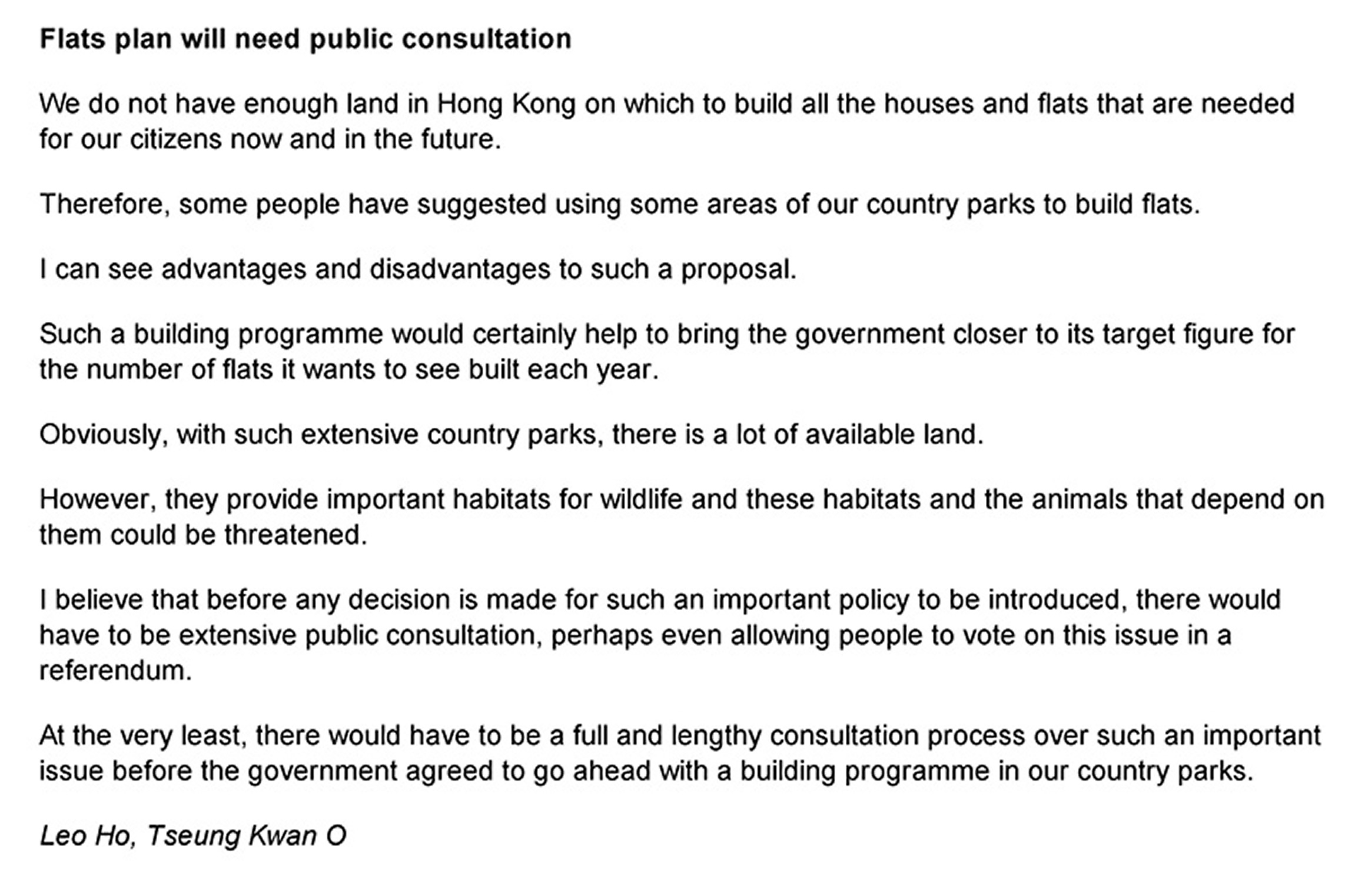





































































































































































































 =
=

















